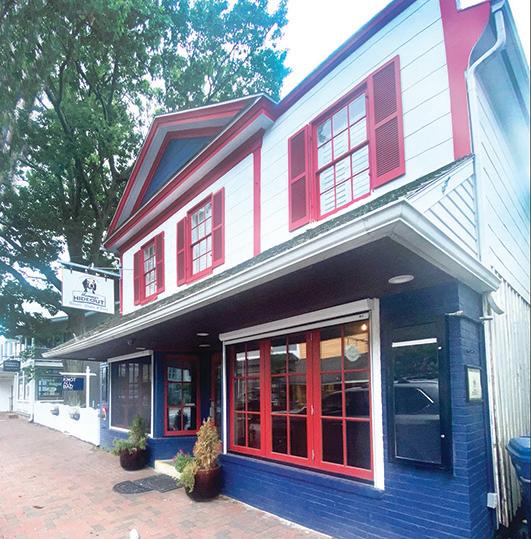Tidewater Times November 2022






















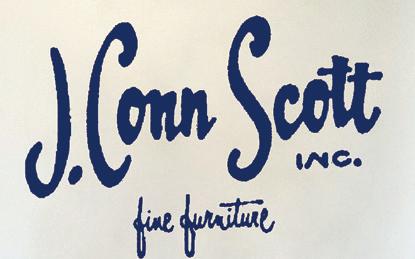

Vol. 71, No. 6 November 2022
Features:
About the Cover Photographer: Nancy O. Henry . . . . . . . . . . . . . . . . . . . . . . 7
Publishers' Note . . . . . . . . . . . . . . . . . . . . . . . . . . . . . . . . . . . . . . . . . . . . 9





Mary Ford ~ Small Worlds: Helen Chappell . . . . . . . . . . . . . . . . . . . . . . . . . 11
What Are Your Thanksgiving Traditions?: Bonna L. Nelson . . . . . . . . . . . . 29
The Drifter: J. R. Schroeder . . . . . . . . . . . . . . . . . . . . . . . . . . . . . . . . . . . 51
Tidewater Gardening: K. Marc Teffeau . . . . . . . . . . . . . . . . . . . . . . . . . . . 81
November 1 ~ National Author's Day: A.M. Foley . . . . . . . . . . . . . . . . . . . . . . 93
Tidewater Kitchen: Pamela Meredith . . . . . . . . . . . . . . . . . . . . . . . . . . . . 111
Avalon Children's Theater . . . . . . . . . . . . . . . . . . . . . . . . . . . . . . . . . 123
Rev. Susie Leight Becoming a Beacon: Michael Valliant . . . . . . . . . . . . . . . . . . 135
Phrenology and Patty Cannon: James Dawson . . . . . . . . . . . . . . . . . . . . . . 153
Changes - Coming Again - A Work Progress: Roger Vaughan . . . . . . . . . . 181 Departments: November Tide Table . . . . . . . . . . . . . . . . . . . . . . . . . . . . . . . . . . . . . . . 43
Easton Map and History . . . . . . . . . . . . . . . . . . . . . . . . . . . . . . . . 57
Dorchester Map and History . . . . . . . . . . . . . . . . . . . . . . . . . . . . . 79
St. Michaels Map and History . . . . . . . . . . . . . . . . . . . . . . . . . . . . . 95
Oxford Map and History . . . . . . . . . . . . . . . . . . . . . . . . . . . . . . . . . . . . 101
Caroline County ~ A Perspective . . . . . . . . . . . . . . . . . . . . . . . . . . . . . 131
Queen Anne's County . . . . . . . . . . . . . . . . . . . . . . . . . . . . . . . . . . . . . . . . . . . 177
Anne B. Farwell & John D. Farwell, Co-Publishers

Editor: Jodie Littleton Proofing: Kippy Requardt
Deliveries: Nancy Smith & Brandon Coleman P. O. Box 1141, Easton, Maryland 21601 410-714-9389

www.tidewatertimes.com info@tidewatertimes.com




Tidewater Times is published monthly by Bailey-Farwell, LLC. Advertising rates upon request. Subscription price is $35 per year. Individual copies are $4. Contents of this publication may not be reproduced in part or whole without prior approval of the publisher. Printed by Delmarva Printing, Inc. The publisher does not assume any liability for errors and/or omissions.








This month’s cover photographer is Nancy O. Henry, Ed Henry’s wife of 47 years.
She brought her camera along on one of Ed’s early morning field hunts to see what it was all about.
Our cover features Ed Henry, long time Talbot Co. Sheriff ’s Deputy and retired St. Michaels’s Police Chief pursuing a lifelong passion for waterfowl hunting he shares with many locals. With skill and a little luck he will successfully lure a few Canada geese
down from the sky. But, no matter…. nothing beats a day enjoying the hunt with a few close friends and a canine partner.
Nancy’s work has been recognized by placement in competitions sponsored by Plein Air Easton!, the Ward Museum of Wildfowl Art, the Maryland Department of Natural Resources and the Dorchester Center for the Arts. Her work is currently on exhibit at the Sea Captain’s Cottage in St. Michaels.



November is the time we all focus on giving thanks. We especially have so much to be thankful for this year. Not only have we been celebrating our 70th anniversary, but we gained a new daughter! Alyssa Shaffer became Mrs. Ben Farwell.
I think the thing we are most thankful for, though, is that we get
to celebrate Pop's 90th birthday on November 14. Although he's been retired from Tidewater Times for nearly 30 years, he is still an integral part of everything we do. Happy Birthday, Pop, and here's to many, many more!
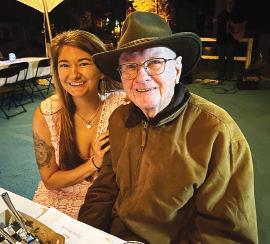 ~ Anne Farwell
~ Anne Farwell


When I’m tired or brain fogged, I like to go online and look at my artist friends’ work. Mary Ford’s paintings fascinated me because, like Jane Austen, she creates her little world “on a piece of ivory, two by two.” Whether it’s a plein air landscape of a marsh and a heron, or a close study of an insect resting among green-and-pinkstriped leaves, it always has the feeling of a scene closely observed.
Mary’s choice of colors also fascinates me. I love all the green, all
the detail of the leaves, especially the ones splashed with pink. Her color really attracts me. It’s part of her magic, her understanding of nature, as well as her background as a graphic designer, which adds a certain sense of composition and geometry.
A petite brunette, Mary smiles as we share a coffee and I admire pictures of her two adult children and toddler twin grands. Armed with a degree in fine art from Towson, she has gone from her native
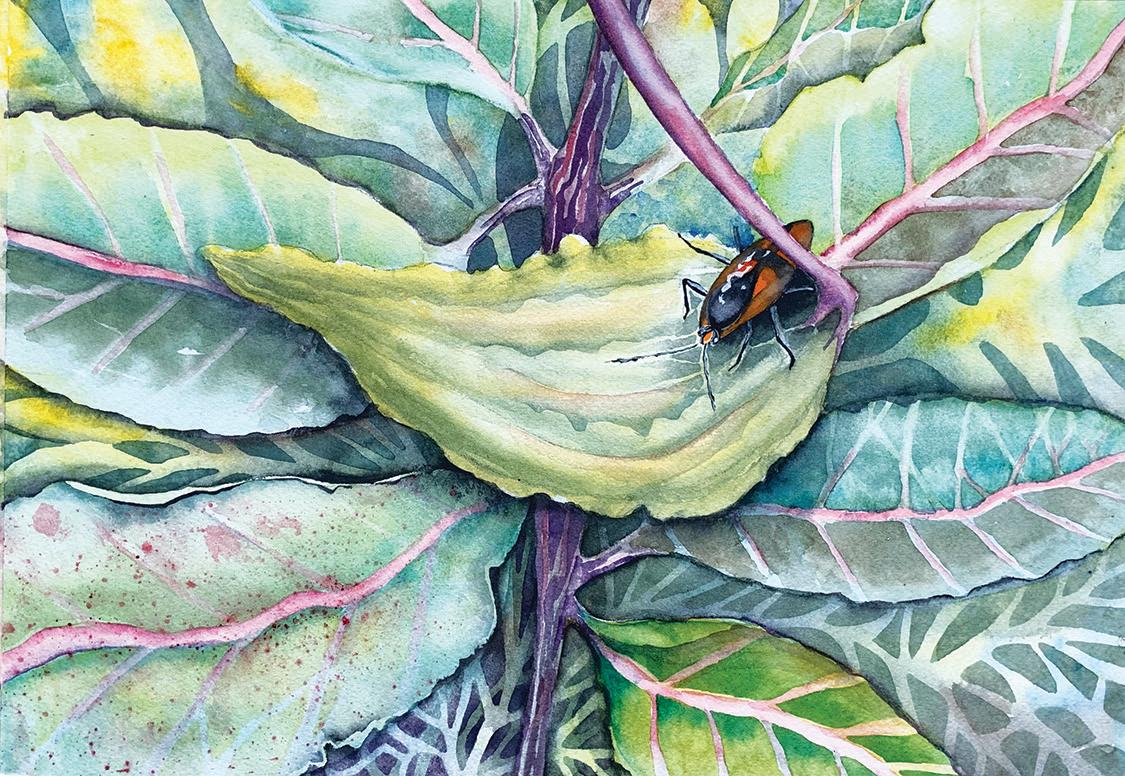
Easton, where she was an advertising designer for the Star Democrat, to California, where she designed for a number of colleges and institutions and operated her own graphic design firm. With a stopover in Dubuque, she returned to the Shore to be closer to her children and grandchildren. She has exhibited in a number of shows, including locally: Oxford Fine Arts, the Avalon, the Waterfowl Festival, the Academy and Plein Air. She is a member of the Working Artists Forum and holds a part-time job at the Oxford Community Center. Mary likes to be busy. But she has always painted. Like many artists, she enjoys talking about her art. I’ve always thought, and often found, that every visual artist has a writer concealed in their soul.
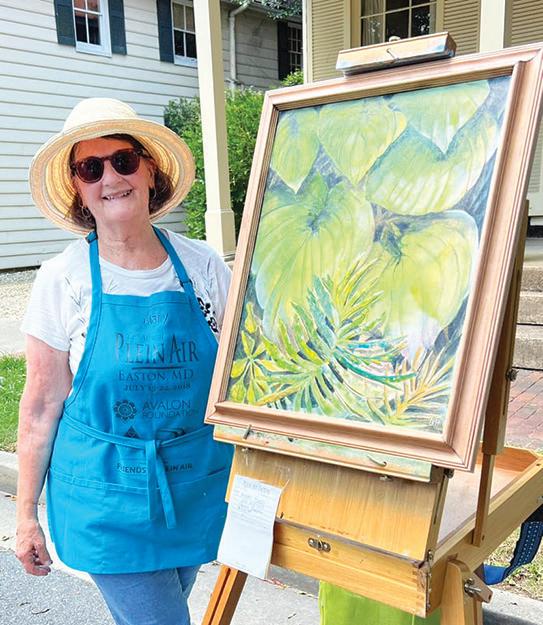

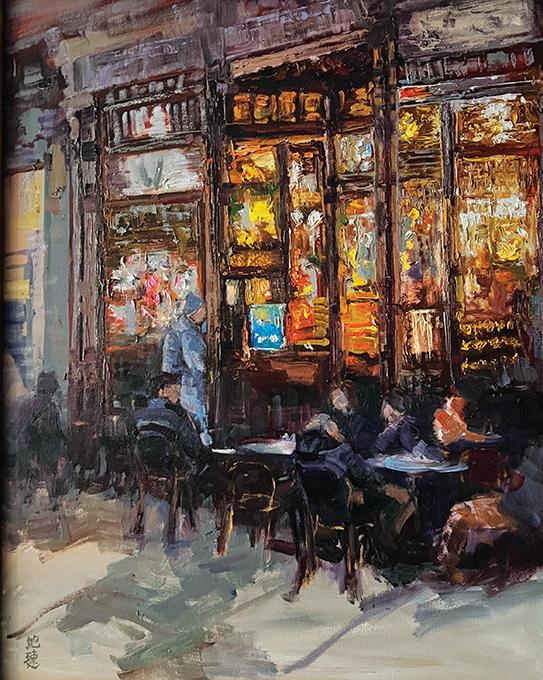










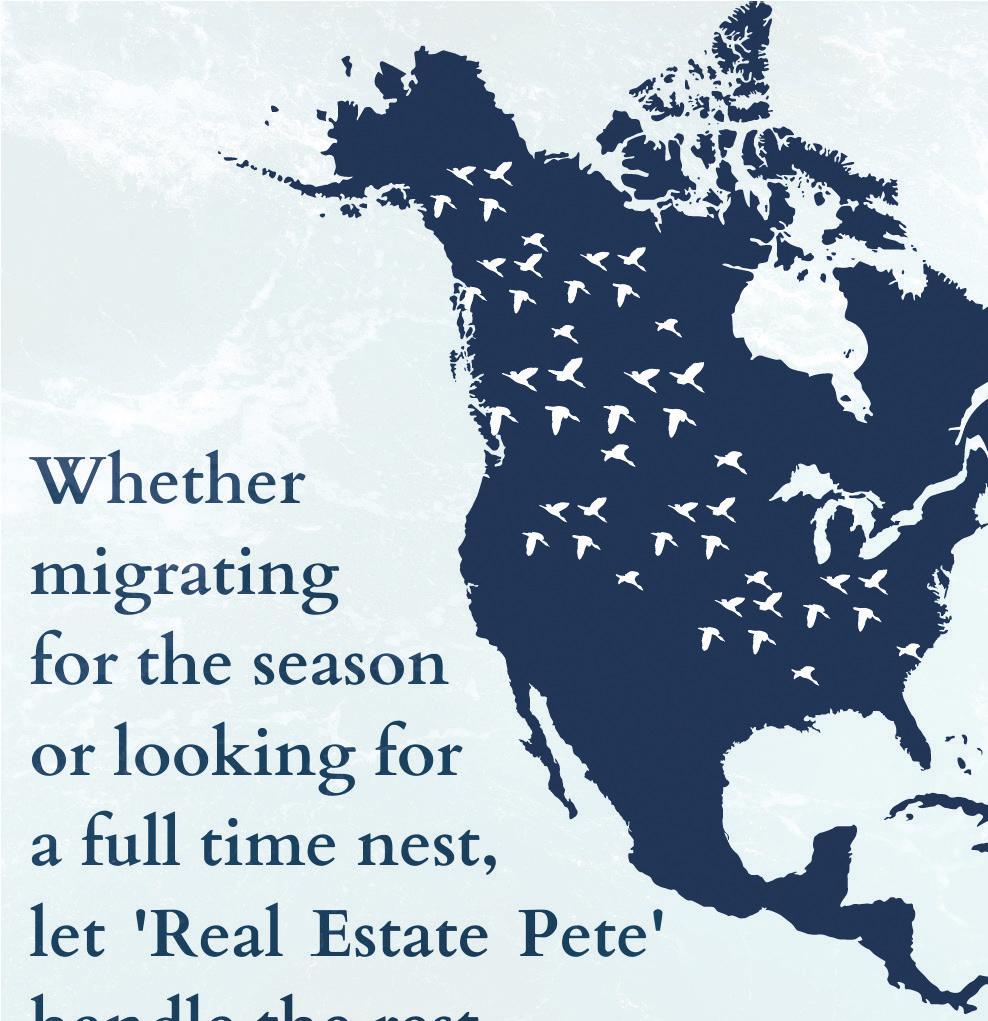



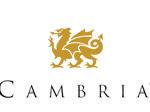










When I tell her how her greens and leaves fascinate me, she says, “My philosophy about color is personal, based on experience and the impact I’m trying to create. I don’t aways adhere to colors I see, but more what I want to be in my painting. It’s taken me a lifetime

to feel empowered to paint the picture based on what I’m feeling and want to say rather than trying to exactly duplicate what is in front of me. That license can go either way, success or disaster. I never know! But I learn something either way. I am always willing to try new approaches, mediums, tools. I paint fast, so when a painting is complete, whether it succeeded or failed is in my rear view. I’m thinking about the next one.
Next to us, a couple is debating whether to go to Blackwater or take the Harriet Tubman tour. Mary and I enjoy a comfortable silence.
“I believe,” she finally says, “There is no end game with art. You never ‘get there.’ You just keep
























ing on the green. A piece of driftwood on a rivershore.
making your marks and learning from them. Sales, shows, recognition, awards are all amazing, and I’ve had some of that, but for me, the doing is where I get the most fulfillment.”
As with many of my artist friends, I keep up with their work by her Facebook posts. Mary says she likes to roam the alleys and byways, country roads and rural areas in search of subjects. I tell her I’ve noticed lately that she’s been focusing on small worlds. A leafy bush with a beautiful insect paus-
“I look for places that are small, private, confined spaces in gardens, behind buildings, down alleys, back porches, under shrubs, tangled nests, intertwined leaves and branches, piles of rocks. I often use negative spaces in my paintings, particularly in watercolors, which gives the viewer a sense that the dark space has even darker spaces inside. A glimpse at the dark interior. Silent, watching, slightly sinister…” Her voice trails away.
All artists, I’ve found, like to discuss their tools and materials. Other artists and wannabe artists find this fascinating. I just wish I had the money to go back to painting instead of limiting myself to pen and ink. But at least I can learn something.
“I recently bought a Scout Pochade box from Jerry’s Artarama and a used tripod off Craigslist, and this combo has made my plein air adventures lighter and more convenient. For many years, I have


HISTORIC HOME in the charming community of Fairbank. Carefully preserved, updated, and expanded providing comfortable living areas from the great room to the master suite w/ sitting room and o ce. Double porches on water side, pier and boat ramp. Large outbuilding provides spacious workshop and studio apartment w/full bath and kitchenette. Main house has wood oors throughout, 4 BRs, 3 ½ BAs, LR w/ replace, great room, dining, two screened porches, private patio. 2.5 ac. $1,295,000


15.9 ACRE WATERFRONT PARCEL near St. Michaels, o ering a combination of open elds, woodland and marsh. Cove and wetlands abound with waterfowl and other wildlife. SW exposure o ers spectacular sunsets. Owner was preparing to build: new driveway, electric to building envelope. Perc approved for 4 BRs, plat on le. Room for outbuildings, pool, etc. Neavitt community is scheduled to have sewer within the next few years. Public landing is nearby. Subdivision potential. $705,000



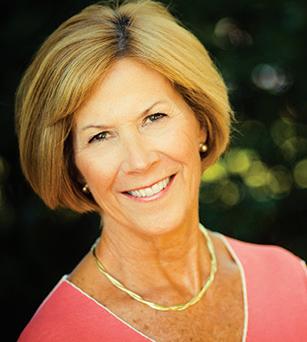

used the old plein air standby, the French easel, and it is a workhorse! But it is also heavy to lug around and cumbersome to set up/take down. I mostly paint in oil for plein air. In the studio, I use everything: watercolor, gouache and acrylic.
"The oil paint I primarily use is Cobra water soluble. With water soluble oil paint, everything thins with water and cleans up with soap ~ no turpentine to inhale or dump in the environment. As an added bonus, I find it is much kinder to my brushes. And it works beautifully for painting! Two very prominent award-winning plein air painters, Charlie Hunter and Beth

Brownlee Bathe, use Cobra paints with gorgeous results. I also use Windsor Newton Artisan brand oils and Holbein Duo, both water soluble as well. I mostly use Daniel Smith Watercolors, Holbein Gouache and Golden Acrylics. Any artist will tell you they have a certain favorite color they can only find in one particular brand. I’ve tried them all!” Mary pauses and takes a breath. Then we move on to those wonderful colors.
“I start with a ‘limited palette,’” she says. “Which is a basic red, blue and yellow, plus white and a dark, usually a burnt umber. From there, I will mix most of my colors. Toward the end of a painting, I might add a new color if the piece asks for it, being careful to dis -
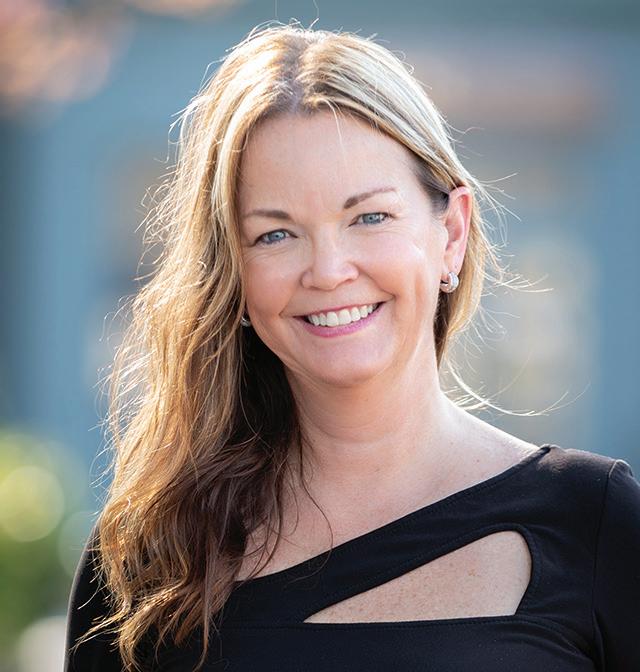


tribute it around the canvas. I also have used funky colors, metallics, neon and bright hues that are hard to mix. When I paint insects or birds, their colors are often wild and vibrant, which I love!”
This latest trend toward examination of wildlife is something I always look forward to when Mary posts her latest work. This, I think, is where a background in graphic design really works.
It’s getting time to move on, so we finish our coffee and trade numbers.
“I want to keep painting for as long as I can hold a brush,” Mary tells me. "I am hoping someday to

meet my ‘essence,’ my ‘muse,’ my ‘inner artist.’ I have questions! So far, she/he/they remain elusive, just out of reach. I suspect my quest will always be right around the corner. The carrot!"

You can view Mary’s work at maryhford.com .
Helen Chappell is the creator of the Sam and Hollis mystery series and the Oysterback stories, as well as The Chesapeake Book of the Dead . Under her pen names, Rebecca Baldwin and Caroline Brooks, she has published a number of historical novels.



This first-time offering is a unique Eastern Shore estate that is the perfect marriage of serenity and style. No expense or detail was spared in building this custom family compound encompassing stunning indoor and outdoor spaces. The tree-lined circular driveway leads you to a gracious, brick manor home designed with large-scale entertaining in mind, starting with the two-story, double staircase foyer. The custom gourmet kitchen will satisfy any chef and provide a welcoming gathering spot for friends and family. Topof-the-line appliances include Viking, Subzero, and Wolf, as well as an induction cooktop and icemaker. The butler’s pantry is perfect for staging and storing everything you need to put on the perfect holiday gathering. For casual entertaining, The Grill Room offers a Viking beverage cooler, an infrared grill, and a Subzero icemaker. The spacious primary suite has a fireplace flanked by two doors accessing the outdoor balcony. The lavishly




BENSON & MANGOLD REAL ESTATE
Chuck Mangold Jr. - Associate Broker C 410.924.8832 O 410.822.6665 chuck@chuckmangold.com · www.chuckmangold.com 31 Goldsborough Street, Easton, Maryland 21601 PRESTON | $3,995,000 | www.4218HarmonyRoad.com



Chuck Mangold Jr. - Associate Broker C 410.924.8832 O 410.822.6665 chuck@chuckmangold.com · www.chuckmangold.com 31 Goldsborough Street, Easton, Maryland 21601

appointed primary bath features double vanities, a tiled shower, and a large soaking tub. The additional bedrooms within the main house are also en suite. Meticulous trim work, four fireplaces, and other special touches highlight the attention to detail throughout the home. The nine-bay climate-controlled primary garage is ideally suited to showcase and preserve your museum-caliber automotive collection with CHI aluminum tinted glass and polished concrete flooring. This custom-built structure also features three-bedroom, two-bath guest quarters with a kitchen, living, and family room. Two separate, fully insulated, and climate-controlled garages (50 x 75) provide additional storage space with 12-foot overhead doors. These spaces could have many alternate uses, including firstclass horse stables.

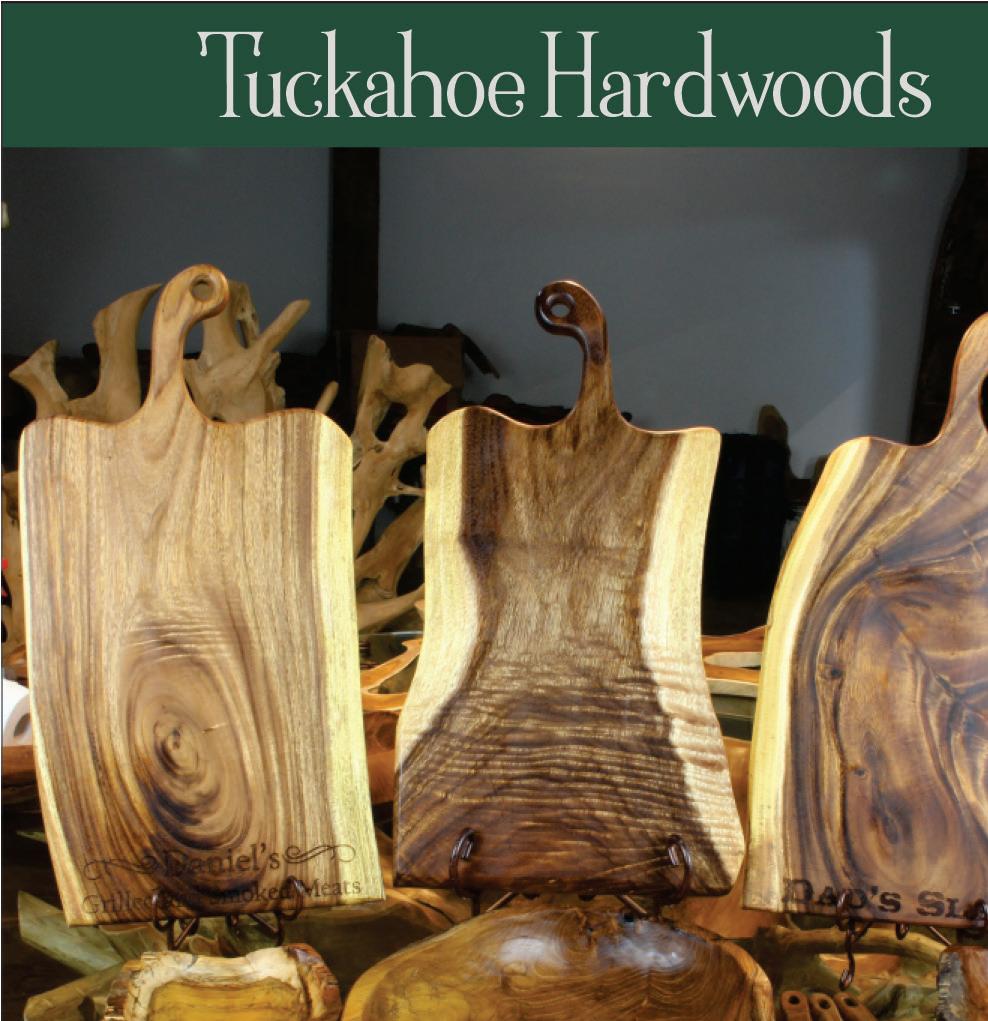

Let our hearts be full of both, thanks and giving! Happy Thanksgiving!
It all started with a discussion about sauerkraut. My friend Genny and I were discussing with excitement our plans for Thanksgiving. Who was coming to dinner? What were we serving?

The traditions and nostalgia help make Thanksgiving one of my favorite holidays. By early November, I begin to have thoughts about past
Thanksgivings, family and friends reunited, family and friends no longer with us. The aromas and tastes of our family’s favorite dishes begin to fill my mind.
As hosts for our family’s Thanksgiving dinner, we start sending email, text and phone reminders on November 1. Then, I start planning the menu and the shopping list. I






have help. I keep a copy of the menu from year to year and just make minor modifications.


As do many families, ours has certain expectations for the dinner traditions of Thanksgivings past and are seldom thrilled about any changes. This is where the sauer -


kraut comes in. Genny, from the Philadelphia area and with parents from the United Kingdom, had never heard of serving sauerkraut for Thanksgiving dinner. With our German roots, my family couldn’t imagine Thanksgiving without it!

According to Molly Wizenberg at bonappetit.com , “Growing up, I had no idea that sauerkraut is not, to most Americans, a traditional Thanksgiving dish…In 1863, when Abraham Lincoln declared Thanksgiving a national holiday, about a quarter of Baltimore’s population was German. Sauerkraut was a given on their celebratory table, and so it became a common part of Thanksgiving meals across the city.”
She goes on to say that when, as
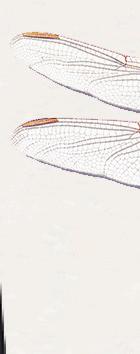

in love with!
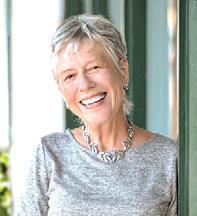













more City folks of primarily German immigrant heritage, it comes as no surprise to me that sauerkraut was always on their Thanksgiving menu. My parents carried on the tradition, as do some of my siblings.
an adult, she served sauerkraut on the fourth Thursday of November, some of her guests were puzzled. Her research revealed that the Baltimore tradition began with its German immigrant families. The German tradition became a “Baltimore thing” that her husband’s Irish Chesapeake Bay-area family also adopted. With both my maternal and paternal grandparents being Balti -
I have learned that sauerkraut, which means sour cabbage in German, is made by fermenting finely cut raw cabbage. It is one of the most popular German dishes. But fermented cabbage didn’t originate in Germany. It is mentioned in Roman writings, was used during the building of the Great Wall of China, is popular across Europe, has been a traditional dish since ancient times in Russia and now is even found in American ballparks and other dining spots as a topping for hot dogs.
There are many ways to prepare sauerkraut. My family’s recipes vary, too. I developed mine over the
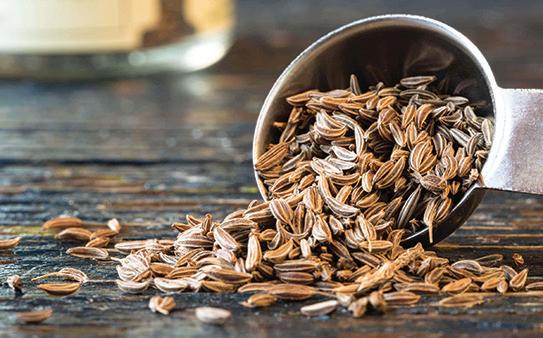
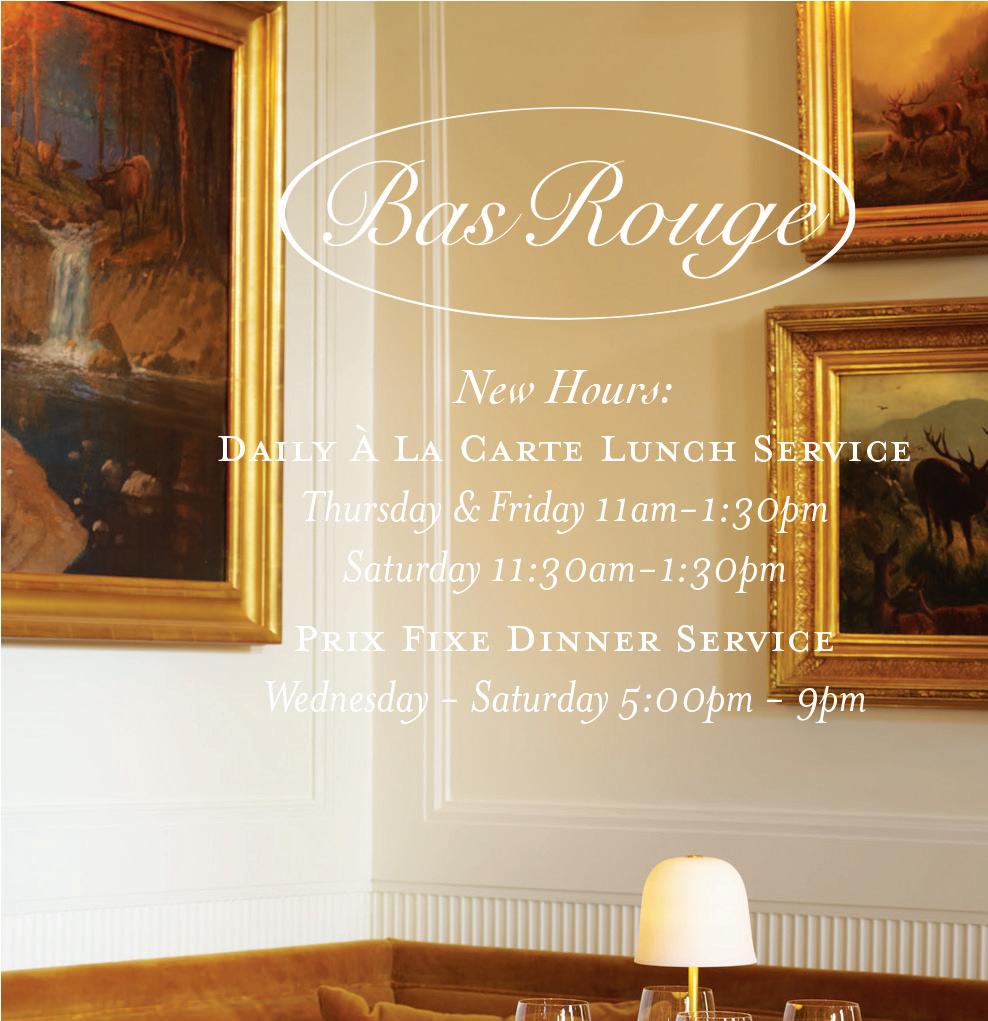

years based on my desire for both a sweet and tangy kraut.
I use jarred sauerkraut poured over a browned ham slice, cut in quarters and all placed in an oiled crock pot. Next, I add brown sugar, cinnamon, chopped apples, chopped onion and caraway seeds. The real secret is to simmer the mixture for a day or two so that the cabbage softens and the flavors blend. For the sake of my husband, John, I put the crockpot in the garage. He is not a fan of the pungent smell, but I crave it! (Molly Wizenberg’s family cooks their sauerkraut in gin and adds butter before serving.)
Nestled in a little pile between the turkey, mashed potatoes, gravy and cranberry sauce, sauerkraut provides a wonderful flavor that blends well with our traditional meal. We round out our menu with green bean casserole, sweet potatoes and a variety of pies and ice cream for dessert.

Genny suggested that I ask a few friends about their “Turkey Day” traditions and share them with readers. I started with Genny. She was surprised by my sauerkraut dish, and I was surprised by her mention of creamed baby onions, a traditional dish from her family, and cornbread stuffing with cranberries.
Her husband, Tom, shared his family’s unique tradition. Tom makes a sweet cranberry jelly in an antique ceramic mold shaped

like a rabbit (he doesn’t know why a rabbit-shaped mold is used for Thanksgiving) and passed down in his family at least as far back as his grandparents. The cranberry jelly recipe is from the back of a bag of store-bought cranberries, and the pectin in the berries’ skin causes the jelling that holds the rabbit shape.
Genny also offered her family’s favorite dessert, which was new to me: “Pie-in-the-Sky,” pie crust filled with cheesecake and topped with pumpkin pie filling. The rest of their menu calls for the basics we all know and love ~ turkey, stuffing, mashed and sweet potatoes, gravy, etc.
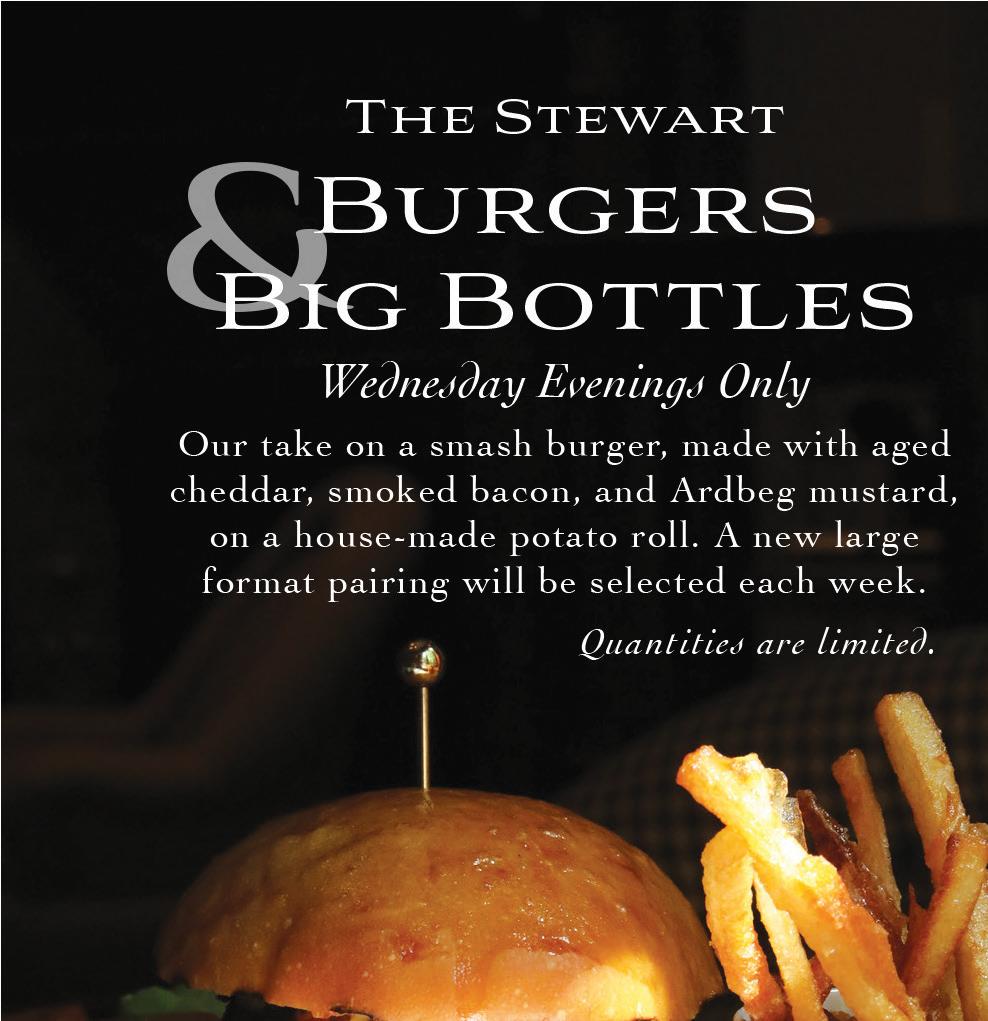

Fran and her husband, Dick, friends from Bethesda, MD, brine and smoke their turkey with aromatic and tasty results, which I love. It has a tangy yet sweet flavor that reminds me of my sauerkraut. Fran makes a crunchy yet soft sweet corn casserole that her family and mine also enjoy.
My friend Rita, of Irish heritage, said that her father boiled pearl onions in milk, and that was the only new-to-me dish that she serves at her family’s dinner. Robbie, of British and Scottish lineage, includes creamed onions, steamed turnips and fresh fruit for dessert. I might add the creamed onions to my
feast this year since several friends mentioned it, but I’m not a fan of turnips. Might Genny, Tom, Rita and Robbie try sauerkraut?
How about you? How do you celebrate Thanksgiving?

In addition to food traditions, like many families, we donate to food drives before the holiday. We prepare several dishes a few days

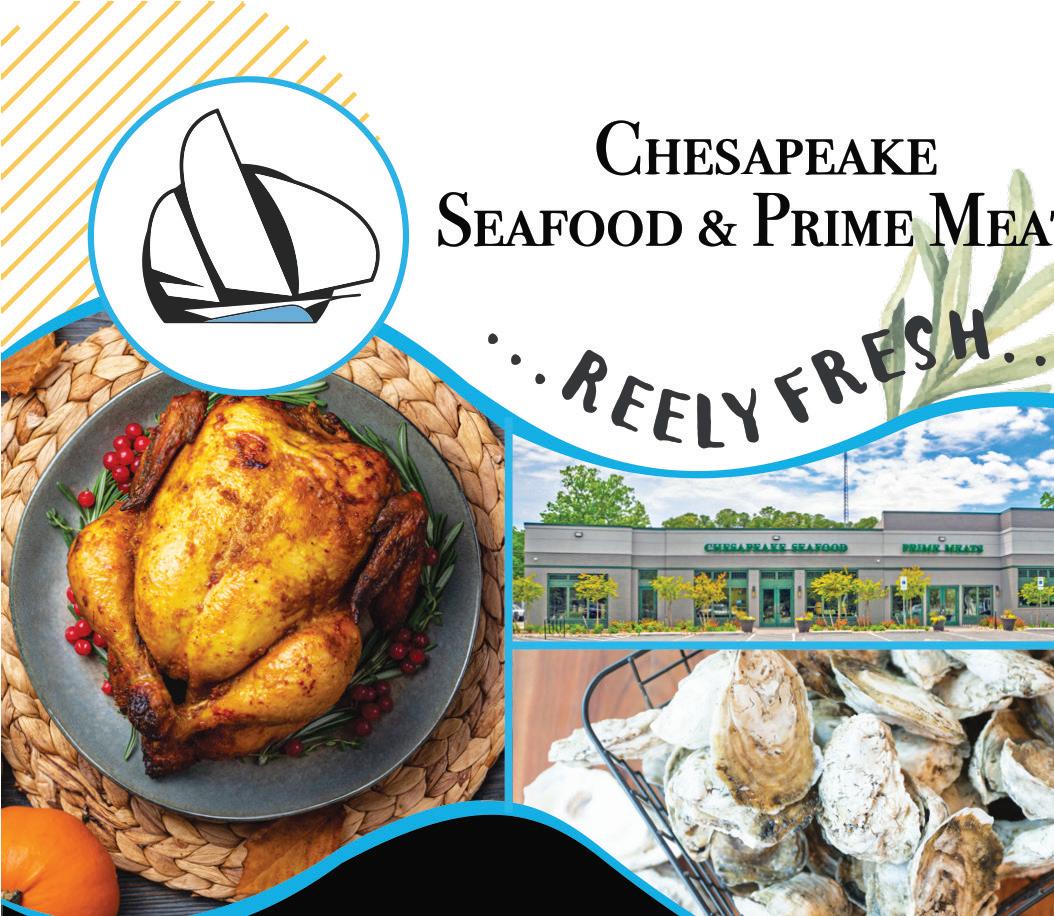
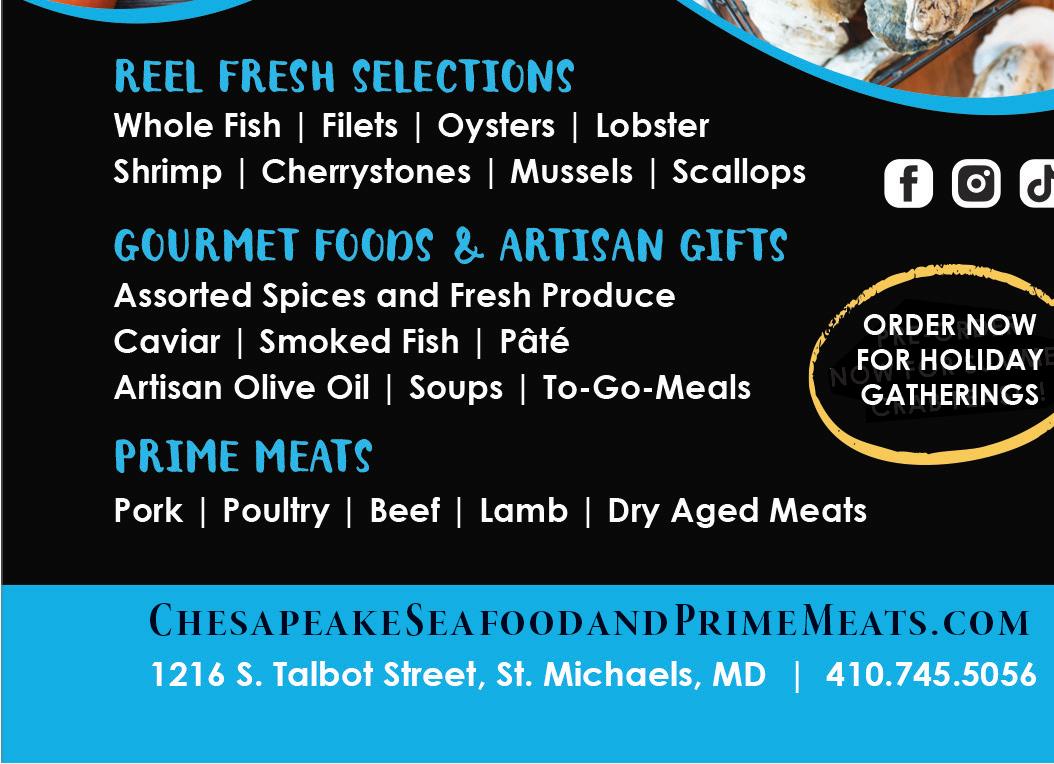



1. Tues. 2. Wed. 3. Thurs. 4. Fri. 5. Sat. 6. Sun. 7. Mon. 8. Tues. 9. Wed. 10. Thurs. 11. Fri. 12. Sat. 13. Sun. 14. Mon. 15. Tues. 16. Wed. 17. Thurs. 18. Fri. 19. Sat. 20. Sun. 21. Mon. 22. Tues. 23. Wed. 24. Thurs. 25. Fri. 26. Sat. 27. Sun. 28. Mon. 29. Tues. 30. Wed.
10:02 11:1112:53 1:44 1:30 2:13 2:53 3:33 4:14 4:56 5:40 6:27 7:17 8:12 9:10 10:10 11:08 12:02pm12:41 1:27 2:13 3:02 3:53 4:46 5:42 6:41 7:44 8:51
SHARP’S IS. LIGHT: 46 minutes before Oxford
TILGHMAN: Dogwood Harbor same as Oxford
EASTON POINT: 5 minutes after Oxford
CAMBRIDGE: 10 minutes after Oxford
CLAIBORNE: 25 minutes after Oxford
WYE LANDING: 1 hr. after Oxford
4:16 5:39 6:57 8:06 9:10 9:09 10:05 10:58 11:4910:49am 11:28am 12:13 1:04 2:03 3:07 4:16 5:25 6:33 7:37 8:39 9:38 10:35 11:3110:45am 11:43am 12:48 2:01 3:20 Campbell’s Yacht Sales Sail & Power

ST. MICHAELS MILES R.: 47 min. after Oxford
ANNAPOLIS: 1 hr., 29 min. after Oxford
KENT NARROWS: 1 hr., 29 min. after Oxford

CENTREVILLE LANDING: 2 hrs. after Oxford
CHESTERTOWN: 3 hrs., 44 min. after Oxford
OXFORD, MD NOVEMBER 2022 3 month tides at www.tidewatertimes.com
5:31 6:24 7:13 7:57 8:37 8:13 8:46 9:16 9:45 10:15 12:38 1:24 2:09 2:54 3:37 4:20 5:01 5:39 6:14 6:47 7:20 7:54 8:30 9:10 9:55 12:25 1:18 2:12 3:05 3:57 HIGH LOW Buy the boat of your dreams from Campbell’s. Ready to Sell? P.J. Campbell is an experienced yacht broker who will get results. call P.J. Campbell · 410-829-5458 boats@campbellsyachtsales.com www.campbellsyachtsales.com
2003 Mariner Orient 34 Sedan Trawler$159,000 Turn key. Must see to appreciate!






ahead, including sauerkraut, of course, and John’s favorite stuffing. On the morning of, we watch the Macy’s Thanksgiving Day Parade and the National Dog Show on television while preparing the feast. We give thanks and count our blessings when we sit down for dinner, talk about the year gone by, catch up on news, relax and reminisce.
Other families volunteer to serve meals for those in need, watch football, take walks, play games, etc. Homes are delightfully decorated with fall colors, pumpkins, door wreaths, scarecrows, straw bales and chrysanthemums, and candles and fi replaces are lit.
The origins of Thanksgiving can be traced back to ancient pagan rites around the world. People gave

thanks in ceremonies and festivals for the bounties of the autumn harvest and blessings of the year past. Various historical, cultural and religious traditions were celebrated over the centuries with gatherings and feasting.
Thanksgiving Traditions included holding religious services to give thanks. In the United Kingdom, Thanksgiving is the Harvest Festival celebrated in late September or early October, which evolved from the pagan Saxons celebrating the harvest with food and festivities. Today, British Christian churches observe the festival traditions.
Thanksgiving in America was celebrated before the traditionally told story of the feast held by the English pilgrims and the Native Americans at Plymouth, MA, in 1621. It was celebrated in the first English settlements in Virginia in 1619, and decades before that by Spanish settlers in the colonies who hosted yearly feasts for the Indigenous population.
American Thanksgiving customs evolved from English customs that
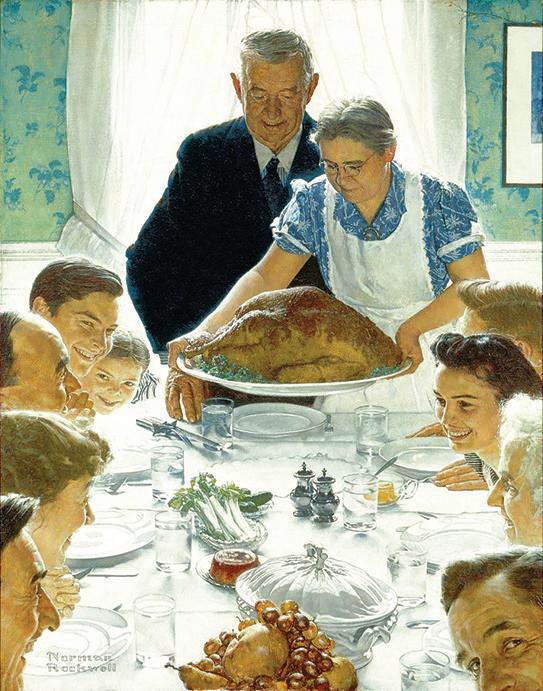
Other countries around the world celebrate Thanksgiving, too. Our neighbor to the north, Canada, celebrates much like we do, only on the second Monday of October. Their feast includes many of the same dishes ~ turkey, mashed potatoes, gravy and pumpkin pie ~ and they spend time with family and watch football.
Brazil’s Thanksgiving holiday is patterned after ours. A Brazilian ambassador introduced it in the 1940s after commemorating the holiday in St. Patrick’s Cathedral in New York City. Brazil’s rituals begin in the church and spill onto the streets as a carnival. They blend a traditional religious celebration with the annual harvest and giving thanks.
In European countries, including Germany, Austria and Switzerland, the fall harvest celebration occurs in early October and is religious in nature. The more public celebration includes church services, music, dancing, processions, fireworks and food. I have to assume that their feasts would feature one of my favorites, sauerkraut. They decorate churches with autumn crops, which I now real-

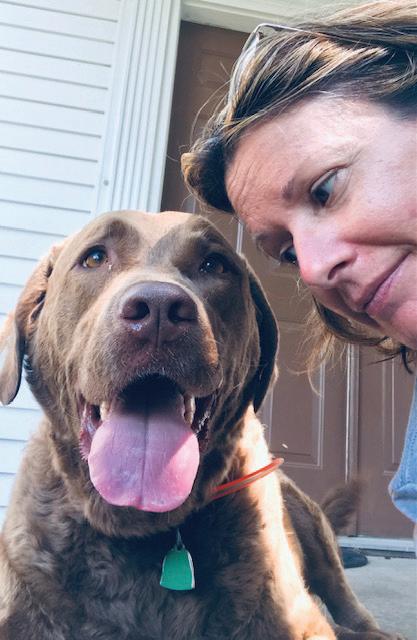
giving celebration with them.
At least 17 countries celebrate some version of Thanksgiving, with varying traditions and commemoration purposes but with the same sentiments of thanks, appreciation and reflection.

ize is why we also decorate with hay bales, pumpkins, corn stalks, flowers and garlands of leaves.
Oddly, Grenada, the most recent country to add the celebration to its calendar, gives thanks on October 25 to commemorate an American-led liberation in 1983. The Grenadians give thanks for the Americans’ coming to restore order in their country after an army coup and the execution of their prime minister.
Japan celebrates an ancient Shinto rice harvest ceremony annually on November 23. Called “Labor Thanksgiving Day,” the holiday commemorates labor and community issues such as human rights and the environment.
Liberia celebrates the American Thanksgiving, declared a national holiday in the 1880s. Freed slaves who returned to Africa in the 1820s from America brought the Thanks-
Are you ready to celebrate your Thanksgiving traditions this year and maybe make a few new ones? Will you try a new side dish, dessert or recipe? Might you try creamed pearl onions or sauerkraut? Gather your family and friends. Share your bountiful table with others. Volunteer to serve a meal or donate to a food drive. Attend or watch religious services, parades and football games.
Let us all unite in giving thanks and forgiving others and ourselves. Write down what you are thankful for. Remember that the true meaning of Thanksgiving is to celebrate gratitude. Enjoy your past holiday traditions and create new ones. Happy Thanksgiving!
Bonna L. Nelson is a Bay-area writer, columnist, photographer and world traveler. She resides in Easton with her husband, John.



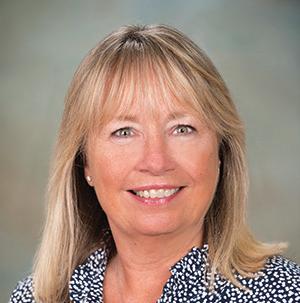









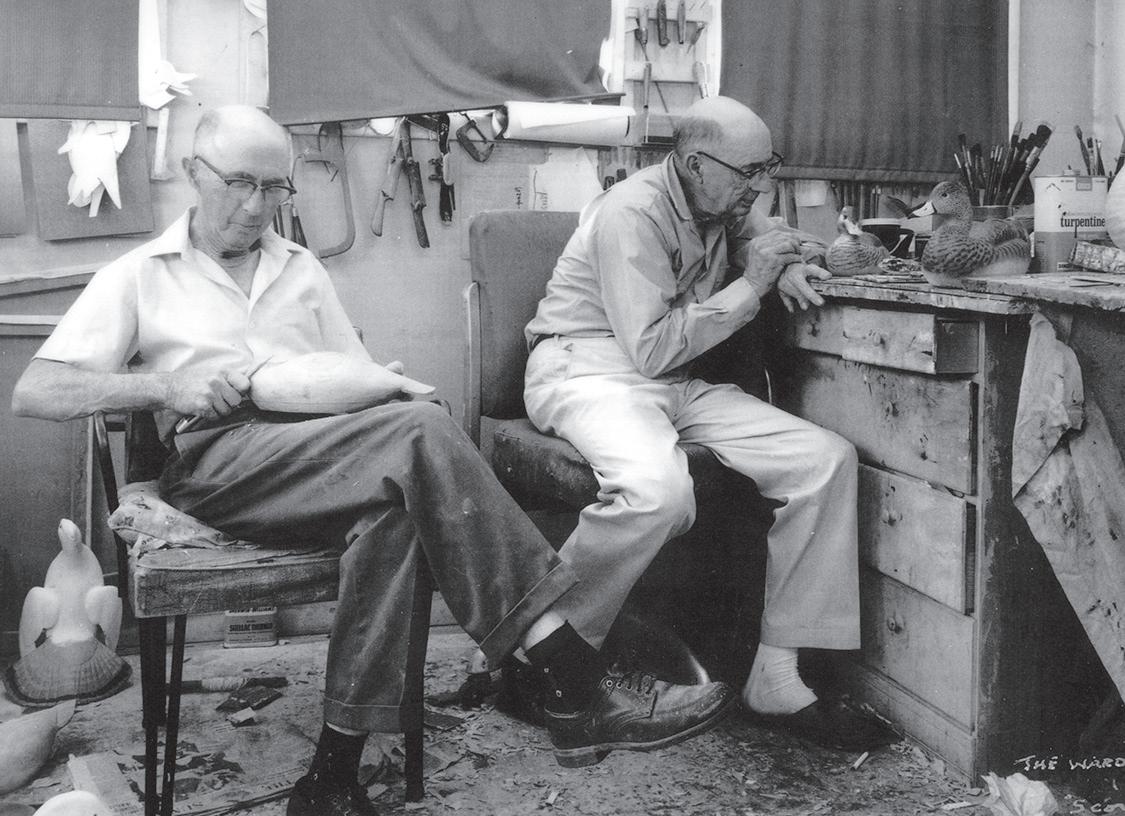
It was a damp, overcast morning ~ of course, it was early yet, but still it was the kind of morning when the cold kind of goes right to the bone. Not infrequent in the early fall around these parts. The ol’ timers claim it’s from bein’ s’ close to the sea and s’ low to the water. No mountains, and that lets the wind come atcha and bite lika marsh skeeter.
Even though it was early when Steve stepped down from the back
door, he knew what it was going to be like ’cause this wasn’t his first time out this mornin’. He’d already been to his outhouse and knew it was damn chilly. Cold or not, though, he preferred it out where you could smell the fresh air and see what the weather was goin’ to do. A lotta folks didn’t understand that about him, and why he’d go to all that trouble to keep that ol’ outhouse in shape behind the shop when they’d had a




perfectly good bathroom in that new addition for a couple of years now.
It wasn’t just bein’ out in the weather that he liked. Steve liked the privacy of it. The privy got him out of the house and away from people and gave him a chance to think. Not that he didn’t enjoy his family, or rather his brother Lem’s family, since Steve didn’t have one of his own, at least, that is, since his father, Travis, and his mother died. Lem’s daughter, Ida, kept the house goin’ now, and Steve surely enjoyed those talks with her of a mornin’ ’round the ol’ kitchen table. That extra cup of coffee was a special one, just before goin’ out to work, when
Ida found some extra moments to sit down and have one with him.
He loved to tell her stories of the old days when he and Lem were boys, or stories of their father, Travis, and the boats he used to build in the back yard when he wasn’t cuttin’ hair or going out to find dinner in the marsh; or maybe Steve would tell of what France was like during the short time he was there in 1919. It really didn’t matter what they talked about. He just enjoyed bein’ there and knew, from the look on Ida’s face, that she was enjoying it, too. There was a closeness and a warmth, and that was an important thing. This mornin’, though, Steve hadn’t sat there as long as usual
EASTON CLUB EAST - Del Webb

55+ community. 2,342 sq. ft. Wittman model with 2-car garage, sun room, large kitchen, Two 1st floor bedrooms. Clubhouse, tennis, pool, walking paths. $399,000.

EASTON: GLEBE CREEK - 3 bedroom, 2 bath rancher with hardwood floors. There is expansive waterside deck looking to farmland beyond. Minutes from town, and quick access to Rt. 50. $669,000.

TWENTY ACRE
with 2,000 feet Choptank River shoreline. 10 ft. MLW at dock. High, sandy ground. Pool. Brick residence, guest house. Hunting, fishing and boating. Please view online aerial drone tour. $2,695,000.


WATERFRONT FIXER-UPPER near St. Michaels. Broad sunset views of Harris Creek. Tree-lined driveway. Seclusion and privacy. The dock and bulkheading have recently been replaced. Please view online aerial drone tour. $1,295,000.





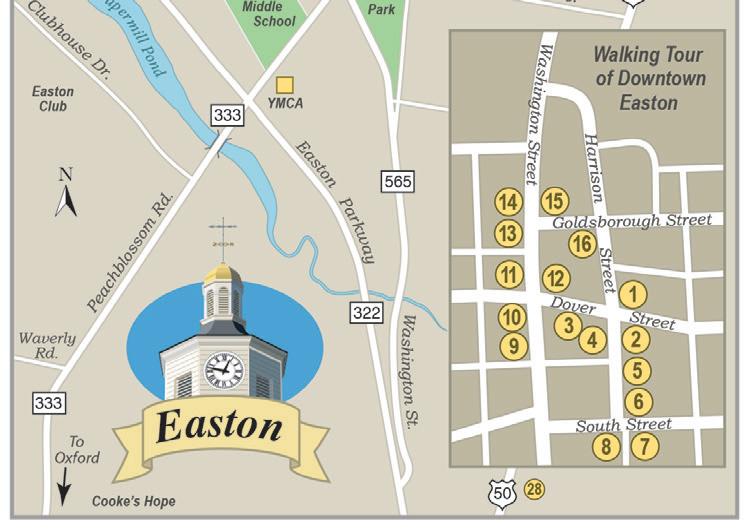
The County Seat of Talbot County. Established around early religious settlements and a court of law, Historic Downtown Easton is today a centerpiece of fine specialty shops, business and cultural activities, unique restaurants, and architectural fascination. Treelined streets are graced with various period structures and remarkable homes, carefully preserved or restored. Because of its historical significance, historic Easton has earned distinction as the “Colonial Capitol of the Eastern Shore” and was honored as number eight in the book “The 100 Best Small Towns in America.” With a population of over 16,500, Easton offers the best of many worlds including access to large metropolitan areas like Baltimore, Annapolis, Washington, and Wilmington. For a walking tour and more history visit https:// tidewatertimes.com/travel-tourism/easton-maryland/.
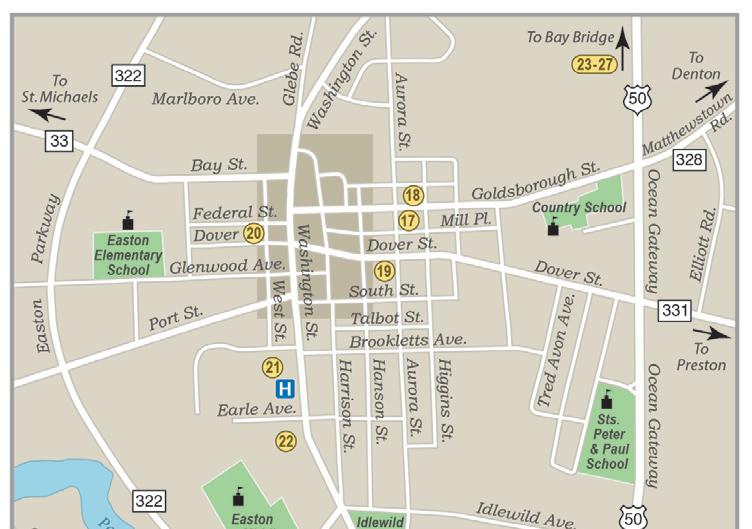
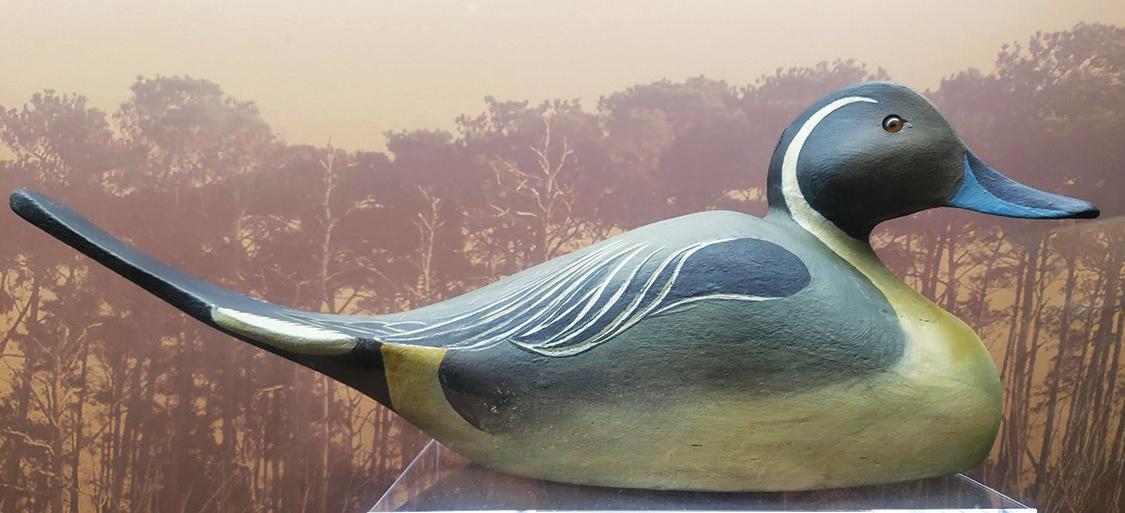
’cause he knew he had a full day ahead of ’im. Today he had a lot of cuttin’ out to do on that big ol’ bandsaw, and just the size of it and the noise of it were enough to wear a man out. That wasn’t the thing that annoyed him the most about the bandsaw, though. The thing that annoyed him the most was his havin’ to give his total attention. Yes, sir, if ya let yer mind wander, that ol’ saw would bite your finger off as quick as a disturbed snappin’ turtle in breedin’ time. It didn’t give a man time to think nor nothin’. That was the worst part, no time to think. He’d just have to put off workin’ on that poem ’til later. He didn’t know why those lines had come to him all of a sudden, ’cept he’d been thinkin’ about that old ’coy a lot since he’d found it and he guessed puttin’ words to it was just natural. The head was gone and it had been buried for a long time, sure, but he
knew it was one of his, and lookin’ at it really did make you think.
I’m just an old has-been decoy No ribbons I have won My sides and head are full of shot From many a blazin’ gun
Oh, well, the rest would come.
As Steve headed across the yard to the shop, he turned off to the row of windows that the ol’ bandsaw faced and removed two o’ them and set them on the ground leaning against the building. Even tho’ it was cold, he knew he was goin’ to need the extra space when he got those long poles in there. He hoped Leo or somebody would happen along when he got to manhandlin’ them.
It was when he was settin’ the first window on the ground that he heard Lem for the first time. It was just a cough, but it made him hurry his step a little. It reminded him that Lem was pretty much caught up with him. Lem must’ve heard him taking


out the windows, and the cough did exactly what it was supposed to do. Lem wasn’t much for just sittin’ around. Talking was all right as long as you worked while you were doin’ it. That’s what Lem always said.
Steve knew, as usual, that Lem had been in the shop working, almost ’fore the sun was up. Steve also knew Lem looked forward to the two of them ridin’ their bikes over town to the Cozy Corner in mid mornin’ for a cup of coffee and maybe a bromo, but Lem liked to get a good day’s work in before then.
As he walked in the door, Steve noticed the patterns lying on his choppin’ block next to the head of





his drive-in hatchet. Another gentle reminder. He could hear Lem more now in the next room, stubbing out a cigarette or cleaning a brush in the can of coal oil. Before quittin’ yesterday, they’d talked about what birds Steve would cut out today and Steve knew that the first thing Lem had done this morning, after lighting the fire, was to go through all the patterns scattered around and hanging on the walls, and pick out a full day’s work.
He heard Lem grunt, ‘Mornin’, and Steve answered ‘Mornin,’ in the same tone as he touched a wooden match to the wad of paper, threw in some chips and got his own stove goin’. They had both worked here in the old ‘barber shop’ when they first




No one place where I could abide.
‘I want to change some of those,’ he heard Lem say. Although Steve only caught the last couple words as they broke through his reverie, he knew what they meant. Lem was talking about the patterns Steve held in his hand. He thought, as he checked the fire and walked around the old Victrola into the other room, that the words didn’t surprise him; Lem was always changing things. It seemed every year they’d have to draw new patterns ’cause Lem wasn’t content with the shape of the old ones....
moved it back from the road, until Lem decided he needed more room and had Norris Pratt add on his own paintin’ room.
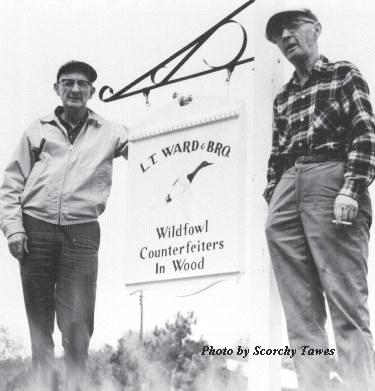
While Steve was waiting for the fire to settle down, he thought of his poem again and absentmindedly picked up the patterns Lem had left and started to sort through them. He couldn’t help wonderin’ about the old ’coy and wished he knew who they’d sold it to. From the style and age of it, the raised back, and the way the undertail was cut, typical of Lem’s patterns, it was an old one, maybe the ’20s or earlier then that. Without the head, it was hard to tell. Never would know exactly, I guess....
......blazing gun.
My home has been by the river, Just drifting with the tide. No roof have I had for a shelter,
Steve thought: One day he’d have to take the time and gather up all those old patterns and do something with them. But then, as he walked into the adjoining bright, warm room and saw Lem furiously sketching on the back of an old advertising poster, bathed in the smell of oil paint and cigarette smoke, his enthusiasm drove the thought from his mind.
Neither of them spoke. They seldom said much when Lem was in the mood he was in. Steve walked closer to the workbench and could see Lem already had three or four sketches scattered around him. The paints and brushes, ashtray and clam shells had all been pushed aside to make way for new ideas. The ashtray had a long white cigarette smouldering in it, and the paint in the clam shells was already skimming over a little.
Lem had a nubbin of pencil in his






hand, the point well worn so that the line was broad and dark. Even so, Lem would bring the point to his mouth now and then and give it a lick. Steve could see he was intent; for one thing, the smouldering cigarette was now almost half untouched ash. Lem had a sure hand. At least when it came to water birds. The sketches he had already made were pretty much single lined and had not been gone over once put down, except in a few places. Steve wasn’t surprised to see, from the shape of the bodies, that Lem was working on scaup or redheads ~ at this stage, you really couldn’t tell which. The shape of the heads would tell, or else you
had to wait ’til Lem started painting. Steve remembered the ol’ days, before they got into the more fancy birds, when they were still turnin’ out plain, simple shootin’ stools by the dozen. Steve did most of the pattern work. Back then, most of the pattern work was just replacing worn-out ones. It got to a point where he hardly needed a pattern at all. The rough block of wood only had to be somewhere near the right size and he would bring it into the shape of any bird he wanted with his hatchet. They were the good days, Steve thought; they were seldom bothered then by all the visitors. It was just Lem and himself. They seemed closer then. Lem was somehow more content. They would sit all day, each


in his own room, each with a pile of birds to work on, and holler stories back and forth or sing ‘barbershop’ or sometimes just listen to Steve’s barbershop records on the Victrola. On the simple birds, Lem could paint ’em as fast as Steve could carve ’em. Lem would have a dozen birds goin’ at a time. He’d paint one color all the way through and, with his special mixture of turps and coal oil, which not only kept the paint flat but would make it dry faster, by the time he got to the end of the dozen, he could start over with another color. By the time he had three or four base colors on all of them, the first color would be dry
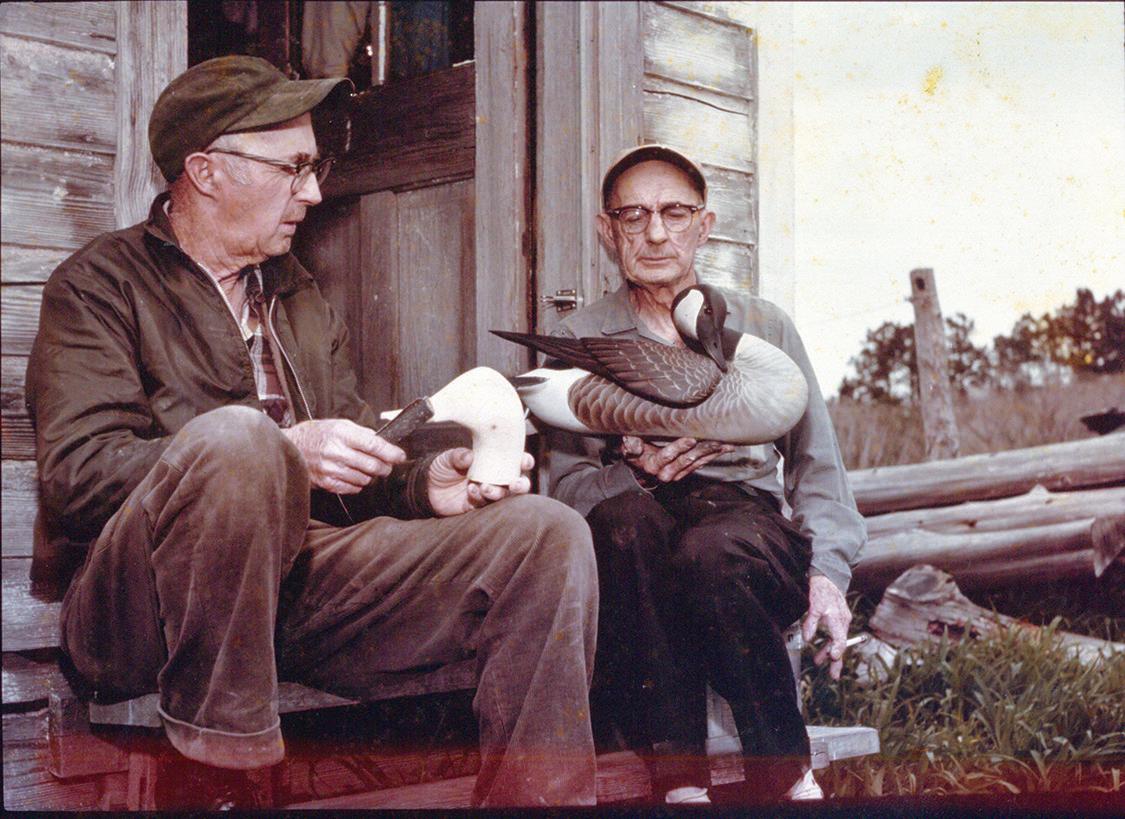
enough to blend or stipple or line on the feathers. That last was the part that made Lem’s birds special.
Steve figured he must’ve been a little faster than Lem, though, ’cause he managed to keep ahead of him. Lem didn’t have many interests outside of working. He loved to hunt and fish in season, but mostly, he worked. Steve liked to take time to work his garden, or read about the Civil War, or just read. Lem never read nothin’ except the Bible. Steve liked his share of huntin’, but to him it was mainly just another chance to get out by himself and think about life and his poetry. Some days he would just take whole afternoons and walk the beaches of Watts’ Island looking for arrowheads
and composin’ poems. It was on one of these trips that he found the old ’coy, and that started him thinkin’ about how it got where it was...
I’ve rocked to winter’s wild fury, I’ve scorched in the heat of the sun, I’ve drifted and drifted and drifted, For tides never cease to run.
“DAST,” Lem said and rubbed furiously with his eraser. Steve could see he was working in the area of where the head fastened on, and he knew Lem always had trouble with that. He was never happy with the breast of a bird; it was never full enough for him. Steve sat down, pulled the visor of his wool cap down a little to shield his eyes from the
bright light that Lem needed, and waited. Lem wouldn’t have much to say ’til he figured that problem out. Steve thought about all the birds he and Lem had made together and how things had changed; he wasn’t pushed as hard anymore keepin’ Lem busy. Not since Lem had been to that ’48 show on Long Island and Ward birds had won all the blue ribbons. Since then, Lem had gone “fancy.” He was working on birds that Steve didn’t have any part in now. Birds that weren’t made to float on the water, but ones you just sat on your mantelpiece and looked at. Steve had to admit they were pretty and that Lem seemed to be enjoying them more but still making a bird just to set on a mantel didn’t seem right. He
Lona has lived on the Eastern Shore her entire life. Her local knowledge and connections make her an expert in the area. Providing customer service with honesty and integrity is important to her!

Lona Sue Todd 410.310.0222 Taylor Properties 800.913.4326 lstodd11@outlook.com realtorlona.com


still thought they’d be better off just makin’ the simple ones and pilin’ ’em up in the attic. ‘Puttin’ some away,’ he’d like to say.
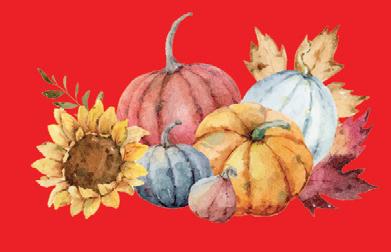
For what?
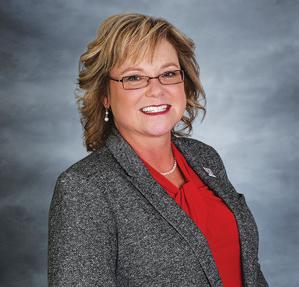
But he knew he’d never convince Lem of that, not since those damn fools kept comin’ by and payin’ more money for ’coys that can’t even swim.
I was picked up by some fool collector
Who put me up here on a shelf
But my place is out on the river, Where I can drift all by myself.
Steve heard Lem stir and looked across the cluttered work bench at him. Lem was sitting back in his

chair, cigarette in hand, looking out under his felt fedora with that one-sided smile on his face Steve had seen so many times when Lem felt good with himself.
Steve looked down at the bird Lem had drawn and could see it was different. Not only was the body flatter and broader, but he could see a big difference in the cut of the breast. The straight line where the head would sit was no longer level ~ the breast was more round and curved up higher ~ so that the joint line now slanted up from the base of the back of the neck. Steve could see right away that if the bottom of the head was cut up at the same angle, when it was attached and sanded, the bird would have a





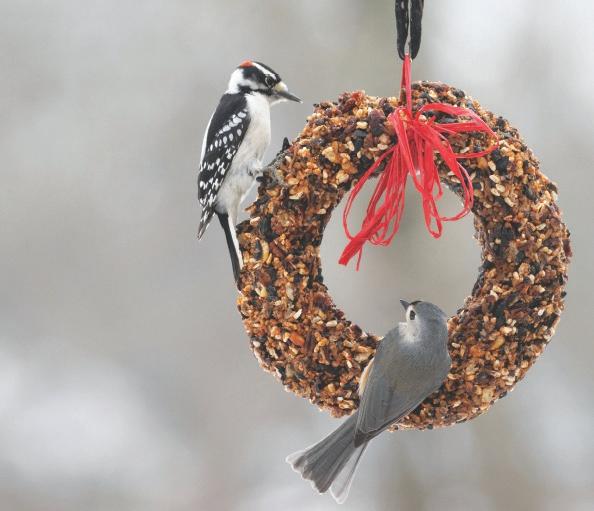
odds and ends that he knew would come in handy one day.
much fuller ‘crop’ area and be much more natural.
They worked together silently for another hour or so, except for Lem explainin’ how to cut the heads and fit ’em to the new breast line. They worked out the angles needed to do a few birds with their heads turned, and Lem sketched out a body that had the tips of the primaries slightly raised.
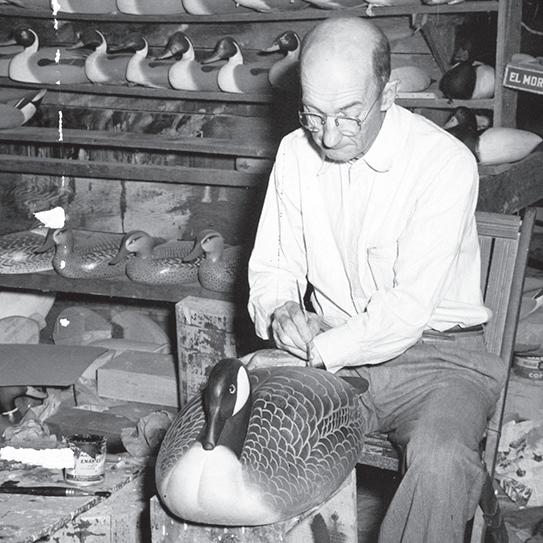
While Lem was finishing up his “changes,” Steve found an old Pall Mall carton and retraced a few of the well-worn patterns he held in his hand. The carton was from a stack of thin cardboard that Steve had collected and saved for just this purpose. He had a lot more cardboard, more than they could ever use, stored up over the old shop, along with all of Lem’s old brushes and a lot of other
The mornin’ was gettin’ on by the time Lem cleared his bench of carboard and pulled his brushes, paints, Maxwell House coffee cans and the bird he was working on back in place. Steve gatherd up the sketches they both had done and, after agreeing not to go “over town” this mornin’, Lem went out to get them both a mid-morning cup of coffee from the house. Steve took the time to throw a couple of half-finished decoys, that Lem had rejected on Lem’s fire. Mostly the rejects were due to faults in the wood, or sap spots that Lem knew would never cover or dry, but Steve also knew, but never let on, that Lem, “not wantin’ to cause hard feelings,” would wait until Steve was out working the garden or something and replace a head he didn’t like and throw the rejected head in the fire before Steve got back.
When Steve had his coffee, and Lem was back painting, he picked up his old knife, stropped it a few times and hummed “When That Old Wedding Ring Was New” as he set to work cuttin’ out the new patterns. He smiled when he heard Lem’s voice join in the song, and by the time they got to the last line they were harmonizing in full voice, Lem in his strong tenor, and Steve in the high falsetto that he knew Lem loved so much.
By the time they had gone through that song again and one round of “Sweet Adeline,” Steve had all the


patterns cut, signed and dated. He hadn’t always signed them but had been lately, since more and more stranger were stopping in and asking to buy decoys, some even before the paint was dry. You never knew what the damn fools would pay good money for.
Steve wasn’t a greedy man (Lem would give every damn thing away just ’cause it made him feel good) but he couldn’t forget the hard times they had been through and he had enough business sense to give some thought to Ida and her boys and the future. Anyway, the patterns were always a little special to him. They were just pieces of cardboard to
Lem, just the first step in making a better bird, but Steve, ’specially at times like now, when he was tracing them on the blocks of wood, knew that each block would grow into a finished decoy, a good ‘counterfeit of nature,’ as Lem would say. At times like these, Steve thought of the patterns like the pencil sketches in that book he had in the house. The sketches those famous fellers did before they got the canvases out and started to paint. He knew if he told those thoughts to Lem, he’d hear “Gosh, dast, Steve, you’re out of your mind, They ain’t worth nothin’.” But he’d try to make sure either he or Lem signed them anyway from now on. You never knew.
When Steve finished tracing the



last block and hung the patterns on the nails behind him, he pulled out his pocket watch and saw, as he suspected, that it was getting on toward lunch time. Not enough time to start something new. He looked at the stack of traced blocks he had piled up and knew it would take most of the afternoon to carry them all next door and carefully cut each block, along the lines he had traced. He thought again of the noise and sawdust that ol’ bandsaw made and how he hated it. He sat back in his chair and relaxed for a bit, thought happily of later in the afternoon when he would be back in here working on those blocks with his hatchet. He loved that. He loved watching those birds take shape under his hand. He took pride in the way he could use a hatchet and most times could go right down the back of a bird staying right in the
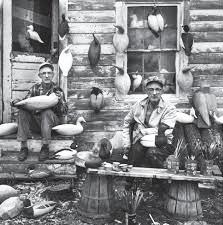
For all of your insurance needs, choose an agent you can trust.
“We have worked with and known Fletcher C. Bauman for years. He has helped us purchase now three homes in the MD area. Fletcher (Fletch) continues to be a fantastic realtor, extremely responsive, professional, and a go-getter.
My wife and I just sought out and purchased a small home on the Eastern Shore of MD. Fletcher was the rst person we called, and we were able to get into the house immediately and made an o er shortly a er. As the process was challenging from the seller's side, Fletch did his job and helped alleviate the stress of the buyer's side. We ended up getting the home and are enjoying it immensely.
We look forward to the future at this new home and the relationship we continue to build with Fletch. We will continue to use Fletch for all future real estate endeavors as we know he has our back and supports his clients until the end.

ank you, Fletch, for improving our lives.”
- e Fritz Family
same cut with every stroke. If he was careful, the ’coy would hardly need any sanding at all before he passed it on to Lem.
As he sat, his thoughts came around to his poem again and the old ’coy he’d found on the island. He decided that when there was time, he’d carve a head for it. He wouldn’t tell Lem, though, because he knew Lem would think it wasn’t worth it. He thought about the poem and decided he’d write it down and maybe that would help him find a good ending. He wrote it on a piece of cardboard, and by the time he had it all down, the ending was there just as natural as anything.
I want to go back to the shoreline Where flying clouds hang thick and low,
And get the touch of the rain drops And the velvety soft touch of the snow.
He’d just fi nished reading it again, pleased that it expressed all that old ’coy had stirred in him, when he heard Lem say, “I’m gettin’ holler.’”

He was amazed again at how accurate Lem’s stomach was because just at that moment the door flew open, Ida’s head appeared and the familiar “Lunch is ready!” rang clearly through both rooms. Steve was about to go in and read Lem his poem, but now it would wait ’til after lunch. He got out of his chair as Lem passed on his way to the door. He looked at his poem again and then walked back into Lem’s room and tacked it up on Lem’s side of the door.
As he walked to the house, his eyes were caught by the windows he had taken out that morning. He forced the thoughts of the bandsaw out of his mind and thought of his poem and the old ’coy again. Before he got to the kitchen door, he had decided rather than work with his hatchet later, he’d walk down to Jenkins Crick, get in his boat and go out and walk along the beach and look for more arrowheads. He knew Lem would understand.






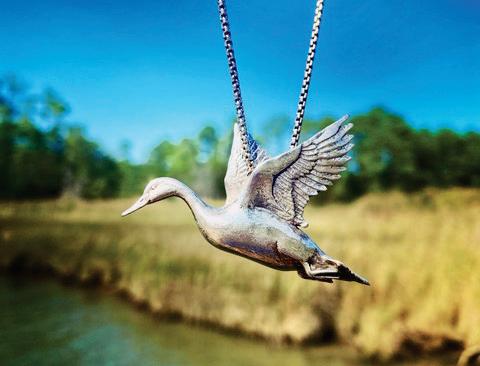






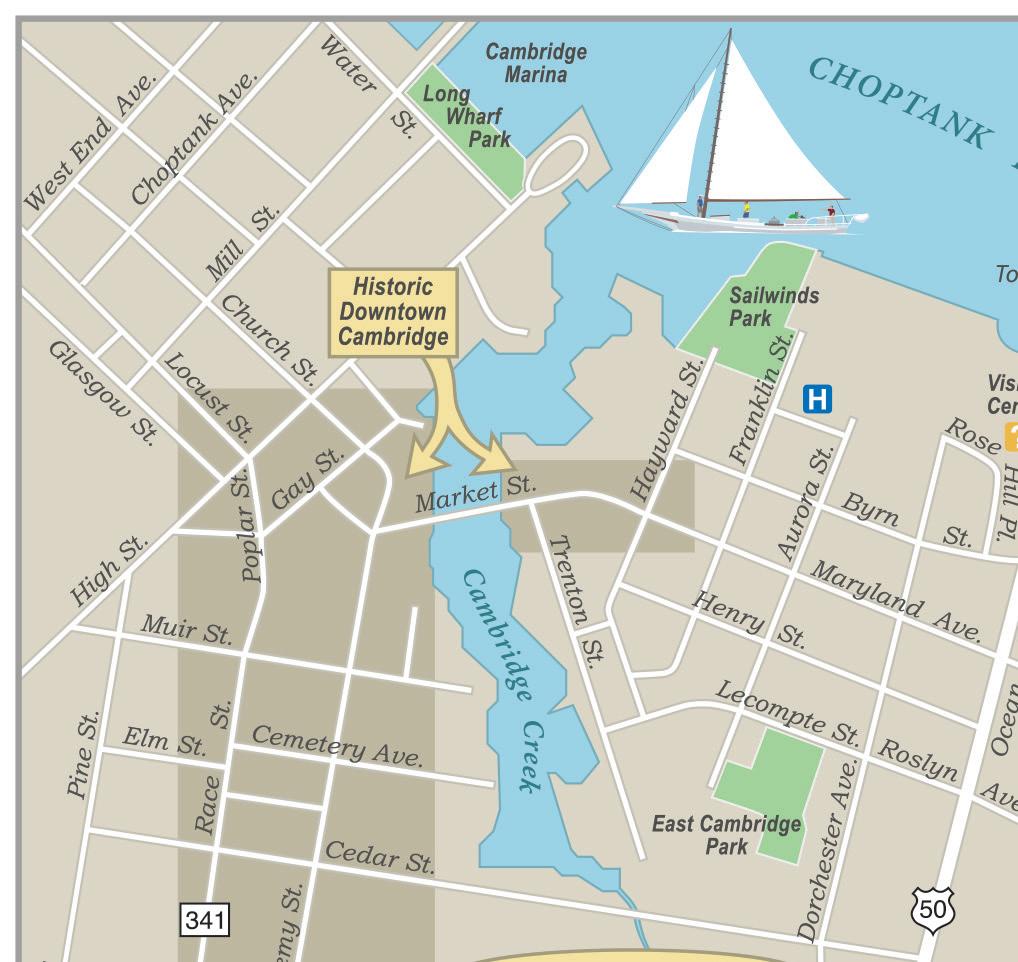
Dorchester County is known as the Heart of the Chesapeake. It is rich in Chesapeake Bay history, folklore and tradition. With 1,700 miles of shoreline (more than any other Maryland county), marshlands, working boats, quaint waterfront towns and villages among fertile farm fields – much still exists of what is the authentic Eastern Shore landscape and traditional way of life along the Chesapeake.
For more information about Dorchester County visit https://tidewatertimes.com/travel-tourism/dorchester/.





November, like March, is a seasonal transition month. The days become shorter, temperatures begin to cool and, after a few rainstorms, the landscape starts to look winter drab. We can still have mild temperatures in November,
and there is usually a warming spell around Thanksgiving. That being said, don’t put away your gardening tools just yet.
Raking is one of those fall chores that needs to be done continuously in November. Don’t leave leaves on

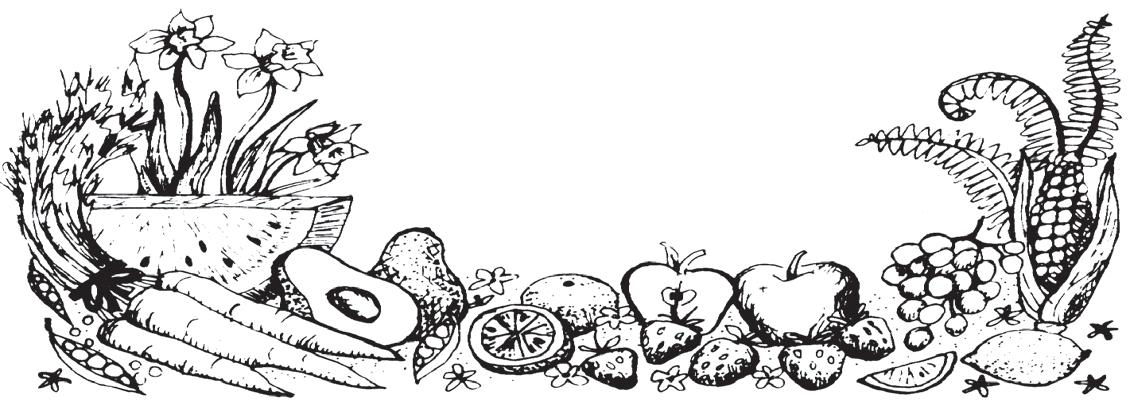
the lawn, as they will smother the turf. A leaf mulching lawnmower is a great way to cut up the leaves and recycle them as nutrients. Leaves should be raked out of the flower bed and removed.



Before raking through herbaceous perennials such as lilies and iris, you will need to cut the plant stems and leaves. Cut the
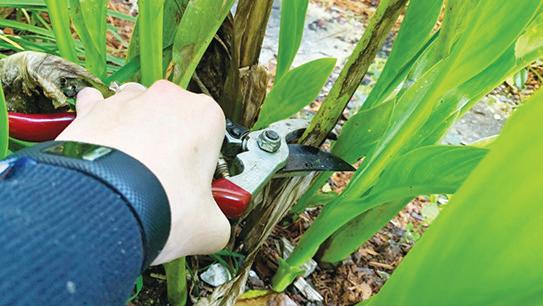
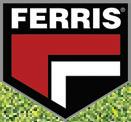

dead plant stems down to about 3 inches. Avoid pulling up the stems or leaves, as that produces holes in the crown of the plant that can lead to rot problems.
Check your perennial beds after a period of fall rains and look for standing water on the surface. During winter, standing water will freeze and may damage the plants. If you have standing water in a bed, dig shallow trenches to help drain it away and make a note to raise the bed next spring.
Planting can still go on through November before the ground freezes. Many perennials may be planted or divided and replanted in fall, but do any transplanting early in the month to give the plants time














to establish a root system.
September and October are the best months to plant spring-flowering bulbs, but there’s still time to plan if you haven’t put all of them in the ground. To promote good root growth, it’s important that the bulbs be planted while the soil is still warm. It is essential that the bulb produce a good, large root system this fall in order to supply its needs next spring. A large root system is essential for the absorption of the water and nutrients necessary for the production of flowers and leaves.

If you still intend to plant bulbs, you will need to mulch the soil heavily in order to conserve as much soil heat as possible. The application of three to four inches of leaves, pine needles, straw or compost over the bulbs will insulate the soil from the cold.
We usually have a few hard frosts in the first part of November. The tender flowering annuals are done
for, so pull them out of the flower beds and dispose of them in the trash. The cool season annuals like pansies, violas, flowering cabbage and kale that you may have planted for fall color can take freezing temperatures and still have color. The chrysanthemums that you have planted need the spent flower stems and branches to be trimmed back to 3 inches.

Many plants and trees provide color and interest in November. They include camellia, nandina, pyracantha, red twig dogwood, birches, coral bark maple and Harry Lauder’s walking stick. Since November is still an excellent time to plant trees and shrubs in the landscape, consider adding one of these plants to add color and interest to your yard.
After a killing frost, long, vigorous shoots of roses may be cut back to 18 to 20 inches so they are not whipped by the winter winds,
which may loosen the roots and make the plant more susceptible to winter injury. Mound the canes with 8 inches of soil for winter protection; remove before growth begins in the spring. Also be sure to clean up any leaf debris around the rose plants to reduce black spot disease problems for next year.

Do not prune azaleas, rhododendrons and other spring-flowering shrubs like forsythia and spirea now, as they have already set their flower buds for next year’s blooms. If you really feel these shrubs need to be pruned, you can do so now, but you will sacrifice next spring’s flowers. Not all plants are dormant in
winter! Many provide winter interest though their foliage. Here are a few perennials for your shade garden that are hardy in our zone. Bugleweed ( Ajuga reptans) has a height of 4 to 8 inches and forms a dense groundcover through the year with white, blue or violet spring flowers. It is such a vigorous grower that some consider it invasive. It prefers well-drained soil.
Lenten rose (Helleborus orientalis) has leathery evergreen foliage and produces pale green, white, pink to maroon flowers in early spring. It reaches a height of 1 ½ to 2 feet and prefers a neutral (pH7) to alkaline soil. Other groundcovers can be dug and transplanted, but you shouldn’t do this with Lenten
FRANK E.DAFFIN, INC. Quality Builders Since 1936 410-822-2364 frankedaffininc.com fedaffin@atlanticbb.net
We make construction work and renovations to your home fun and exciting, as well as easy and stress-free.

rose. Once it is established, leave it there. Yellow archangel (Lamiastrum galeobdolon ‘Variagatum’ ) is another spreading groundcover that grows to a height of 1 to 2 feet. It has silver-patterned evergreen foliage with yellow flowers in summer. Yellow archangel grows best in moist, well-drained soil but tolerates even dry shade and root competition.
In the vegetable garden, root crops such as beets, carrots and turnips can be stored right in the ground through most of the winter. Cover them with a few inches of soil and add a thick layer of mulch to give the crops some extra storage time.

Continue to clean up and compost any old debris left in the garden. If your garden is not subject to soil erosion, you can still turn over the soil and let it lay fallow to help kill any overwintering adult insects. If you are more into a “no-till” garden approach and haven’t sown a green cover, apply a compost mulch to a depth of 3 inches. You can turn it under next spring to add additional organic matter to the soil.
The alternate freezing, thawing, wetting and drying of the soil during winter will help to improve its structure. Now is a good time to work organic matter such as compost into the garden soil. Spread a 1- to 2-inch layer over the soil and till it in. An alternative would be to till the soil and then sheet compost it. Next spring, all you’ll have to do is rake away the compost and till the areas you will plant. The remaining compost will serve as mulch to control the weeds between the rows. By adding organic matter, you will improve the soil structure, resulting in better aeration, water percolation and nutrient retention and improved plant growth.
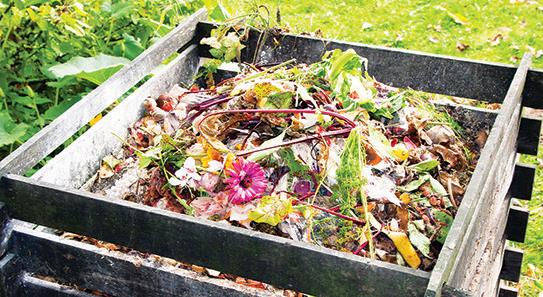




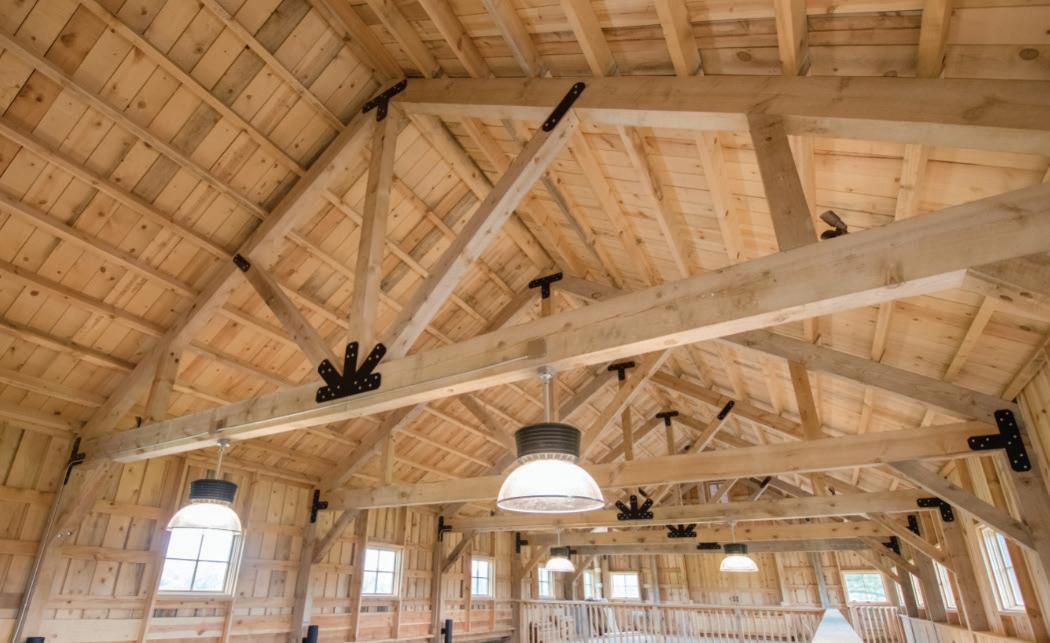
Lime is another element you can add to the garden soil now. Spread the recommended amount of lime from your soil test and till it under. This will give it a few additional months to react with the soil and adjust the pH before your spring crop goes in. Now is not the time to fertilize the garden, as winter rains and snow will leach out most of the fertilizer nutrients, especially in sandier soils.
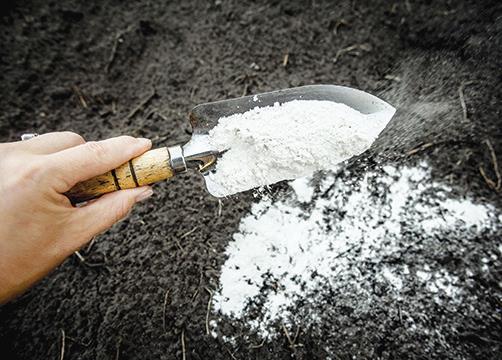
Like ornamental plants, strawberries benefit from mulch protection, especially when snow cover is shallow or nonexistent. Clean straw is superior to hay as mulch because it doesn’t add weed seeds to the garden. Other mulch materials include chopped corn stalks, ground corn cobs, bark chips and pine needles. Apply it so it is no more than two inches deep when it settles. Be careful not to smother the crowns of the plants. Apply after a hard frost when the strawberry leaves
are lying flat on the ground, usually in mid- to late November, to protect crowns and roots against cold injury and drying out.
In addition to providing protection from severe winter temperatures, a light layer of mulch helps keep the soil at an even temperature, which prevents alternate freezing and thawing. This type of temperature change can cause strawberry plants to “heave” out of the soil, resulting in crown and root death. Mulching is especially important where plants are being grown through a black polyethylene covering. If you delay removal of the mulch in spring, the plants will remain dormant later into the season. This often delays blossoming past the critical frost period. In this area, you can remove the mulch in early or midApril if it is a normal spring.
Water broad- and narrowleafed evergreens and conifers thoroughly before the soil freezes. These plants continue to transpire water through their leaves and needles during the winter months and will dry out without an adequate supply of water below the frost line. If the soil is not frozen in mid-winter, water again at that time. This is especially important if we have a fairly dry winter. Check to make sure that you are not over-watering, which can create just as many problems as not watering at all. If you have




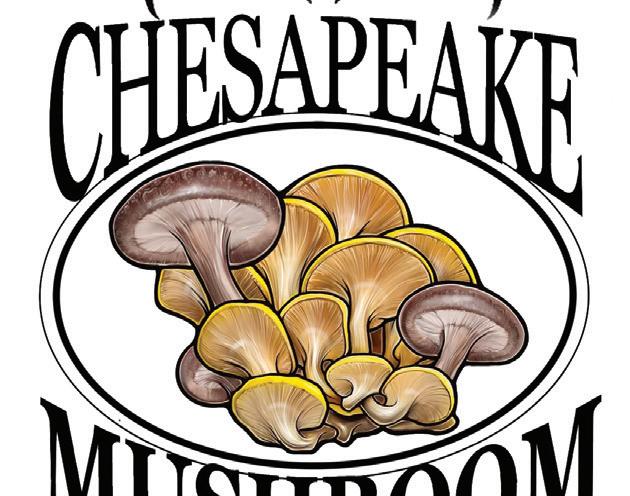









well-drained soil, there should be no problem. But if your soil is heavy clay, like lots of soil in Talbot County and other areas on the ’Shore, make certain that water is not standing around the plants after you have finished watering.

If you have fruit trees, November is the time to rake the leaves from around them to help control insect populations and remove disease-causing organisms that overwinter on leaf debris. You will help reduce rodent populations by removing all fruit remaining on the tree or on the ground. Applying mulch near fruit trees is not recommended, as it increases the

likelihood of rodent damage during winter.
Other activities for November include potting and forcing tulip bulbs for winter bloom, pruning the old canes out of raspberry bushes and starting paperwhites later in the month for Christmas flowering.
Happy Gardening!
Marc Teffeau retired as Director of Research and Regulatory Affairs at the American Nursery and Landscape Association in Washington, D.C. He now lives in Georgia with his wife, Linda.

“I found I was repeating myself. It is the beginning of the end when you discover you have style.”
Thus spoke Maryland wordsmith Dashiell Hammett. Inside five years of the 1930s, he had created the prototypical hard-boiled private eye, elevated pulp detective fiction into literature and invented husband-and-wife investigative teams. Where could he go from there?
We might wish he had looked homeward, maybe even placed his groundbreaking work in Chesapeake settings. In The Maltese Falcon, Sam Spade could have pursued the fabled Black Bird in Baltimore just as well as in San Francisco.
Samuel Dashiell Hammett matured in pre-Charm City Baltimore, but his roots were Southern Maryland. He was born in lower St. Mary’s County. When Sam was four, parents Richard and Annie Bond Hammett moved to the city from his paternal grandfather’s farm, “Hopewell and Aim.”
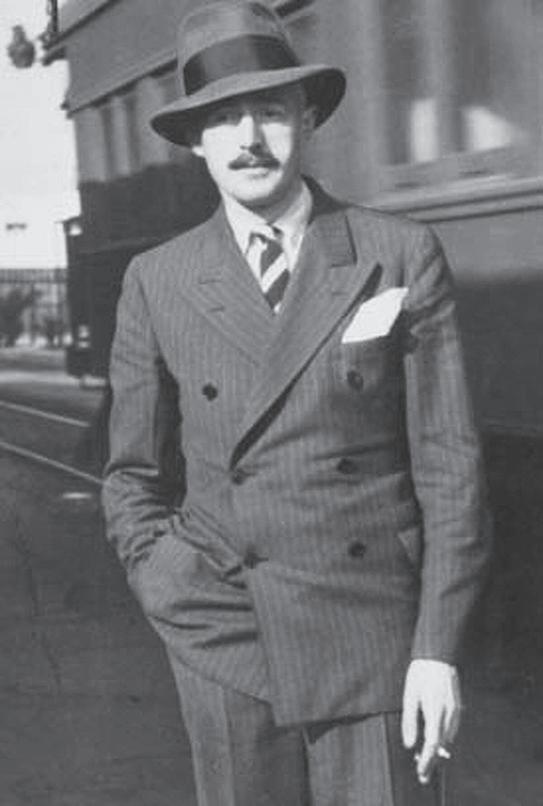
Sam (later “Dash”) Hammett (1894–1961) was close to his mother, whose Maryland family of Huguenot descent was named de Chiel. According to daughter
~ Dashiell HammettA Daughter Remembers , “Annie held herself a step above the roughhewn Hammetts and, I think, encouraged her son to do so as well. It was his mother who gave Papa the sense he was someone special who would make his mark in the world.”





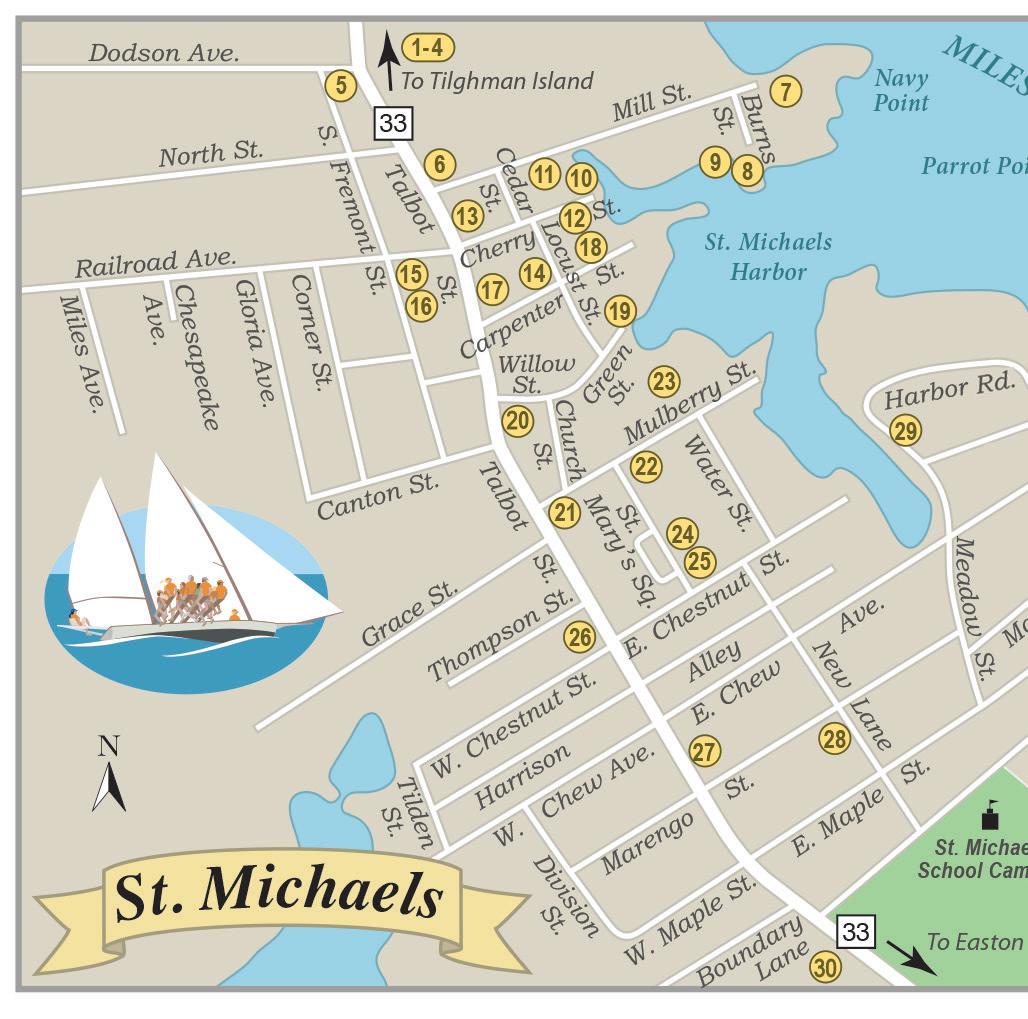
On the broad Miles River, with its picturesque tree-lined streets and beautiful harbor, St. Michaels has been a haven for boats plying the Chesapeake and its inlets since the earliest days. Here, some of the handsomest models of the Bay craft, such as canoes, bugeyes, pungys and some famous Baltimore Clippers, were designed and built. The Church, named “St. Michael’s,” was the first building erected (about 1677) and around it clustered the town that took its name.
For a walking tour and more history of the St. Michaels area visit https://tidewatertimes.com/travel-tourism/st-michaels-maryland/.
ish Flu” ran rampant. Sam became infected but ultimately survived a succession of influenza, bronchial pneumonia and tuberculosis. In mid-1919, the Army ruled his TB “arrested” and discharged him.
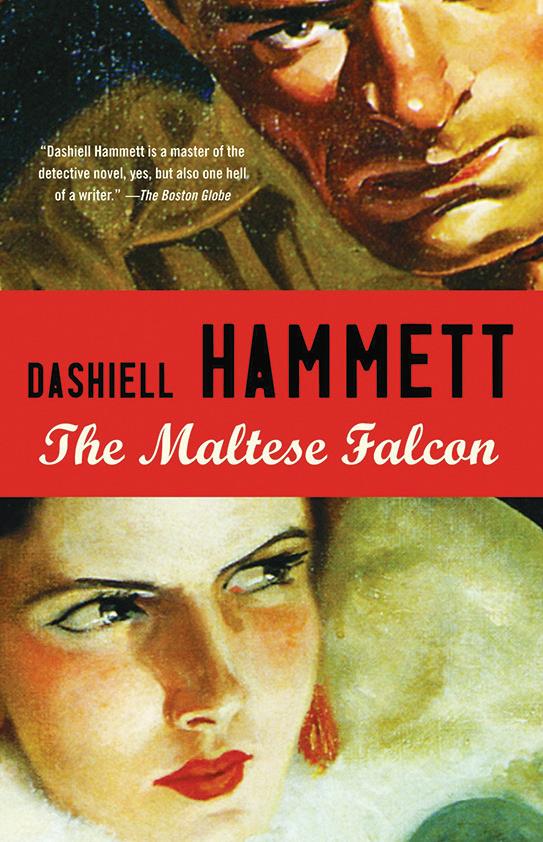
Rejoining Pinkerton as an operative, he moved from Baltimore to Washington State, where TB flared again. Hospitalized in a Public Health Service facility, he fell in love with nurse Josephine Dolan. After he was discharged in May 1921, he and “Josie” married quietly in San Francisco and found an apartment in the Tenderloin. Soon, daughter Mary was born. At a height of six feet, one and a half inches, he weighed 135 pounds. Any
Sam’s father, Richard, unsuccessful in business and politics, had difficulty supporting his family and grew morose under the influence of alcohol. When Sam was 13, he left school to help support the family. As soon as he turned 21, he was eligible for Pinkerton Detective Agency, where he imagined he might find his life’s work. Years passed before he found his true niche, but Pinkerton characters and techniques gave later writings verisimilitude.
During World War I, Sam took a leave of absence to enlist. The Army assigned him to the Ambulance Corps at Fort Meade, where “Span -
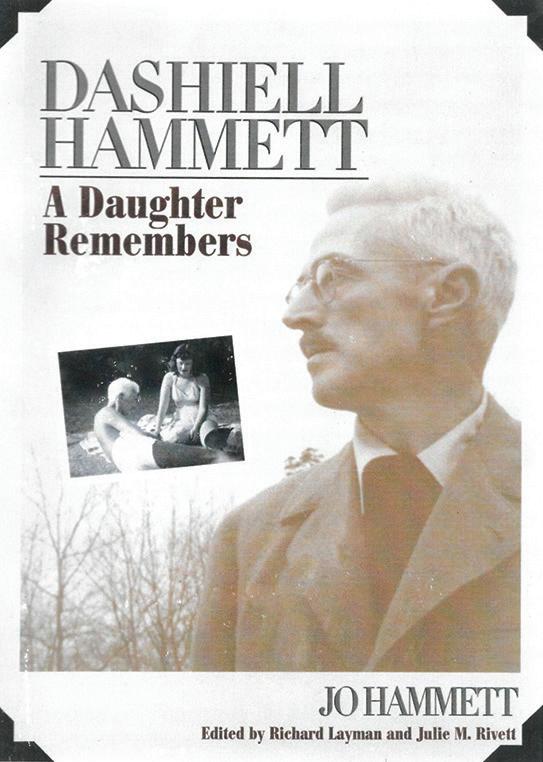
by writing. He penned short articles, submitting to sophisticated National Author's Day
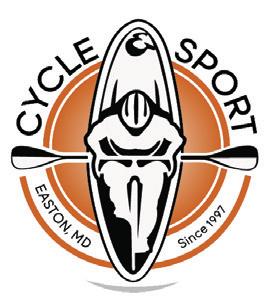

exertion caused dizziness, shortness of breath and chest pains. Public Health Service records show that “when he worked” Sam earned $21 per week and received $40 a month for partial disability.
By December 1921, he was unfit for any job, his disability 100%, with income of $80 a month. Sam’s lungs were so debilitated he had difficulty climbing stairs to their apartment, where he situated furniture to support himself groping around the small rooms.
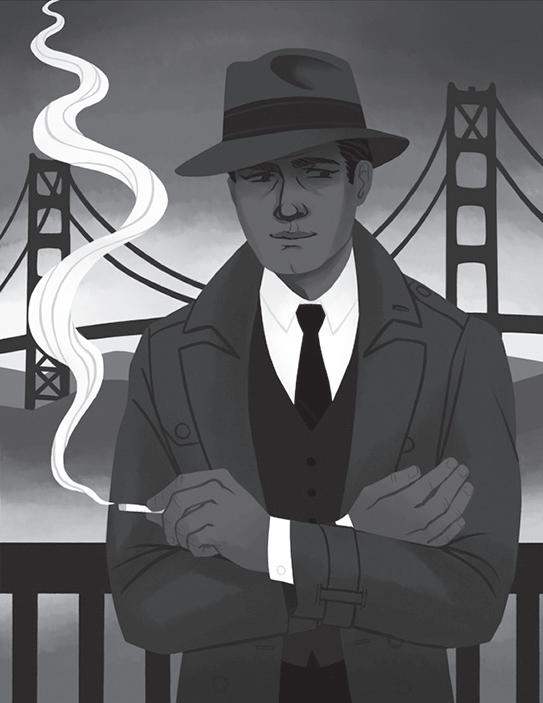
Forced into joblessness, Sam read voraciously and attended vocational journalism classes, hoping he might support his family
The world deserves a better e-bike and Electra has cracked the code, combining comfort, stability and performance in one stylish package. Ready? Where will



publications such as Smart Set magazine. The editor saw promise but encouraged him to submit instead to Black Mask , their lessprestigious pulp magazine, which paid a penny per word for detective stories.
Drawing on his Pinkerton experiences, he spent four hours a day turning out short stories at a rate of one a month, adding $30 or $40 to his monthly disability payment. This was enough until Josie became pregnant with their second daughter, Josephine. Hammett answered a classified ad offering $350 a month to create advertising for a jeweler ~ about
When their second daughter arrived, a public health nurse warned Josie the children shouldn’t live in close quarters with Sam’s contagion. Josie moved the children to Butte, Montana, and stayed with relatives until she could afford a house near San Francisco. Sam rode a ferry across the bay on Sundays and amused the girls while
St. Michaels Inn
offers
St. Michaels Inn




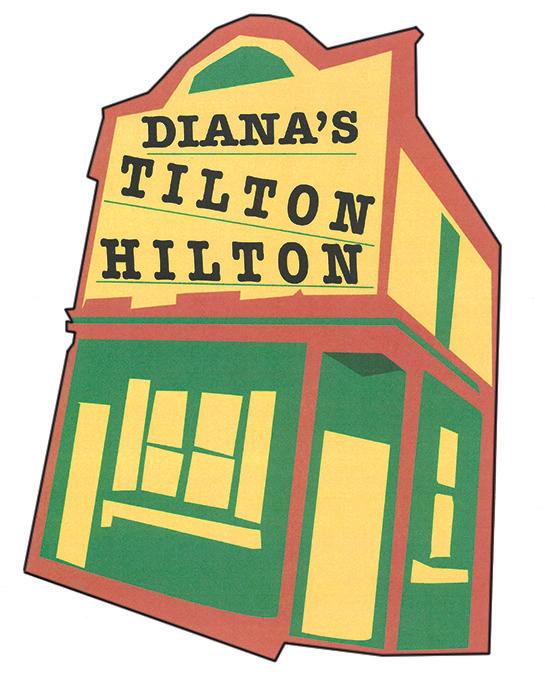
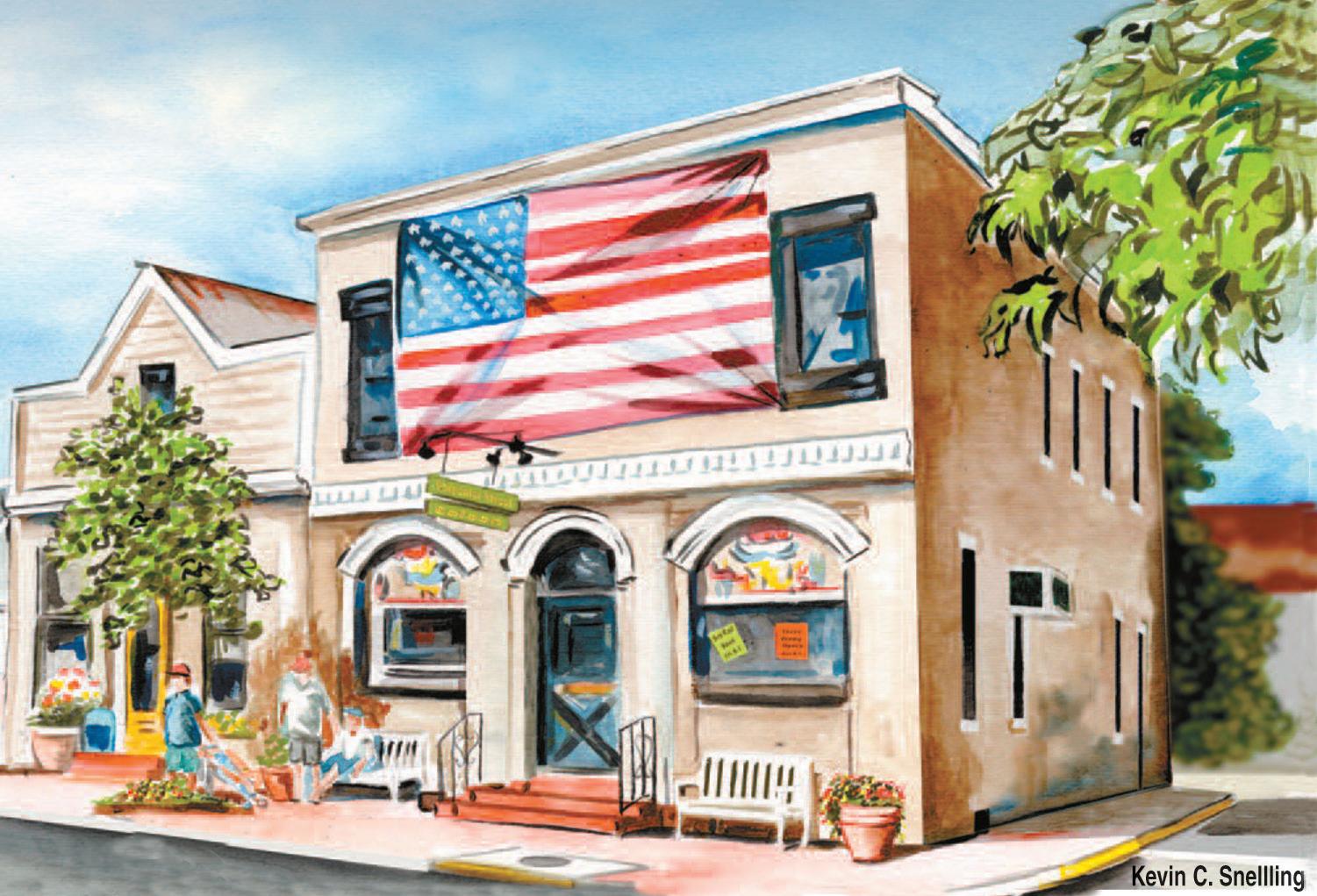
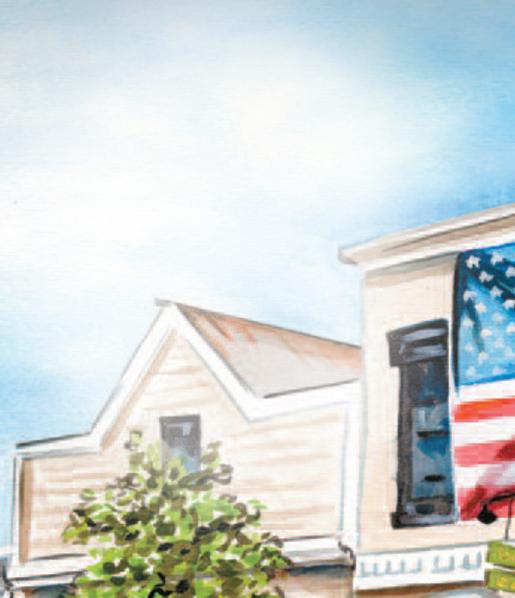









Ave.Stewart Norton St.
The Strand Tilghman
13
Factory St. Morris St. Oxford Bellevue Ferry T r e d A v o n R i v e r
WilsonSt.
St. Market St. HighSt.
Banks St. Oxford Park
12
9 10 11
BenoniAve. Pleasant St. Robes Hbr. Ct. South
Sinclair St. Richardson St. South Street TownCreek Rd.
Mill St. St.Jefferson Oxford Community Center
15 16 17 18 19 4 5 6
Town Creek Oxford
Street Bachelor Point Road Pier St. E. Pier St.
Morris
Third Street Jack’s Pt. Rd.
14 © John Norton
8 1 2 3 7
First Street 2nd St.
East St. Division St. Oxford Road
Bonfield Ave.
To Easton 333
Oxford is one of the oldest towns in Maryland. Although already settled for perhaps 20 years, Oxford marks the year 1683 as its official founding, for in that year Oxford was first named by the Maryland General Assembly as a seaport and was laid out as a town. In 1694, Oxford and a new town called Anne Arundel (now Annapolis) were selected the only ports of entry for the entire Maryland province. Until the American Revolution, Oxford enjoyed prominence as an international shipping center surrounded by wealthy tobacco plantations.
Today, Oxford is a charming tree-lined and waterbound village with a population of just over 700 and is still important in boat building and yachting. It has a protected harbor for watermen who harvest oysters, crabs, clams and fish, and for sailors from all over the Bay.
For a walking tour and more history visit https://tidewatertimes. com/travel-tourism/oxford-maryland/.


Josie attended Mass. Normal family life never resumed. While unemployed during winter 1926–27, Hammett received a life-altering offer from Black Mask . A new editor saw that sales increased 20% when editions included a Hammett story. He encouraged Sam to attempt longer fiction that could be serialized. Within a year, Sam created novel-length Red Harvest, about a fictional Continental Detective Agency engaged with mine owners in a corrupt western town during conflicts among operators, their powerful allies and unionizing miners. The protagonist is a detec -
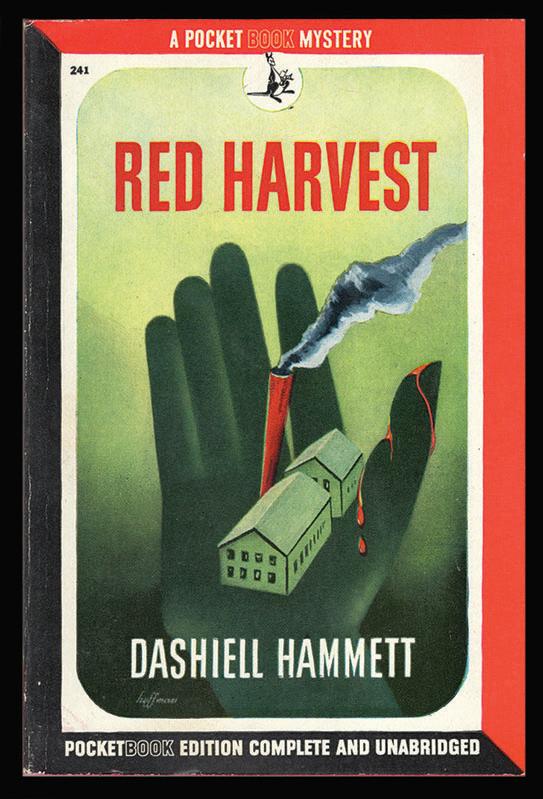

tive called simply Continental Op (“The Op”).
Sam had joined Pinkerton at their Baltimore office in the Continental Trust Building, where gilded statues of falcons flanked the entrance. His assignments often required shadowing subjects anonymously. He had reputedly worked undercover in Butte, Montana, during labor disputes between miners and Anaconda Copper Mining.
Hammett claimed to have once turned down an offer of $10,000 for murdering union organizer Frank Little, who was later tortured and lynched in Butte. In another incident, Anaconda guards shot 17 miners, killing one. Despite involvement of local lawmen, the Na-
tional Guard and the U.S. Army, no charges resulted from either murder. Later, fires erupted coincidentally in disparate Pinkerton offices, destroying files revealing years of strike-breaking involvement.

Josie, a miner’s daughter, and two younger siblings were orphaned in Butte when she was three. Her Dickensian childhood likely provided details of grinding hardships and exploitation of workers. Red Harvest enriched Sam’s career, but it also confirmed left-leaning sympathy for labor and civil rights underdogs that complicated his later life.
Knopf published the four-part serial as a novel in 1929. As Depression befell the country at large,
Sam emerged from his solitary cocoon of poverty. After success with Red Harvest, the anonymous Op morphed into Sam Spade, and Sam into Dash Hammett.
In a burst of creativity, Hammett completed another novel the same year, The Dain Curse, followed in 1930 by The Maltese Falcon, The Glass Key in 1931 and his last novel, The Thin Man, in 1934. While supporting his family, Dash moved to Hollywood and began a 30-year relationship with a script reader and aspiring writer, Lillian Hellman. Hollywood produced a film based on Red Harvest, three film versions of Falcon and a series of Nick and Nora Charles Thin Man films. The first two versions of Falcon were best forgotten. (In the 1936 version, titled Satan Met a Lady, the questers sought the Horn of Roland. Bette Davis co-starred in “the worst dog I ever made at Warner Brothers.”)
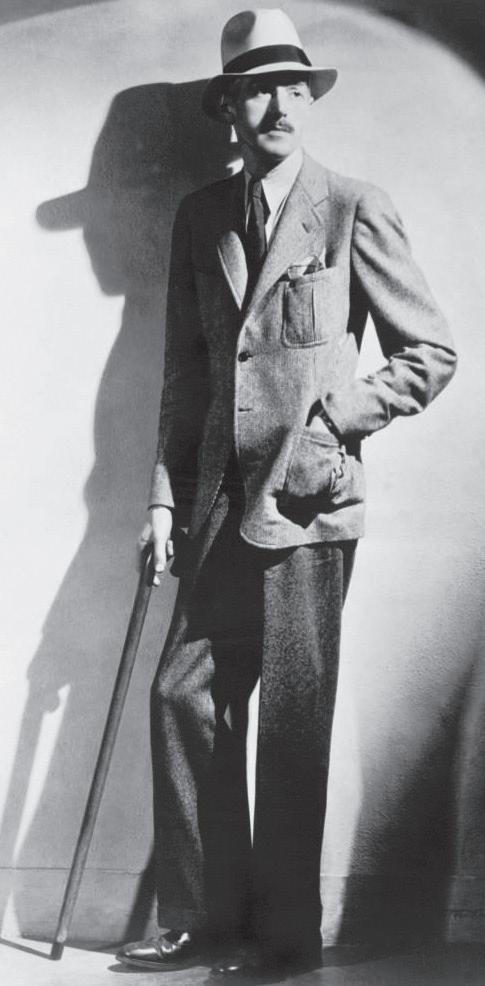
The third Maltese Falcon was the charm. In his 1941 debut, writ-
logue that marked the novel’s success, drawing 95% of the script directly from the book. George Raft refused to work with a novice director, so Humphrey Bogart’s Spade became the template for private eyes to follow. (He also supplied the closing line, “The stuff that dreams are made of.”)

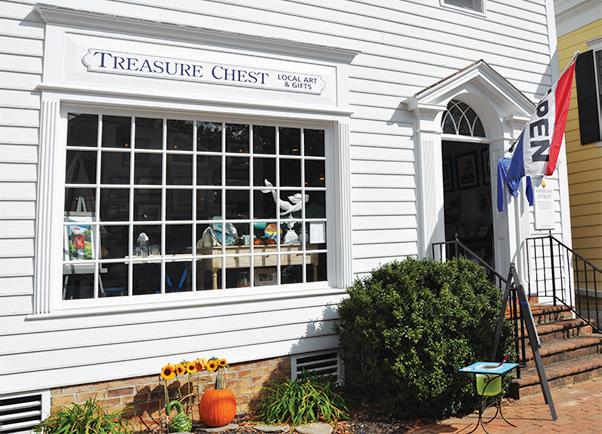

When The Thin Man was published, hard-drinking, urbane Nick Charles resembled its cover image: a full-length photo of the well-tailored Hammett, looking suave and a bit inscrutable. Nora’s bright, witty character resembled Hellman. Life imitating art, both couples traveled in style between Hollywood and New York. As his own work tapered off, Dash helped
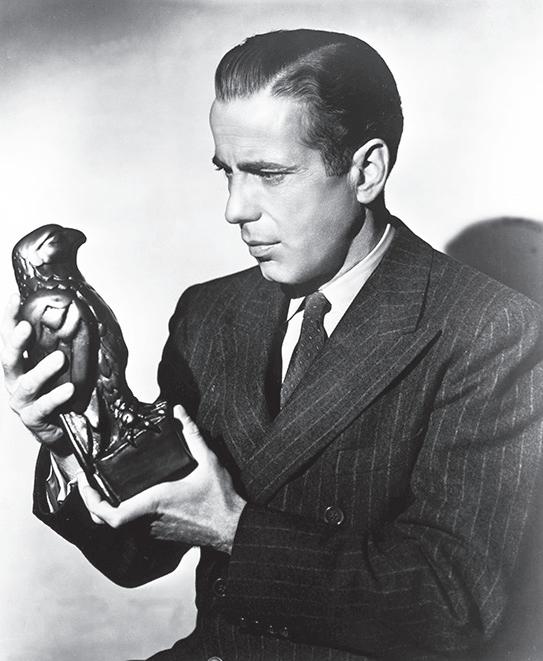
(for which she never credited him).
Dash created a lucrative comic strip, Secret Agent X-9 , which triggered an investigation by FBI Director J. Edgar Hoover, who thought it subversive. No doubt Red Harvest was no Hoover favorite, either. Regardless, Dash became ever more visibly active in politics. Antifascist, pro-Marxist inclinations led him to support the Abraham Lincoln Brigade during the Spanish Civil War.
When the U.S. entered World War II, Dash induced an army doctor to call a wheezy 48-year-old a “rangy American type” fit for the Signal Corps. Corporal Hammett
landed in the Aleutians as the Japanese invasion failed. Seemingly, he enjoyed the duration on Adak, editing the company newspaper. He returned to civilian America with emphysema, just in time to run afoul of the McCarthy era. As trustee of the Civil Rights Congress, Dash stubbornly refused to name its contributors. The claustrophobic was jailed six months for contempt of court. His books vanished from shelves, radio and television blacklisted popular adaptations of his works and the IRS attached royalties for back taxes. Impoverished again at his death in 1961, the two-war veteran was buried in Arlington National Cemetery over Hoover’s objections.


All Month - Rooted in the Land: A Tribute to Eastern Shore FarmersRenowned photographer, Edwin Remsberg, tells the story of multigenerational family roots in agriculture and pays tribute to the farmers of the Eastern Shore. Free. Fri. – Mon., 10 a.m. to 4 p.m. Oxford Museum, 100 S. Morris St. www.oxfordmuseummd.org All Month - Crossroads: Change in Rural America - A Museum on Mainstreet exhibition organized by the Smithsonian Institute. Presented by the Oxford Museum, MD Humanities Council and the US Congress. St. Paul’s Church, Morris St, Oxford. Friday-Monday, 10 a.m. – 4 p.m. www.oxfordmuseummd. org for more info.
11/3 - Beginner Chalk Mineral Paint Class - Learn how to use Dixie Belle chalk mineral paint and sealers to paint furniture, picture frames, home décor items too! You will be painting practice boards, applying paints, glazes & sealers. $45, all materials provided. 5 -7:30 p.m. The Treasure Chest, 111 S. Morris St. For more info or sign up, go to www.treasurechestoxford.com or call 410-924-8817.
11/5 – Cars and Coffee – Final one of the season, don’t miss it! Free; 8:30 -10:30. Oxford Community Center, www.oxfordcc.org ; 410-226-5409.
11/9 or 11/21 - Bring Your Own Piece Furniture Painting Class – Bring a small piece such as a small table, plant stand, footstool,picture frame, bread box and learn how to paint it with Chalk Mineral paint. $65, includes 4 oz. jar of paint.5-8 p.m. The Treasure Chest, 111 S. Morris St. For more info or sign up, go to www.treasurechestoxford.com or call 410-924-8817.
11/10 - Speaker Program – Kicking The Can: History and Stories of the Canning Industry on the Eastern Shore - Presented in partnership with Oxford Museum. 5:30--6:30 p.m., free with cash bar. Oxford Community Center. RSVP at www.oxfordcc.org ; 410-226-5904.
11/10-12 - Carrona Estate Sales - “The Oaks” Renovation Sale; 25876 Royal Oak Rd, 9 a.m. - 2 p.m. each day. www.estatesales.org/estate-sale-companies/4970; 443 521-5014.
11/12 - Model Boat Show – Oxford Community Center, 200 Oxford Rd., 10 a.m. – 4 p.m. soup & chili by OVFD Auxiliary, hamburgers and hot dogs grilled by OVFD firefighters; Mystery Loves Company on site with boating books; more info at www.oxfordcc.org ; 410-226-5904.
11/13 - Pancake Breakfast – Oxford Volunteer Fire Dept. 8 – 11 a.m.
11/17 – Sign Painting and Transfers – Learn more about chalk mineral paint and transfers by painting a plaque and adding a transfer. $36, all materials provided. 5-7 p.m. The Treasure Chest, 111 S. Morris St. For more info or sign up, go to www.treasurechestoxford.com or call 410-924-881.
11/19 – Murder Mystery Dinner - Love the 80’s to Death - You’ve been invited to a “battle of the bands evening.” Just as the concert is about to start, someone is killed. It is up to the guests to figure out who. A catered dinner ‘to die’ for. Come in 80’s attire (optional). Oxford Community Center; More info and tickets at www.oxfordcc.org ; 410-226-5905.
11/3 – 11/6 - Tred Avon Players present Savannah Sipping Society – performance times vary. www. Tredavonplayers.org for more info and tickets.
11/30 – Oxford Community Center Anniversary Festivities ; Oxford Community Center; 6-8 p.m; www.oxfordcc.org; 410-226-5904. Check restaurant and shop websites or facebook for current days/hours.
Hammett had authored nothing particularly noteworthy in thirty years. In San Francisco, some said their city was his muse and he could have found his voice if he’d returned to “the city by the Bay.” In fact, whatever charm that foggy city undoubtedly possesses, the solid details that informed Hammett’s stories were gained largely
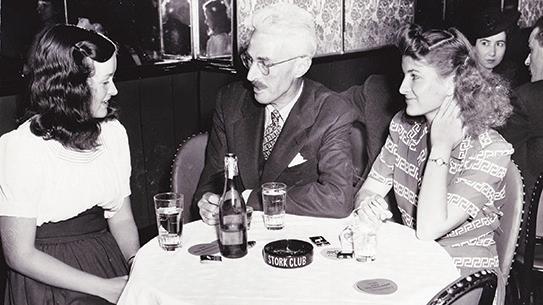
in Baltimore. It was only in San Francisco that circumstances allowed the time and freedom to turn them into enduring fiction.
Bullet-ridden Captain Jacobi could have staggered into Spade’s office with the falcon after his ship La Paloma burned in Baltimore’s Harbor.
Forty-some years ago, A.M. Foley swapped the Washington, D.C., business scene for a writing life on Elliott Island, Maryland. Tidewater Times has kindly published portions of one upcoming work, Chesapeake Bay Island Hopping, along with other regional musings. Foley’s published works are described at www.HollandIslandBook.com.





In the United States, turkey, stuffing, mashed potatoes, cranberry sauce, pumpkin pie and football are typically on the menu the fourth Thursday in November. But the original Thanksgiving meal in 1621 didn’t resemble this at all. Instead, they ate a mix of wild fish and game, as hunting and fishing were a part of everyday life in the 17th century.
Ducks and geese were likely the
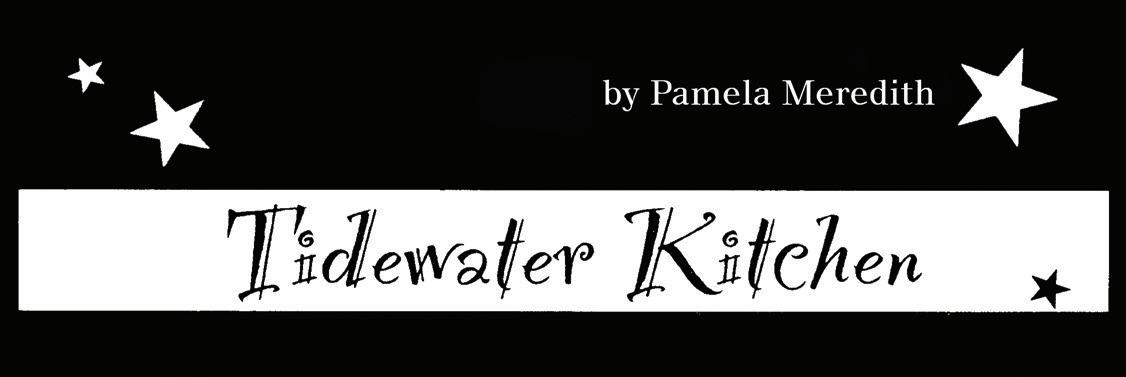
birds of choice because they were more plentiful in the wild. Turkey is also considered fowl, but the first Thanksgiving probably included waterfowl because ducks and geese were also easier to catch and cook. Deer meat was likely a centerpiece of the first Thanksgiving as well.
As we all know, preparing a traditional Thanksgiving meal can be stressful with the hustle and bustle of the holidays. To alleviate the un -

necessary pressure, consider the game you have stored away in your freezer. When the holidays sneak up on you, you’ll have more options than you realize to jazz up your menu that aren’t available in the grocery store!
Wild game is a delicacy to enjoy during the holiday season, whether you bring it home yourself or share in the bounty of a friend or neighbor. When we lived in Sailors Retreat, we were most fortunate to have wild game given to us. In fact, some of the recipes are from Oxford friends and are a wild take on your Thanksgiving classics!
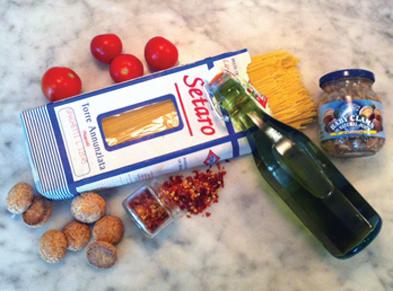
Because ducks are usually so fatty, it is desirable to eliminate as much fat as possible before they are roasted. This recipe is for two (4- to 5-pound) ducks. The same method may be used for one (7- to 8-pound) goose.

2 (4- to 5-pound) ducks
Clean and dry ducks thoroughly. Cross the ducks’ legs and tie them with kitchen twine. Place in open roasting pan. Prick the skin all over with a fork. Roast at 350°F for 1 hour with a piece of foil loosely placed over ducks to prevent their becoming dry. Pour off fat that accumulates in pan twice during the cooking.
Meanwhile, combine the following in a small bowl:
1 T. salt ½ t. pepper 1 t. seasoned salt ½ t. garlic powder 1 t. poultry seasoning ½ t. ground ginger
2–3 dashes cayenne pepper
When ducks are cool enough to be handled, rub thoroughly with seasoning mixture inside and out. Return to oven and roast for 25 minutes per pound, or until skin is very crisp but meat is moist and tender. Baste often, adding a small amount of hot water as needed if ducks seem to be sticking to pan. When done, remove ducks from pan. Pour off all excess fat, add ½ c. hot water to pan and bring to a boil. Scrape the pan and simmer for about 2 minutes. Add to Giblet Gravy. Serve the ducks quartered. Serves 8.

Giblets and necks of ducks 4 c. chicken broth
1 onion, chopped 1 clove garlic, minced
Easton, MD: 410.819.8900

Annapolis, MD: 410.267.7110


Mechanicsville, MD: 301.274.2570
Linthicum, MD: 410.789.8000
Chantilly, VA: 703.263.2300
Gaithersburg, MD: 240.650.6000
Takoma Park, MD: 301.608.2600 York, PA: 717.845.6500 adu.com


1 t. seasoned salt
½ t. ground ginger
2 stalks celery, chopped
½ t. sea salt
¼ t. freshly ground pepper
2 t. cornstarch
Thoroughly clean the duck giblets and necks. Place in saucepan with all other ingredients except cornstarch. Bring to a boil, cover and reduce heat. Simmer for about 3 hours, until gizzards are quite tender. Strain; thicken if desired. Cut up giblets and pieces of neck meat and return to gravy.
To thicken the gravy, stir about
2 t. cornstarch into a tablespoon of cold water, then blend with the gravy. Cook, stirring constantly, until slightly thickened. Combine with pan juices left from roasting ducks.
A goose weighing about 9 pounds will serve 8–10 guests. Follow above directions for roasting ducks and making giblet gravy. The following is a recipe for a wine sauce








to accompany roast goose.
Wine Sauce for Roast Goose
½ c. butter
4 T. flour
4 c. broth (use all gravy from the goose plus as much of the giblet broth as required to make 4 cups)
½ c. dry red wine
Sea salt and freshly ground pepper to taste
¼ cup minced fresh parsley—do not omit!
Melt butter in saucepan, stir in flour and blend well. Gradually add broth, stirring constantly until thickened. Add wine, salt, pepper and parsley. Heat a moment longer and serve.
Harold was a neighbor, and this is the recipe that my mom made quite often.
Clean and dry the goose thoroughly. Stuff the goose with 3 stalks of celery and 1 apple, quartered. Cross the legs and tie them with kitchen twine.
In a roasting pan with a lid, bake the goose in:
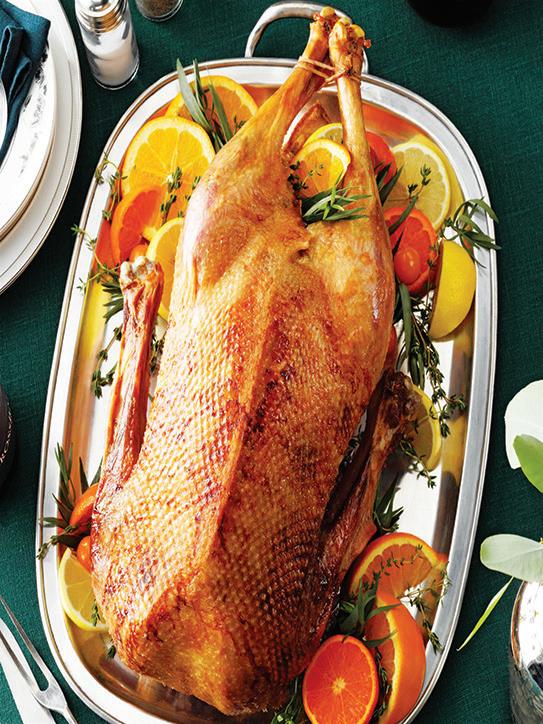
1 c. red wine
1 c. red wine vinegar
1 t. sea salt
1 t. freshly ground pepper
1 t. ground ginger
2 oranges, squeezed
Cut oranges into smaller pieces and include the rind
1 onion, quartered 1 t. powdered cloves or whole cloves
Bake with lid on the roasting pan at 350°F for 2 hours. Bake for 30 more minutes or longer without lid to brown, basting every 15 minutes. Let stand 20 minutes before carving. Use essence for gravy and serve with goose.
This was given to my mom by another neighbor, Matt Mahoney.
1 goose breast, skinned and boned (makes two fillets) ½ c. dry red wine ½ c. soy sauce
½ c. cooking oil
¼ t. freshly ground pepper
In shallow dish, combine the wine, soy sauce, oil and pepper. Marinate the skinned and boned goose fillets for 2 ½ hours, turning often. Remove from marinade and place on foil on a broiler pan. Preheat the broiler and place the fillets 5 inches from heat for 10 minutes (5 minutes on each side.) Place on a wooden carving board and slice each fillet thinly, diagonally against the grain. Ladle sauce over each slice of meat.
Sauce: ¼ c. black raspberry jelly ¼ c. water
1 ½ T. Dijon mustard
1 t. lime juice
1 t. soy sauce
½ t. steak sauce
¼ t. ground caraway seeds
½ t. sea salt
⅛ t. freshly ground pepper Combine ingredients, heat and serve in a heated gravy boat.
Serves 4.
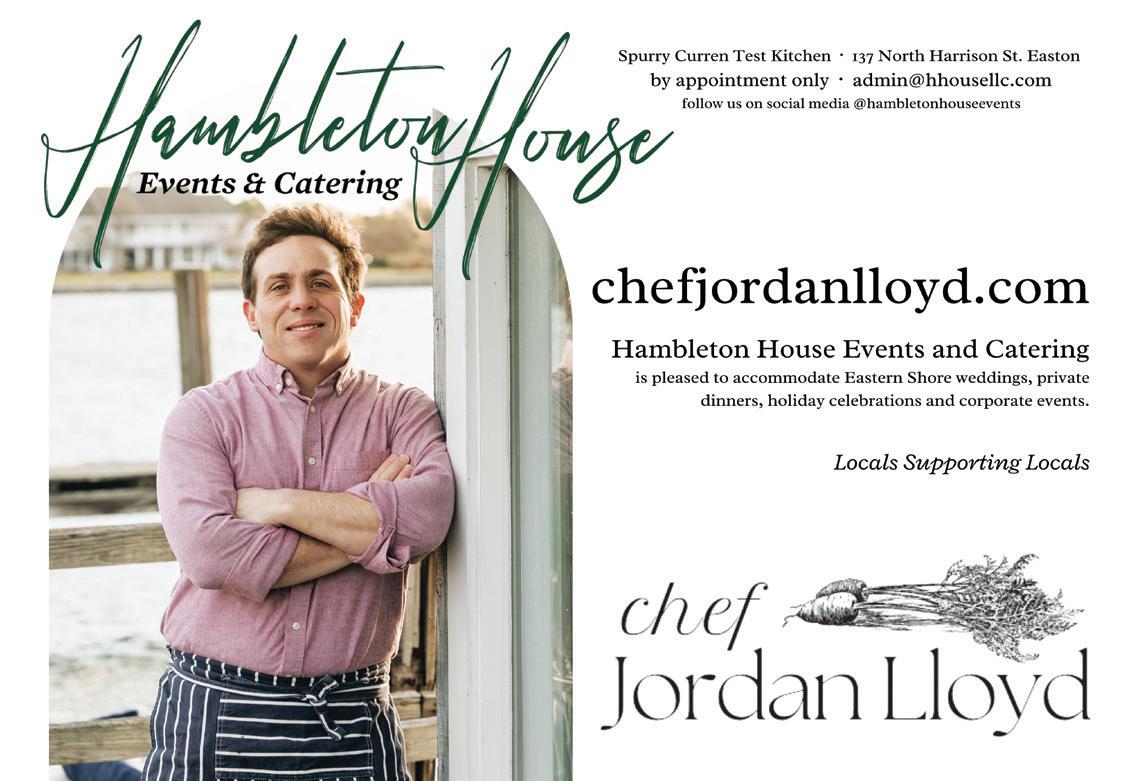
Duck a l’Orange
1 package (6.2 oz.) fast-cooking long grain and wild rice
1 (4- to 5-pound) duck
¼ c. thawed orange juice concentrate
2 T. honey
1 T. butter, melted 2 T. soy sauce
or until thermometer reaches 180°F for ducks and 165°F for stuffing, basting with orange juice mixture. Pour off fat that accumulates in pan. Let stand 20 minutes before removing stuffing or carving.
For orange sauce, combine orange juice concentrate and water in saucepan and bring to a boil. Combine cornstarch and cold water and stir until smooth. Stir into orange sauce, cook and stir 2 minutes or until thickened. Season with salt. Serve warm with duck.
Sauce: ¼ c. thawed orange juice concentrate
1 c. water 1 T. cornstarch 2 T. cold water ⅛ t. sea salt
Prepare rice mix according to package directions.
Prick skin of ducks thoroughly. Loosely stuff ducks with wild rice mixture. Skewer neck openings and tie legs together.
Place breast side up on a rack in a shallow roasting pan. In a bowl, combine orange juice concentrate, honey, butter and soy sauce and set aside.

Bake uncovered at 350°F for 1 hour. Baste with mixture. Cover loosely with foil and bake 1 ½ hours
A delicacy in our family! 1 (3- to 5-pound) venison roast 3 c. red wine 3 large onions, thinly sliced 12 black peppercorns 6 whole allspice 12 whole cloves 1 bay leaf 3 T. flour ½ c. water
Remove any white membrane surrounding roast. Place roast in a shallow dish. Combine wine, onion and seasoning. Pour over roast and cover. Marinate overnight in refrigerator, turning occasionally. Remove roast from marinade, reserving marinade, and brown in a Dutch oven. Add marinade to roast and bake, uncovered, at 350°F for 1 ½ hours or until meat thermometer registers 170°F.


Remove bay leaf and discard. Remove roast, reserving marinade. Combine flour and water, and stir until smooth. Add flour mixture to marinade. Cook over medium heat, stirring constantly, until thickened. Serve gravy with roast. Serves 6–8.
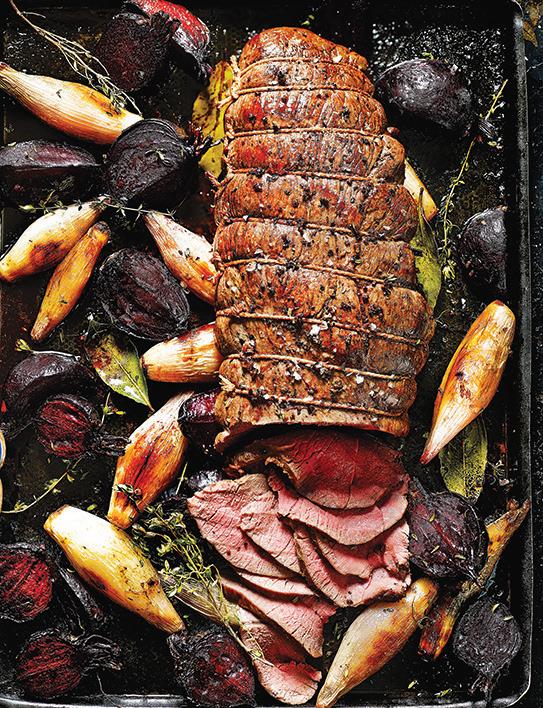
1 ½ lbs. boneless venison, cut into ½-inch cubes
½ lb. smoked sausage, cut into ½- inch slices (I use Italian sausage)
2 T. olive oil
1 onion, chopped
½ c. celery, chopped
2 (28 oz.) cans tomatoes, undrained and chopped
1 (12 oz.) can of beer
1 t. sea salt
1 T. fresh rosemary, minced
1 T. fresh basil
½ t. freshly ground pepper
3 carrots, diced
4 medium potatoes, cubed
Brown venison and sausage in hot oil in a large Dutch oven. Add onion and celery; cook until tender. Add remaining ingredients except carrots and potatoes. Cover, reduce heat and simmer 30 minutes. Add carrots and cook uncovered for 30 minutes. Add potatoes and cook an additional 30 minutes or until done. Makes 2 quarts.

A longtime resident of Oxford, Pamela Meredith, formerly Denver’s NBC Channel 9 Children’s Chef, has taught both adult and children’s cooking classes. She currently resides in Easton.
For more of Pam’s recipes, visit the Story Archive tab at tidewatertimes.com.


Decidedly formal with traditional raised panels and turned legs, but with touches such as pewter hardware and distressing, a feeling of time worn comfort emerges.




My debut on the Avalon Theatre stage was in a production of Dr. Seuss’s Green Eggs and Ham when I was four years old. Crouched on stage right behind a prop ~ a cardboard tree, as I recall ~ I recited my line over and over again in my head. I mentally ran through the blocking, keeping my eye on the “X” taped on the stage that indicated where I was supposed to deliver my line. The stage lights beat down on me, and I heard my cue. This was it. All the rehearsal and stage directions and costume fittings
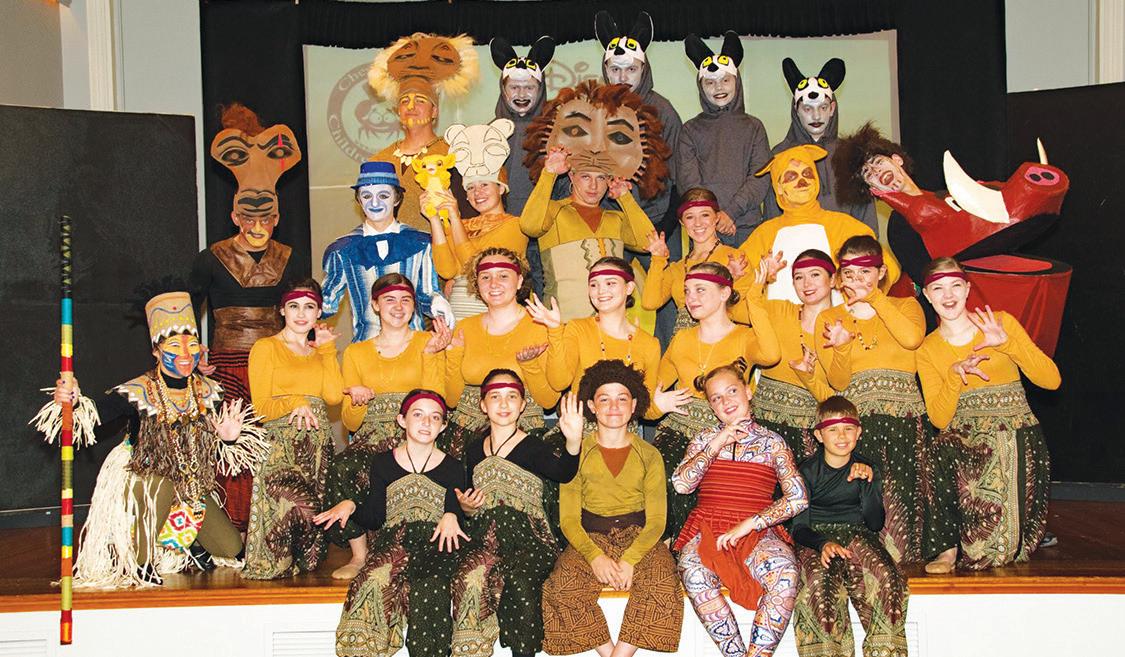
had come down to this moment, where I would say my line on a real stage, in a real theater, equipped with box seats and balconies. Donning a pair of fox ears and tail, I uttered the single line: “Would you eat it with a fox?”
Although I can’t remember how my line was answered, what I do remember is how the Avalon Children’s Theater (aptly known as ACT) treated me and all the other kids like we could achieve something big together and that we could do something important.
From its beginning, the Avalon Theatre, which is celebrating its 100th anniversary this year, has been about engaging the entire community, including the youngest of its kind. From plays to puppet shows, musical acts to Saturday cartoons, the Avalon has always been a family-friendly place. ACT, a program aimed directly at kids, was a natural extension of the Avalon’s mission. By opening up the stage to children, a younger generation has the opportunity to perform in the very same spot as musical giants such as The Wailers, Cowboy Junkies and Judy Collins. That’s the very thing that has
kept Aidan Loeser, who graduated from Easton High School earlier this year, involved in children’s theater since he was four years old. Over the years, he has been in dozens of productions, appearing as Cosmo Brown in Singin’ in the Rain and Phil Davis in White Christmas.

ACT gave Loeser a place to grow up, providing the bridge between child and young adult. “Playing




somebody else makes you reflect on yourself,” he says when asked how his long career in children’s theater shaped him. While Loeser does not plan to be on stage at Belmont University in Nashville, TN, he will be majoring in music business.
“Part of the Avalon Foundation’s mission is to foster a strong community on the Eastern Shore by creating accessible, uplifting arts, education and cultural experiences. We wanted to expand on serving the youth in our community, and launching ACT was certainly a great way to do that,” explains Kimberly Stevens. Since 2018, she has been the director of development and children’s programming after merging her popular Chesapeake Children’s Theater with the Avalon’s program.
Currently, ACT has three different types of opportunities throughout the year for children to participate in: full-length musical productions, an annual holiday show and a summer camp.
ACT musical productions are full-length shows, with rehearsal times spanning from eight to ten weeks. The entire cast is made up of children. Past shows include Disney’s The Lion King, Junie B. Jones, 42nd Street, Matilda and, most recently, Newsies Jr. There are three
to five shows a year, with around 300 participants from grades K–12.
Katie Fitzgerald, who’s now 10 years old, is one of those kids. She has played the schoolgirl Lavender in Matilda, orphan Molly in Annie and Tiny Tim in A Christmas Carol. “I’ve noticed that she encourages other kids to join in and just twinkles when she talks about the shows,” Lexa Fitzgerald says of her daughter. “The program has built up Katie’s confidence, and no matter where she goes in life, she’ll always carry that with her.”
The annual holiday shows include kids in their productions, although they primarily cast adults. The holiday shows are not part of the regular ACT productions but are shows that are open to performers of all ages and of all experience levels. Young children and teenagers are given the opportunity to work alongside adult actors in shows such as Elf, White Christmas and A Christmas Carol.
Performances are normally in

December, after roughly three months of rehearsal. These shows foster a sense of community, sometimes even involving the whole family. Take for instance, the Rauch family of Easton. Benji Rauch, 10, performed with his father, Casey Rauch, in A Christmas Carol two years ago. “My dad actually played my character’s dad in the show, which was funny,” he says.

Stevens, who serves as the camp director, notes that what’s special about the summer camps at the Avalon is they’re not production driven. Instead they give kids throughout Talbot County a chance to try out theater through drama
games, musical activities and even script writing. Children participate in a weeklong program that concludes with a musical performance for family and friends on the Avalon stage. Children in kindergarten through second grade can sign up for the “Petite Players” camp, while older kids can opt into “Curtain Call.” Each is aimed at the age group’s interests.
No matter how kids choose to participate in the Avalon Children’s Theater program, they come away with a sense of accomplishment. “The confidence and self-esteem I see in the kids is amazing,” notes Stevens. She mentions that she’s seen a shy child bloom under the stage lights as other young actors

root them on. “Through socialization in rehearsal, I’ve seen kids become much better public speakers and become more comfortable in front of an audience.”
Brady Rauch, Benji’s 12-year-old brother, is one of those kids that benefited from this experience. “During the camp, we would run the show over and over and the counselors would give us notes. Each time you did it, you felt your confidence level grow higher,” he explains.
Even more than the thrill of being on stage, it’s the camaraderie among cast and crew that means the most to the kids. Katie, who has been performing for the past five years, especially loves the Green Room, the backstage area where the cast gets ready for shows and waits for cues. “It’s so welcoming, and you feel like you’re at home when you’re down there,” she shares.
This sense of kinship between Avalon cast members is why Katie is so fond of the theater. She recalls a favorite backstage tradition, a team huddle that bonds the cast. “We come up with a phrase about the show, put our hands all in a circle, and on the count of three, say the phrase together, which is so fun,” she says.
The Green Room has always been a highlight for Aidan Loeser as well. He also remembers spending a lot of his time backstage, but for him what made it extra special was the control room. It was there, in a side room with a sound board and tapes of past performances, that he was able to watch the casts that came before him. “I loved seeing those performances and learning about the technical aspect of theater,” he explains.
For the past century, the Avalon Theatre has dimmed its lights, lifted its curtain and given stellar performances to Talbot County. Thanks to the Children’s Theater, kids can also be a part of the magic. They learn to act, sing, dance and take the stage in the important historic building, creating a lasting impact on their lives and giving them the feeling that they can accomplish anything.
Just ask Benji. He says, “We all looked out for each other. Everyone was always like, ‘You’re on!’”
What could be better than that?


Caroline County is the very definition of a rural community. For more than 300 years, the county’s economy has been based on “market” agriculture.
Caroline County was created in 1773 from Dorchester and Queen Anne’s counties. The county was named for Lady Caroline Eden, the wife of Maryland’s last colonial governor, Robert Eden (1741-1784).
Denton, the county seat, was situated on a point between two ferry boat landings. Much of the business district in Denton was wiped out by the fire of 1863.
Following the Civil War, Denton’s location about fifty miles up the Choptank River from the Chesapeake Bay enabled it to become an important shipping point for agricultural products. Denton became a regular port-ofcall for Baltimore-based steamer lines in the latter half of the 19th century.
Preston was the site of three Underground Railroad stations during the 1840s and 1850s. One of those stations was operated by Harriet Tubman’s parents, Benjamin and Harriet Ross. When Tubman’s parents were exposed by a traitor, she smuggled them to safety in Wilmington, Delaware.
Linchester Mill, just east of Preston, can be traced back to 1681, and possibly as early as 1670. The mill is the last of 26 water-powered mills to operate in Caroline County and is currently being restored. The long-term goals include rebuilding the millpond, rehabilitating the mill equipment, restoring the miller’s dwelling, and opening the historic mill on a scheduled basis.
Federalsburg is located on Marshyhope Creek in the southern-most part of Caroline County. Agriculture is still a major portion of the industry in the area; however, Federalsburg is rapidly being discovered and there is a noticeable influx of people, expansion and development. Ridgely has found a niche as the “Strawberry Capital of the World.” The present streetscape, lined with stately Victorian homes, reflects the transient prosperity during the countywide canning boom (1895-1919). Hanover Foods, formerly an enterprise of Saulsbury Bros. Inc., for more than 100 years, is the last of more than 250 food processors that once operated in the Caroline County region.
Points of interest in Caroline County include the Museum of Rural Life in Denton, Adkins Arboretum near Ridgely, and the Mason-Dixon Crown Stone in Marydel. To contact the Caroline County Office of Tourism, call 410-479-0655 or visit their website at www.tourcaroline.com .





This fall, the Rev. Susie Leight became the first woman ordained as a priest at Christ Church Cambridge. She is in line to become the parish’s first female rector. These are the most recent milestones on a path that began for Susie as a child.
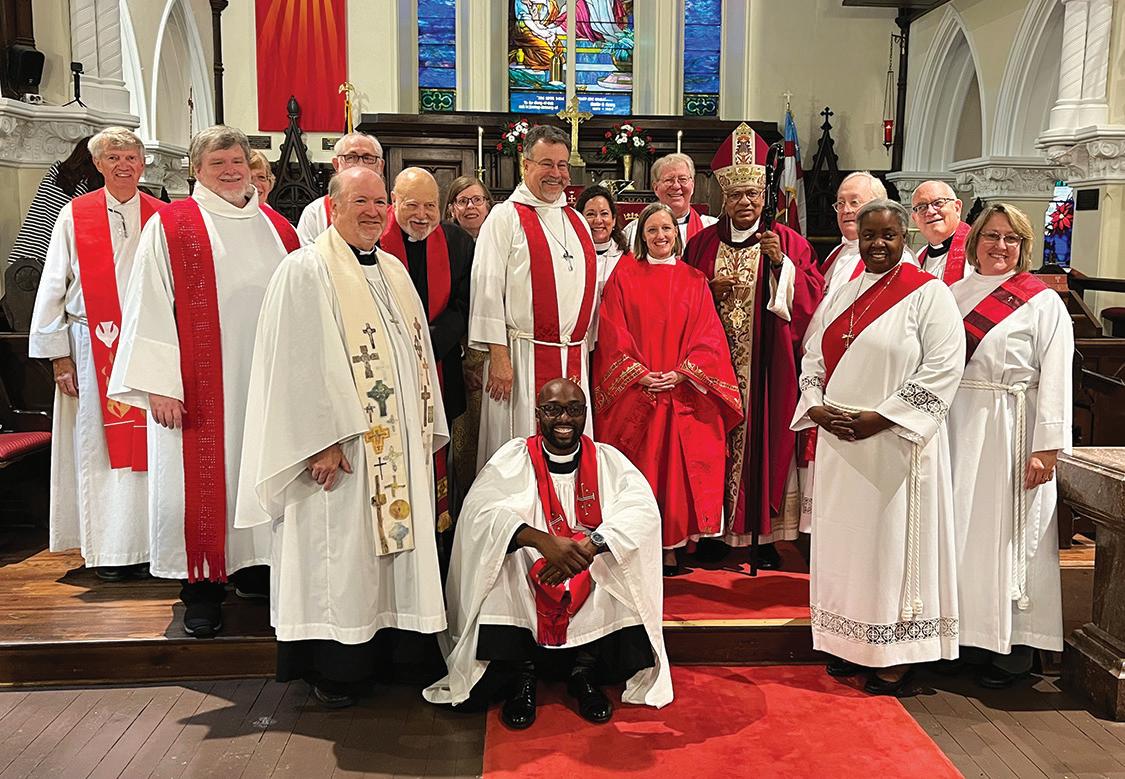
“When I was around six or seven, I remember trying to give ‘communion’ to my neighborhood friends,” Susie said. “People would ask me what I wanted to be when I grew
up, and I would say, ‘a mother,’ knowing that what I meant was different than being a mother of children. I knew it was different, but I didn’t understand how at the time.”
Susie grew up in DeWitt, New York, and graduated from Ursinus College. In 1996, she had been living in Jackson Hole, Wyoming, for two years when she had a feeling she couldn’t explain.
“I remember a moment where I



heard this voice that I did not recognize saying, ‘what are you doing here, you were made for something more than this,” Susie said. “I didn’t know then that it was a Holy Spirit moment.”
She went to the library, looked up internships and found an environmental internship at St. Christopher’s Camp and Conference Center in Charleston, South Carolina. It was an Episcopal center.
Susie grew up Catholic, and that was her introduction to the Episcopal Church. She started to see what the broader church was and who could hold leadership positions. While in Charleston, she became certified to teach and found joy in
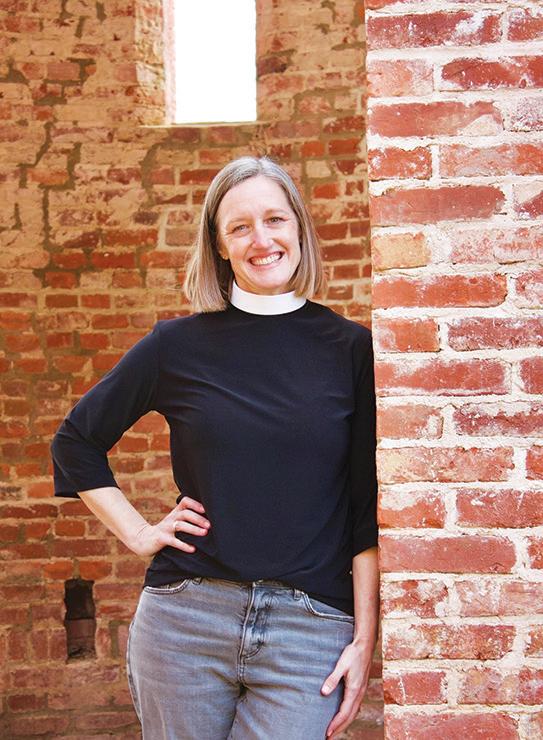
working with young children.
She also met her husband, AK, a marine biologist, in Charleston. In 2002, AK got a job at the Oxford Cooperative Laboratory and they moved to Easton.
She remembers the first time they attended Christ Church Easton. Fr. Bill Ortt asked if there were any visitors, and Susie stood up and introduced the two of them.
From there, the Leights began volunteering to help with Sunday school and vacation bible school. Susie was asked to be on the vestry of the church, and then took a position in 2008 to lead the Christ Church Day School.
“I was weaving my way through different ministries in the church, always inclined to be in and around the church,” she said. “I was attending multiple worship services each week, wondering why that was. Even when I began at the Day School, I remember walking up the brick walkway, which splits to go to the school or toward the church, and I could feel a pull to the church.”
After Susie’s mother died in 2014, she took time off to heal and to have some space to prayerfully consider what was next.
“When you lose someone who has shaped your identity, you might ask ‘who am I and what am I supposed to be doing?’” she said. “I thought about mortality and wanting to honor the time we have been

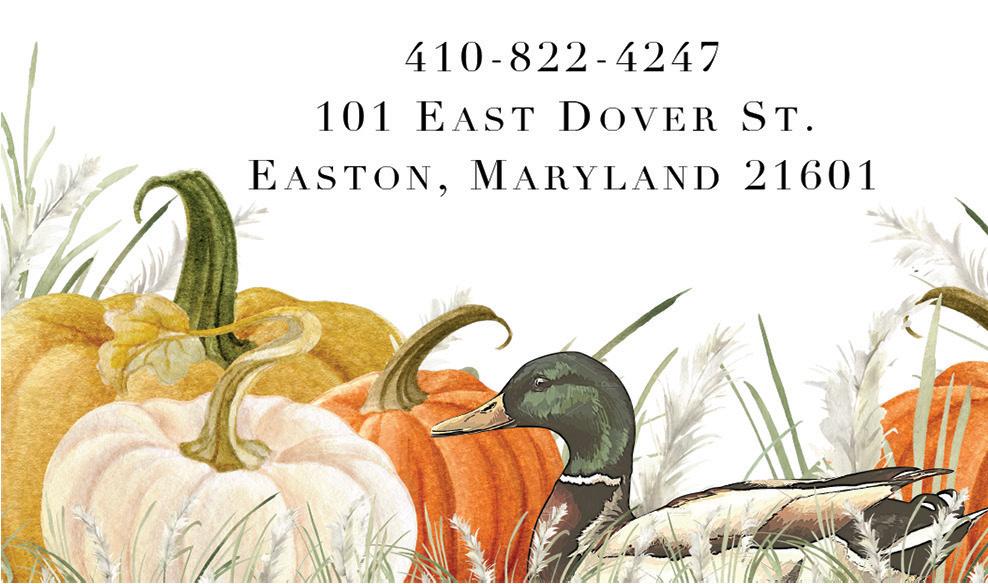
gifted. I felt called to share God’s love and grace with others, and I knew that I had to have a fuller understanding of those realities for myself before I could share them with others.”
During that time, Christ Church paired Susie with a Stephen Minister, a caregiver who has been trained to walk beside people going through difficult times.
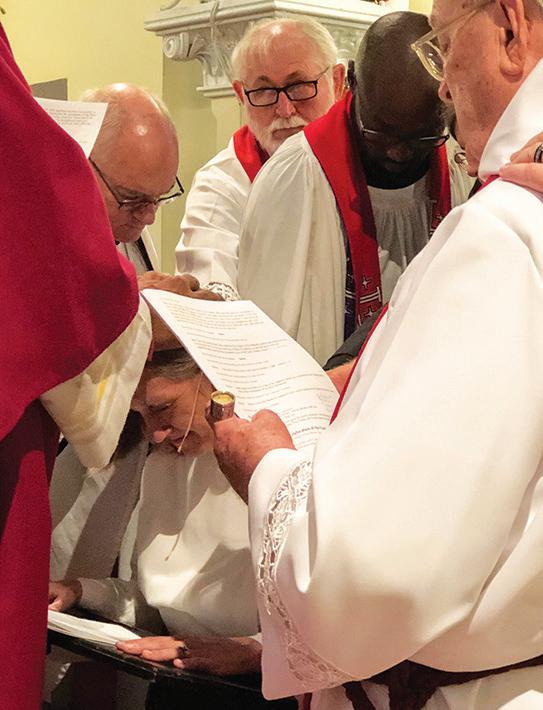
“I realized how beneficial and powerful it was to have someone walk alongside me during that time ~ they didn’t fix what I was going through or change it but allowed me to go through that space, and they listened to and prayed for me; they were a consistent presence.”
Susie was then trained as a Ste-



















phen Minister and became one of the leaders of the ministry, which was her first step, her gateway into pastoral ministry. She became an assistant for pastoral care at the church, and this was the next step toward fully realizing the call that was on her heart.
“Before my mom died, I sensed a call to the priesthood, but I knew that I had to do the inner work on myself before I could start that path,” she said.
She talked with Fr. Bill several times and went through a formal
discernment process in 2017 and 2018. Susie and the Rev. Barbara Coleman were supported in their callings to ordination by the Christ Church Easton Vestry at the same time.
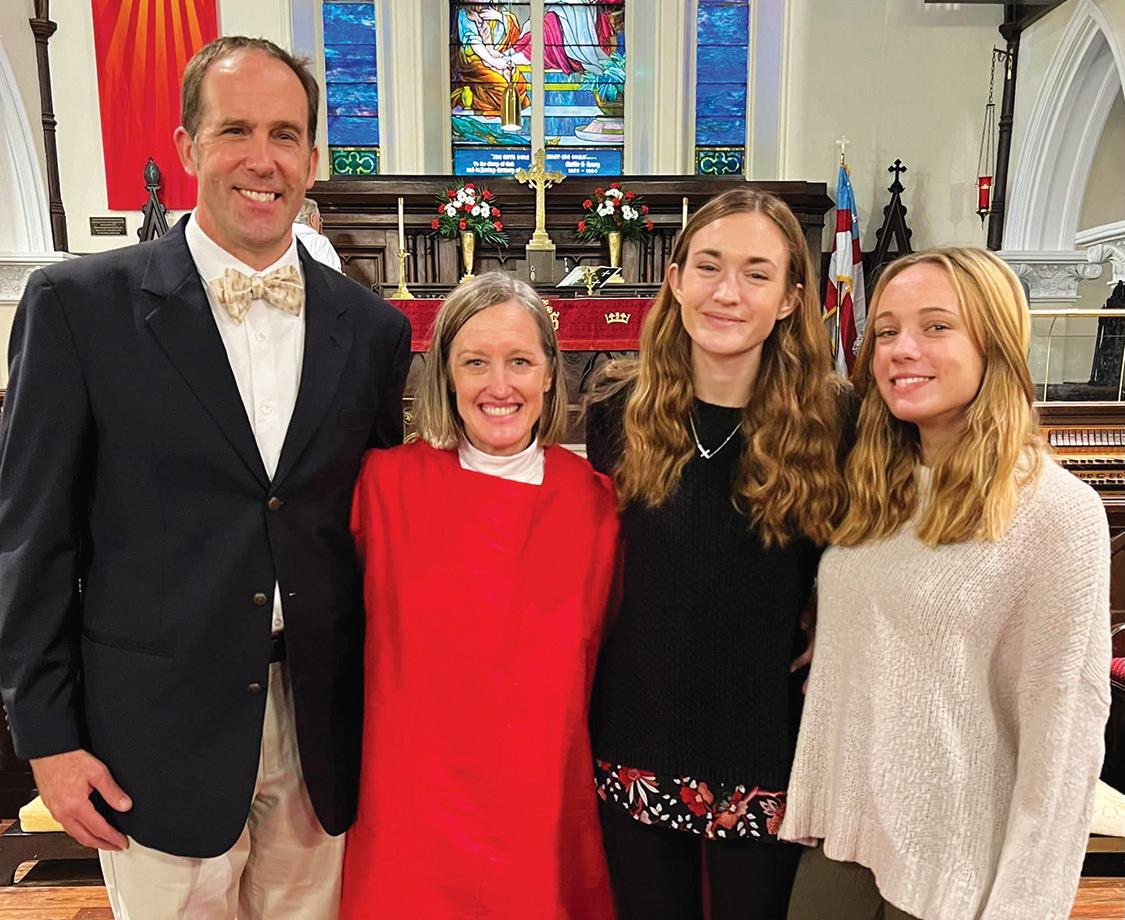
In spring of 2019, Virginia Theological Seminary, a residential seminary, announced a special scholarship program. Susie wasn’t planning on going away to school, but she also knew it would give her an experience she couldn’t get elsewhere. AK and their girls were supportive, and Susie would be home on weekends.
“I’ve learned that I have to be willing to step into things that I don’t
understand, that make me uncomfortable and make me want to run in the other direction. I think we all benefit from learning that,” she said. “I was listening to that same voice that I heard in Jackson Hole. I recognized this voice that was not my own, kind of guiding and nudging me; it was strong and clear, the same voice that led me to the Episcopal Church in South Carolina.”
And it wasn’t just about her.
“It’s not just me ~ the only reason I could go to do the work in seminary was because of my family. Their own identities were growing and shifting. They were empowered in their own way, and everyone embraced that.”
While Susie was at VTS, COV -
ID-19 hit and the lockdown in response to the pandemic and seminary became a different kind of combination of being both at home and at school. It brought Susie’s family further into the experience.
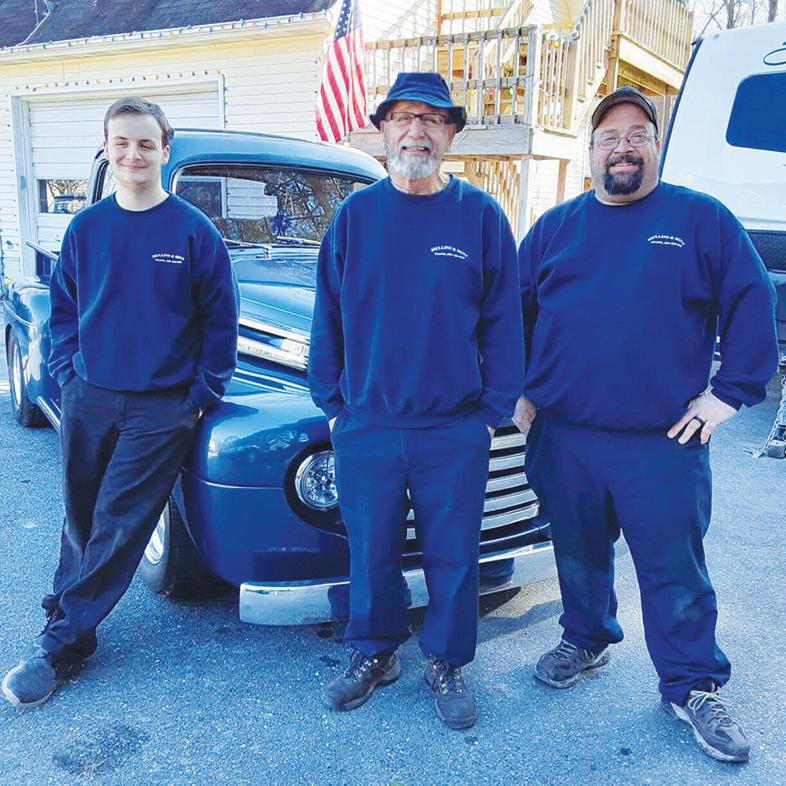

“Our girls saw me at the kitchen counter from morning to night doing this work,” she said. “To see anyone with a goal or passion and recognizing the hard work and struggle that goes into that ~ what was hard at the beginning never became easy. But we learned how to do it ~ to fully embrace the calling, not only in myself but also in my family.”
While finishing her studies at VTS, Susie was ordained a deacon in a ceremony at Christ Church
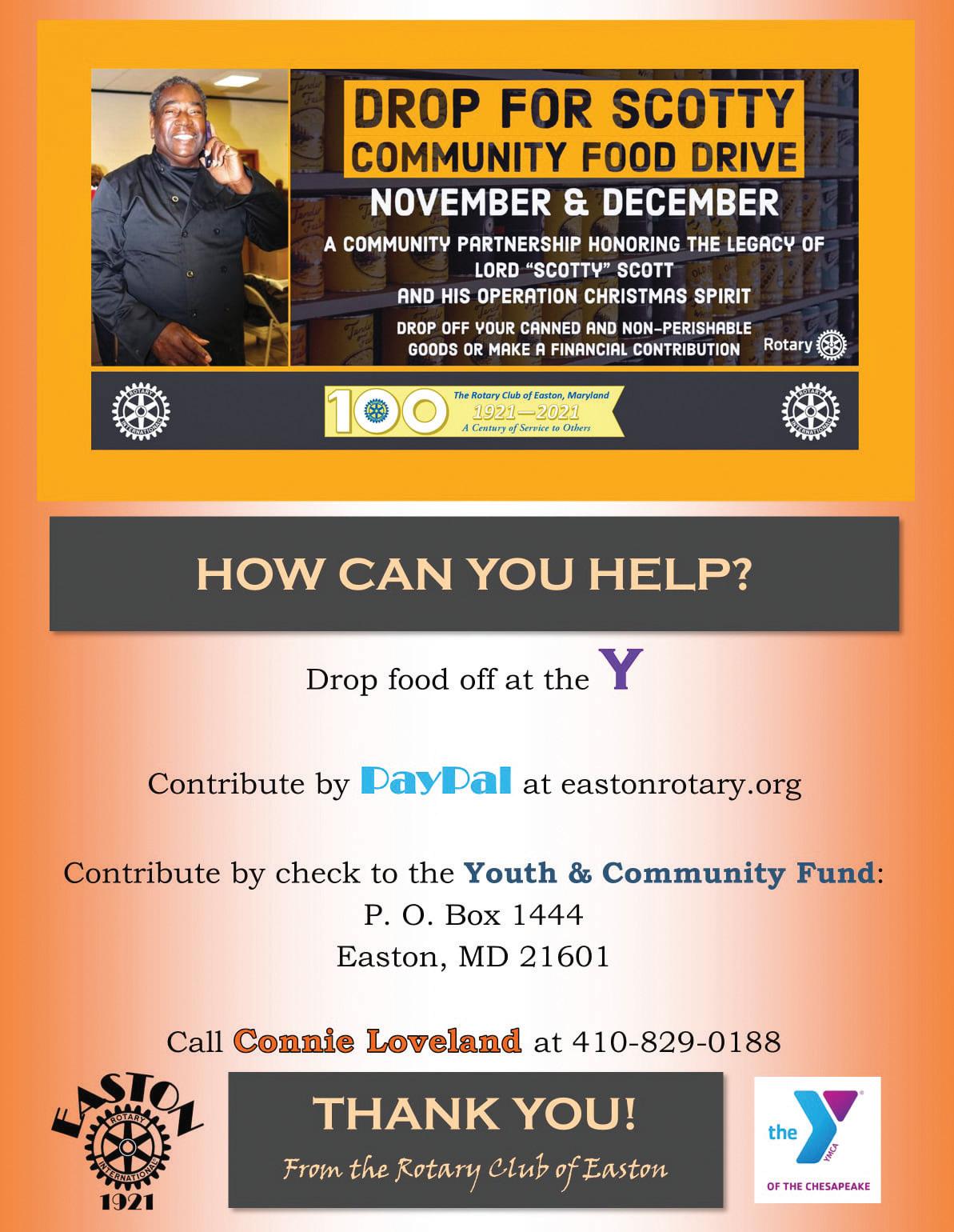


Easton in January 2022. It was a culmination of 20 years spent in the parish.
“Spending 20 years at Christ Church Easton, I consider it like my second childhood, a growing up of sorts. There were things that led me there, pointed me there and prepared me for the ministry that I’ve been called to.”


With Susie being a deacon, Bishop Santosh Marray assigned her to Christ Church Cambridge, working under the Rev. Bernie Schroeder with the congregation of Great Choptank Parish. Susie is set to succeed Fr. Bernie when he retires in 2023, making her the parish’s first female rector.
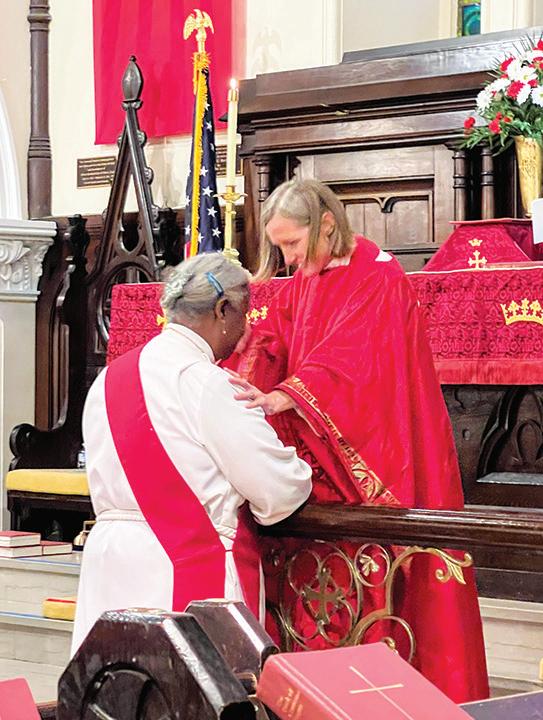
Her ordination to the priest-







Becoming a Beacon recognize transformation in a moment, in a split second, I wanted to hit the pause button.”
hood took place this fall in Cambridge. Clergy from throughout the Diocese of Easton and from VTS were on hand, as were family, friends and supporters from Cambridge and Easton and from seminary. There was a moment in the ceremony when all the clergy laid hands on Susie. And then she helped lead Communion.
“To have the moment of the laying on of hands, then giving Communion to certain people for the first time as a priest ~ giving Communion to mentors ~ having them receive from me what they have always shared ~ there is beauty in the mutuality of our relationships. To

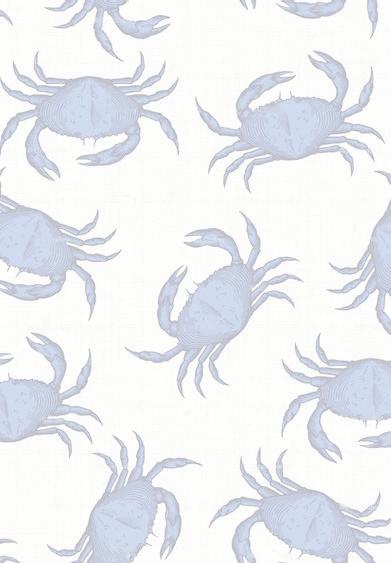
Rev. Susie is working this fall and winter as an assistant priest. She is preparing for her role as rector of the parish. And she is looking forward, with hope.
“My current posture is one of hope ~ and it is not a naïve, surfacelevel hope ~ and none of these words that I toss out are naïve, they aren’t without pain or struggle, but I can see glimmers of what is possible,” she said. “When I catch those glimmers of light and love, grace and hope, they direct me and reaffirm what I believe I am supposed to do in the world: to be a beacon.”
And, looking out in front of the church, Susie is reminded each day of a larger-than-life historical beacon.
“What I am thinking about right now is that statue of Harriet Tubman, and I am not at all putting myself on her level but thinking about her as a reminder of who we are each called to be, who I am supposed to be in the world. It is not a coincidence that she is across the street.”
Michael Valliant is the Assistant for Adult Education and Newcomers Ministry at Christ Church Easton. He has worked for non-profit organizations throughout Talbot County, including the Oxford Community Center, Chesapeake Bay Maritime Museum and Academy Art Museum.












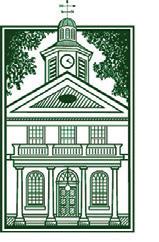
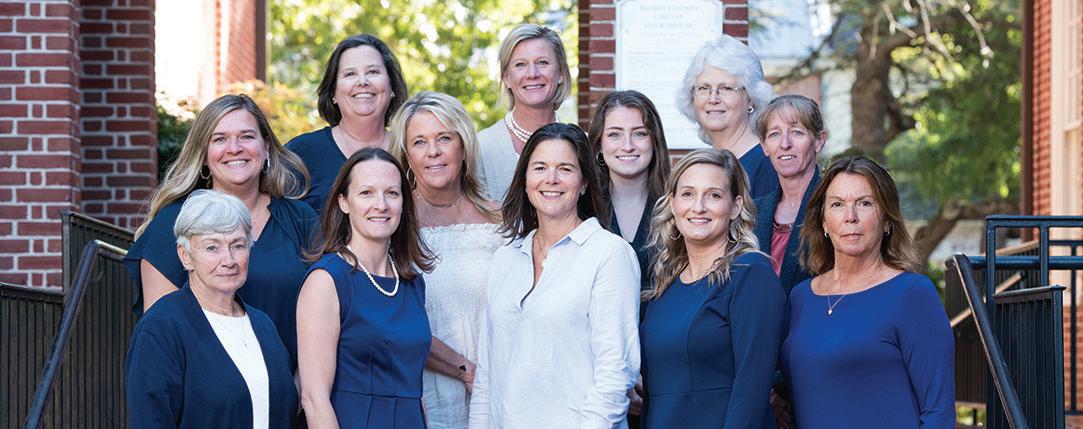





As I wrote in my article in the September 2022 issue of Tidewater Times , Patty Cannon ~ kidnapper and murderer of free Blacks and slaves ~ was certainly the Eastern Shore’s Queen of Crime in the early 1800s. As a final and ironic twist for such a murderer, her skull ended up on public display on Broadway in New York City.
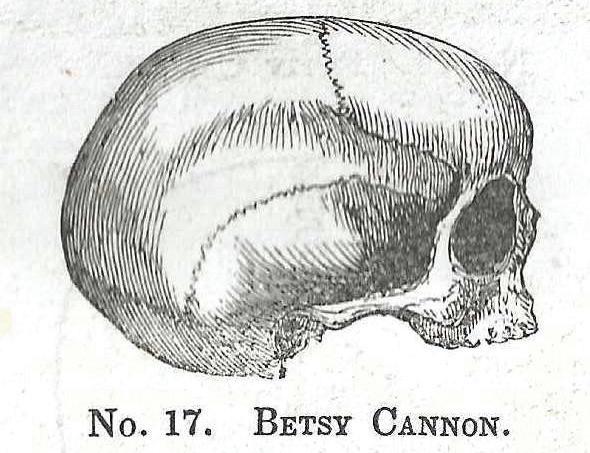
Phrenology was hot stuff in the mid-1800s, when America’s
foremost phrenologists, the brothers Lorenzo and Orson Fowler, operated their American Institute of Phrenology with hundreds of skulls on display and also published phrenological journals and almanacs. Though now discredited and bogus, in its heyday in the 18th and 19th centuries, phrenology purported the ability to determine someone’s character by examining the bumps and contours of their
skull, which was divided into 37 different compartments for attributes such as amativeness (lust), philoprogenitiveness, (producing offspring), concentrativeness (being able to concentrate), inhabitiveness (staying in the same residence), adhesiveness (mutual adhesiveness of cells, whatever that is) and so forth.
Patty Cannon source in other Patty Cannon publications, but apparently I was the first one to actually track down a copy and read it. Although the later part of it is mostly based on the notorious and somewhat inaccurate 1841 pamphlet “Narrative and Confessions of Lucretia P. Cannon,” the text of which has been reprinted by Roth and others, this phrenological part is not in any Patty Cannon book:
In later years, phrenology was used to support claims of the superiority of the White race, assuming that any race that had differently shaped skulls must be degenerate, but that is given no scientific credibility now.
One of the Fowlers’ prizes was the skull of Patty Cannon.
In The Monster’s Handsome Face, his definitive work on Cannon, Hal Roth wrote in the chapter “Patty Cannon’s Skull” that “Another study should be conducted to answer the question of whether Fowler included an evaluation of Patty Cannon’s skull in his writings. Phrenological journals from the period would seem to be the logical place to begin the search” (p. 216). I took Hal up on his challenge and found some amazing material. There are even three wood cuts of Patty Cannon’s and her sister Betsy’s skulls.
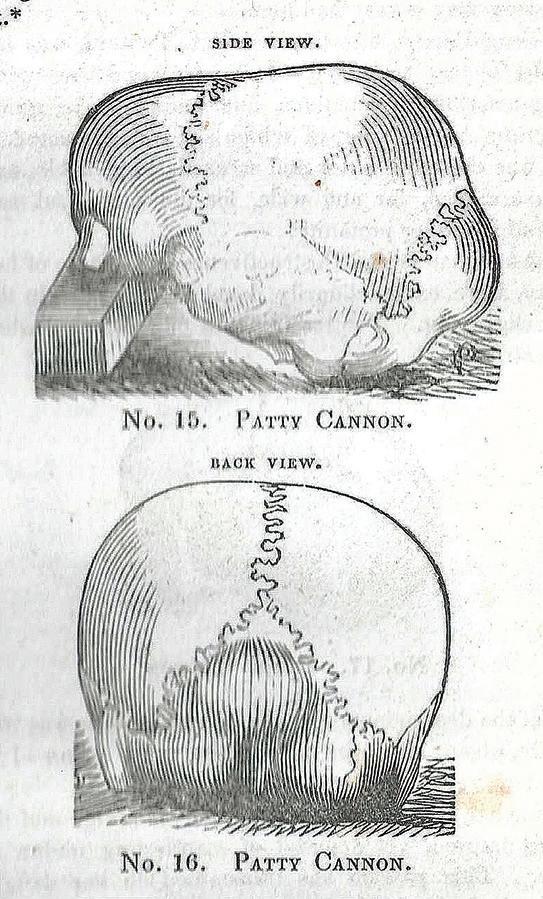
An article by Lorenzo Niles Fowler (1811–1896) that appeared in “The Phrenological Almanac” in 1841 had been referenced as a
“These [wood] cuts are taken from the skull of a notorious woman, by the name of Patty Cannon. Her head was large ~ its shape low and broad, and chiefly developed in


the occipital, basilar, and intellectual regions. Her moral sentiments, as may be seen by the cuts, were almost entirely deficient, and could have but little influence in restraining or regulating the propensities. The size and developments of the head are remarkable, and the character of the individual must have been especially marked and striking. According to phrenology we should infer the following characteristics ~ That she would be selfish, sensual, deceitful, and cruel to the lowest degree, shrew’d, artfully sagacious in laying plans, groveling and sensual in her pleasures, and totally incapable of appreciating high-toned moral
feeling, and being greatly wanting in true dignity, self-respect and refinement, she would be almost indifferent to the principles of justice as well as to human suffering; had a violent temper, great energy, tact, management and force of character; was courageous, bold, revengeful, licentious, cunning, and determined in the objects of her pursuits. The anterior lobe of her brain was very large, indicating a strong intellect; but the moral sentiments being so entirely deficient, her intellect would be chiefly employed in devising ways and means for gratifying selfish propensities. Causality and Comparison were uncommonly strong, giving originality, and with a large brain, enabling her to lay








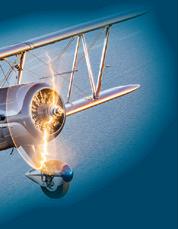







plans on a large scale, and successfully to adapt means to ends. With such phrenological conditions, she would exert an extensive influence over the lower order of minds, and could not be otherwise than distinguished for most of the above traits of character.
“The above is the substance of an examination given by L.N. Fowler of Patty Cannon’s skull at Georgetown, Del., in February 1840. He had no knowledge whatever of the character of the individual at the time, and to that remarkable exactness of the examination, many individuals who knew the life and character of Patty Cannon, leave their testimony…”
[“The Phrenological Almanac for 1841 Embellished with Fifty Engravings Illustrative of the Science of Phrenology”; by L.N. Fowler; N.Y.; pps. 37–39].
Some locals dug up Patty’s skull and took it to Fowler when he was lecturing there, not telling him whose skull it was, with the challenge that they would give it to him for his museum if he could discern the character of the person whose skull it was. Supposedly, his evaluation convinced them and they presented him with the skull. But there is no way of knowing how much the Fowlers’ later, more detailed phenological examination of Patty Cannon’s skull was influenced, consciously or subconsciously, by






their knowing whose skull it was. The following is from Orson Fowler’s book Hereditary Descent, published in 1848. Only brief excerpts have been published before, and it has never been reprinted in full, as far as I know, which is curious because it is loaded with biographical tidbits about Patty’s family and details about the gang’s kidnapping business not seen elsewhere: PATTY CANNON AND HER FATHER AND BROTHER by Orson Squire Fowler (1809–1887)

“This notorious woman shed huFowler’s American Institute of Phrenology in New York.
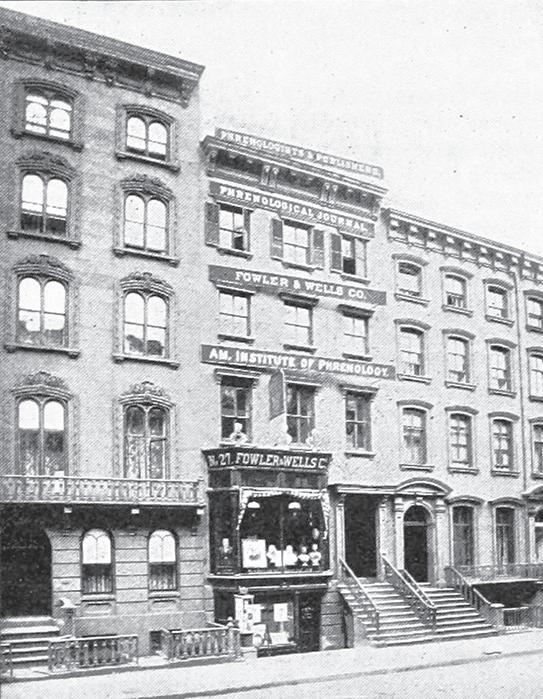




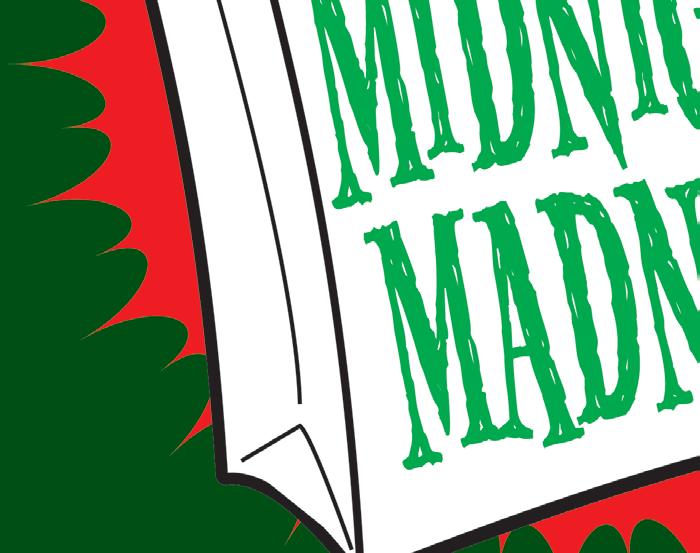







man blood as lavishly as if it had been water. She procured and held in subjection a desperate gang, whose sole business was to perpetrate the robberies and murders she planned, in which she generally took the lead, and frequently perpetrated murders single handed in order to rob. One of this gang was afterwards executed, and under the gallows disclosed her atrocity.
“Her excessive Amativeness was her coy-duck [i.e., decoy] with which to allure victims within her reach, and retain them till he could
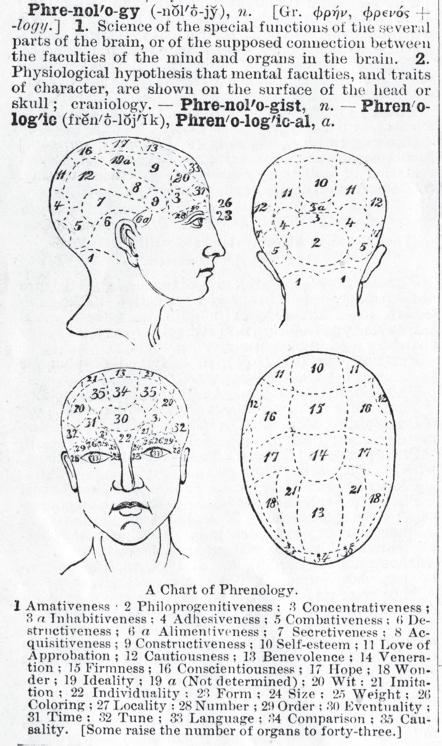
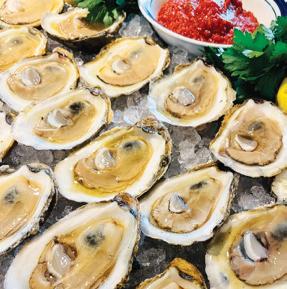


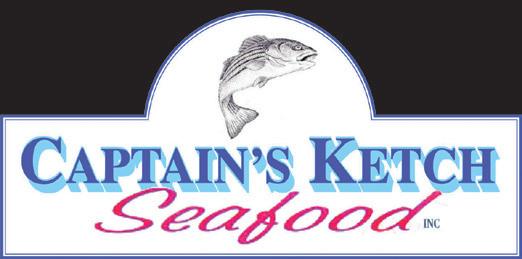


dispatch them. She fitted out a kidnapping vessel to Philadelphia, and with negro stool-pigeons who mingled with the colored people of the city, and under various pretences decoyed them on board, she kidnapped and transported first to her prison castle and thence into slavery hundreds of free negroes. Those who were decoyed on board, but were too old or infirm to bring much, were unceremoniously drowned. And infants, captured with their mothers, which by their crying endangered her safety, were mercilessly knocked in the head with a loaded whip made for this express purpose. Several infant
skeletons were disinterred in her garden after her capture. For years after her crimes were publicly known, this resolute woman and her desperate gang kept the officers of the law at bay, but was finally captured after a desperate resistance, and committed suicide in prison. A more atrocious robber and murderess probably never existed, at least in our country.
“Her Destructiveness, and also Acquisitiveness, as well as Amativeness, were enormous, as seen in the accompanying engravings of her skull, which can be seen in the author’s cabinet.*
“The father of this human fiend, becoming exasperated with a neighbor about some money matters,













Patty Cannon
went into a shop where this enemy worked, and picking up a suitable piece of timber, struck him on the head and killed him, for which he was executed.
“Her brother committed a crime which the laws then punished with death, and followed his father to the scaffold, being every way a very bad man.
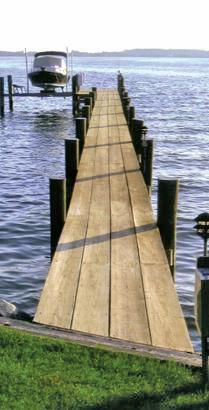
“Her sister Betsey, who married Bat. [Bartholomew] Twiford, was one of the most violent tempered, implacable, and revengeful of women, notoriously licentious, and known to be guilty of every crime but murder, of which she was suspected. Her tongue was the most
bitter and sarcastic imaginable, and she was unparalleled, far and wide, for the most foul-mouthed abuse and shocking profanity.
“Her Amativeness and Destructiveness, like those of her sister Patty, were extraordinarily developed, as seen in the following engraving. The resemblance of these skulls to each other is striking.
“One of the descendants of one of these women was tried in Delaware about 1840, for some aggravated crime ~ I think for murder.
“The mother of these depraved women was large and fleshy, and good-natured, yet accused of manifesting undue Amativeness. This passion she transmitted to her daughters, who inherited also
and murderous ferocity.”
*For a more particular account of this extraordinary woman, see the “Phrenological Almanac” for 1841, or “Journal” for 1840.

[O.S. Fowler, Hereditary Descent Its Laws and Facts Applied to Human Development ; Fowler and Wells; N.Y., 1848. pps. 154–156.]
Note: Patty Cannon’s modest dwelling was hardly a prison-castle!

The Fowlers also had Patty Cannon’s sister Betsy’s skull and the skull of Ebenezer Johnson Sr. This
Ebenezer was Joe Johnson’s father (Joe Johnson was Patty’s brotherin-law and her co-kidnapper). As to how Fowler got the skull, George Alfred Townsend, author of The



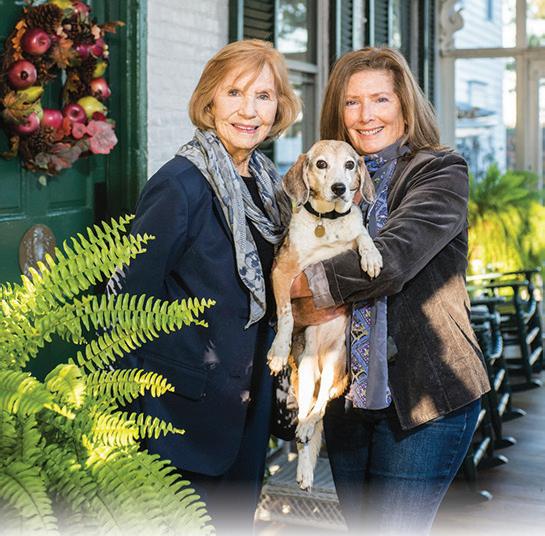

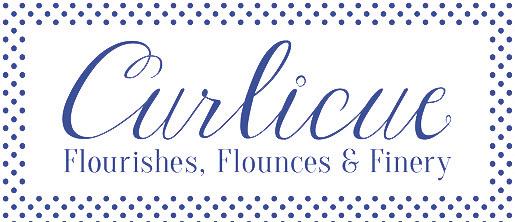
Entailed Hat and the first Patty Cannon biographer, stated, “Several years before the rebellion…the phrenologist Fowler, lecturing in that part of the country, having obtained the skull of Patty Cannon in Georgetown [Del.], wanted also the skull of old Johnson, her confrere and possible guardian, and he was not molested in disinterring it to take to his museum, where both skulls are now to be found. The two holes were found in Johnson’s skull and one of the bullets, the other having passed through and been found in the house” [Cincinnati Enquirer, Feb. 6, 1882].
There was apparently nothing the
Fowlers would not do, even grave robbing, in their pursuit of pseudoscience! Fowler seems to have confused Ebenezer Johnson Sr. with his son Joe Johnson, who was a kidnapper, but while Ebenezer Johnson Sr. was part of Patty Cannon’s gang, it was really his son Joseph who was more the mastermind. But since Joe Johnson was alive and well, having escaped to Texas, his skull was not available for display. Joe Johnson was never caught or prosecuted.
While Fowler was exhuming skulls, he also got Betsy’s skull for good measure, although Betsy was never charged with being part of the Cannon kidnapping ring.
It is interesting that while Fowler noticed that Patty’s and Betsy’s
Nestled on over 2.6 acres of lush, verdant greenspace, “River House” is a storied Coastal Colonial manor offering panoramic views of the Choptank River with 385’ water frontage on Maryland’s Eastern Shore, including dock w/boatlift. Inside, explore 4,096 square feet, as 4 bedrooms, 3.5 baths in the main house and 1 bedroom, 1 bath in the carriage house provide more than ample respite and accommodation. Offered at $1,485,000.

Melissa Tippett, Realtor® m +1 410 241 7409 mtippett@ttrsir.com

Easton Brokerage o +1 410 673 3344

skulls were strikingly similar, he did not explain why Patty led a life of crime, while Betsy, who was probably not a nice person, was never convicted of any crime.
Ebenezer Sr., on the other hand, had several judgments against him for theft and was shot by a posse at Betsy’s house near Twiford’s Landing on the Nanticoke River about 1814–1817.


So, where were they buried? Patty Cannon was thought to have been buried in a small graveyard for criminals in the Georgetown, Del., jail yard, but Betsy and Ebenezer may have been buried in the Twiford family graveyard near Sharptown, Del., since Betsy had married Bartholomew Twiford and was part of that family. But that’s just a guess, It has long been assumed that the Patty Cannon skull recently in the possession of the Dover Public Library in Delaware was the same Patty Cannon skull that the Fowlers had. But, based on eyewitness descriptions of the skulls that I also recently discovered, the Dover Patty Cannon skull is not the Fowler Patty Cannon skull.
But more about that skullduggery in a future article.












The history of Queen Anne’s County dates back to the earliest Colonial settlements in Maryland. Small hamlets began appearing in the northern portion of the county in the 1600s. Early communities grew up around transportation routes, the rivers and streams, and then roads and eventually railroads. Small towns were centers of economic and social activity and evolved over the years from thriving centers of tobacco trade to communities boosted by the railroad boom.
Queenstown was the original county seat when Queen Anne’s County was created in 1706, but that designation was passed on to Centreville in 1782. It’s location was important during the 18th century, because it is near a creek that, during that time, could be navigated by tradesmen. A hub for shipping and receiving, Queenstown was attacked by English troops during the War of 1812.
Construction of the Federal-style courthouse in Centreville began in 1791 and is the oldest courthouse in continuous use in the state of Maryland. Today, Centreville is the largest town in Queen Anne’s County. With its relaxed lifestyle and tree-lined streets, it is a classic example of small town America.
The Stevensville Historic District, also known as Historic Stevensville, is a national historic district in downtown Stevensville, Queen Anne’s County. It contains roughly 100 historic structures, and is listed on the National Register of Historic Places. It is located primarily along East Main Street, a portion of Love Point Road, and a former section of Cockey Lane.
The Chesapeake Heritage and Visitor Center in Chester at Kent Narrows provides and overview of the Chesapeake region’s heritage, resources and culture. The Chesapeake Heritage and Visitor Center serves as Queen Anne’s County’s official welcome center.
Queen Anne’s County is also home to the Chesapeake Bay Environmental Center (formerly Horsehead Wetland Center), located in Grasonville. The CBEC is a 500-acre preserve just 15 minutes from the Chesapeake Bay Bridge. Over 200 species of birds have been recorded in the area.

Embraced by miles of scenic Chesapeake Bay waterways and graced with acres of pastoral rural landscape, Queen Anne’s County offers a relaxing environment for visitors and locals alike.
For more information about Queen Anne’s County, visit www.qac.org .

Kent County is a treasury of early American history. Its principal towns and back roads abound with beautiful old homes and historic landmarks.
The area was first explored by Captain John Smith in 1608. Kent County was founded in 1642 and named for the shire in England that was the home of many of Kent’s earliest colonists. When the first legislature assembled in 1649, Kent County was one of two counties in the colony, thus making it the oldest on the Eastern Shore. It extended from Kent Island to the present boundary.
The first settlement, New Yarmouth, thrived for a time and, until the founding of Chestertown, was the area’s economic, social and religious center.
Chestertown, the county seat, was founded in 1706 and served as a port of entry during colonial times. A town rich in history, its attractions include a blend of past and present. Its brick sidewalks and attractive antiques stores, restaurants and inns beckon all to wander through the historic district and enjoy homes and places with architecture ranging from the Georgian mansions of wealthy colonial merchants to the elaborate style of the Victorian era.
Second largest district of restored 18th-century homes in Maryland, Chestertown is also home to Washington College, the nation’s tenth oldest liberal arts college, founded in 1782. Washington College was also the only college that was given permission by George Washington for the use of his name, as well as given a personal donation of money.
The beauty of the Eastern Shore and its waterways, the opportunity for boating and recreation, the tranquility of a rural setting and the ambiance of living history offer both visitors and residents a variety of pleasing experiences. A wealth of events and local entertainment make a visit to Chestertown special at any time of the year.
For more information about events and attractions in Kent County, contact the Kent County Visitor Center at 410-778-0416, visit www. kentcounty.com or e-mail tourism@kentcounty.com . For information about the Historical Society of Kent County, call 410-778-3499 or visit www.kentcountyhistory.org/geddes.php . For information specific to Chestertown visit www.chestertown.com .



The sound of hundreds of peepers, tree frogs and beetles was a symphony gone mad in the dark Mustique night. The noise was penetrating, amazingly loud. It made thinking difficult, and at the moment Isha needed to think. She and Jodi were sitting in their mule that was poked into the underbrush at an uncomfortable angle. The steering had failed suddenly, and they had gone into the rough before Isha could hit the brakes. Neither of them was hurt. Isha had turned the thing off, and the two of them were suddenly bombarded by the racket now coming from all sides that had been drowned out by the mule’s engine. It was around midnight.
They were both feeling frazzled, having begun the night at a cocktail party and ended up back at Roscoe’s in the village. Now their comforting control of the night from the security of their trusty mule was gone. In a remote part of the small island, they were being serenaded by the voice of the humid Caribbean darkness that was
very alive, and felt slightly menacing.
“Now what?” Jodi said. “I can tell you it’s a long walk, mostly uphill. I don’t have the radio. Forgot it. Mark will be pissed. Screw Mark.” She opened her bag, pulled out a joint and lit it. Isha said nothing and declined when Jodi offered it.
It struck Isha what a metro girl she was, how unprepared she was for real life in an untamed landscape unless it included a house with plumbing, a coffee maker and doors that locked. She had to laugh at the notion of walking more than a hundred yards on the rock-strewn, potholed dirt road in the frail designer flats on her feet. And there was Jodi, sucking on another joint. Ahh, to be 18 and zonked beyond caring a whit. “We wait,” Isha said, “unless you have a better idea.”
“Waiting sounds good. Don’t you love those frogs? They’re the highpitched screamers. Listen...I love it!
I chased one. It woke me up. I was pissed. Jumped out of bed stark naked and went looking for the little bugger. Found him. He was naked, too. Almost white in my flashlight.
Slick with goo. You know how big he was? Like this.” Jodi held up her hand with about an inch between her thumb and forefinger. “A little alien creature. All that racket from something this big. I didn’t kill him. Couldn’t. Just chased him away.”
Fifteen minutes passed. A half hour. Jodi had nodded off. Isha was wide awake, eyes closed, with the symphony of night critters playing games in her head. She could hear everything from car crashes and fingernails on blackboards to bits of long-forgotten melodies, infants crying and the staccato signature of a mule motor. That one got louder. She opened her eyes and saw the headlights coming around the curve. She flicked on the mule’s lights.
“Being there.”
“You’re a worker bee, right? Creighton’s worker bee, I would guess. Not a bad gig, as gigs go.”
“Thanks, Sonny,” Isha said as she made to leave the mule.
“Hey, we’re just getting to know each other.” Sonny’s hand was light on Isha’s shoulder, his fingers moving, enjoying the velvety smoothness of her skin. “You’re new. This is my island. Ask me anything, go ahead. This is an island full of dark secrets because it’s full of the filthy rich. And here’s a secret: you don’t get to be filthy rich unless you have a dark secret. Everyone here has one. Whaddya wanna know? Ask me. Maybe I’ll tell you…if I know.” Sonny chuckled.
This is an island full of dark secrets because it’s full of the filthy rich.
The vehicle stopped beside them. “Whassup?” Isha recognized Sonny. She shrugged. “Broken.”
Jodi stirred. “It’s Sonny. Hi, Sonny.”
“Hop in.”
When they arrived at Goliath House, Sonny cut the engine. Jodi stumbled out and headed for the guest house with a wave. “’Night all. Thanks, Sonny, for saving us.”
“Good you came along,” Isha said to Sonny.
“That’s my job, coming along. What’s yours?”
Isha looked at Sonny, so brash, so confident, such a Brooklyn bullshitter. Such a great act. She decided to play.
“All right,” she said, her eyes on his. “The other night I overheard you talking with Jocko about smuggling, something about a package on a race boat.”
“Yeah, that was something, no? On a race boat! You heard that? The walls have ears. Can’t be too careful. Who are you, anyway?”
“Have you learned any more about that?”
“You’re interested in smuggling?” “Why not?”
“You a cop? Just kidding. That’s
“This novel ~ set in the round the world race ~ has some very bad characters out to ruin a young man struggling to find his identity, an unexpected love interest, and some intense blue water sailing."
The book was originally serialized in Tidewater Times. Available on Amazon, print or eBook.

cool. Arrest me. Please. Ha. You want a few details.”
“I would.”
“I’ll put it on the list. Now who are you?”
“Jodi’s companion.”
“I get a feeling you know RD, Mark’s new skipper.”
“We’ve met.”
“Those,” Sonny said, looking at Isha’s chest, “are very impressive, I have to say. Must have cost a fortune.”
“They did,” Isha said, pulling back her shoulders for full effect and turning toward Sonny. “The lilies got gilded.”
“But you didn’t pay.”
“That’s my secret.” Isha leaned over and gave Sonny a sisterly kiss on the cheek before she got out of the mule. His hand briefly engaged one her breasts in a way that could have been considered accidental. It wasn’t. “Thanks for the lift,” she said. Sonny started the mule. His laugh and the motor noise became diminuendo in the critters’ symphony as Sonny rolled down the driveway. *
joying some deviled eggs Tomas had brought them. “It’s none of my business, but . . .”
“That’s true, it’s none of your business, but the answer is yes.”
“Oh, my God…” Jodi was smiling.
“It’s just therapy. Physical therapy.”
Jodi stared at Isha, then started laughing, losing some deviled egg into her hand. Isha laughed with her.
“I’d say that’s on the extracurricular side,” Jodi said, licking the egg off her hand, still laughing. “I hope there will be some, uh, additional…”
“Oh, yes. And very generous additional, I must say.”
Isha leaned over and gave Sonny a sisterly kiss on the cheek before she got out of the mule.
“Worth, I am sure, every penny.”
“Worth every penny.” Both women had a good laugh.
Jodi lay back on the chaise, closed her eyes and put on her sunglasses. Isha bit into another deviled egg.
“My father practiced physical therapy on me,” Jodi said.
Isha listened.
“Goodnight tuck-ins started getting a little too friendly. It progressed from there. When I was 12 he started coming in wearing just his bath robe.”
“I can relate.”
“Really?”
“I have to ask,” Jodi said, “didn’t I see you coming out of Mark’s workout room earlier this afternoon?” Jodi and Isha were at the pool, en-
“Pretty much the same, only mine was drunk. More like an attack.”
“Not Daddy. Stone-cold sober.

But an attack, still. A chip off Mark’s block.”
Jodi was quiet.
“What’d you do?” Isha asked.
“Nothing for a while. Too scared. He kept giving me money. Lots. And stuff. I liked that. When I was 14, I realized I was a prostitute. So I began studying airplane mechanics. For his airplane. He had a large manual I found. Figured out how to make shit happen.”
“It was you?”
“Yep.”
“But your mother…?”
“A mistake. She was not supposed to be on the flight. But she knew. How could she not? She had to. Creeps. Both of them.”
They were quiet, lost for a moment in their own vengeance.
“Revenge is sweet,” Jodi said.
“Yes, it is.” Isha paused. “I have a project going right now, in fact.”
“Really?”
“I could use some help. Interested?”
“Revenge? Are you kidding? Count me in.”
*
A wave of nausea wafted over her like a winter chill.
Dinner was boiled lobsters flown in live from Maine. Mark had sent his pilots, who had remained in Barbados with the aircraft, to get them that morning. Isha couldn’t stand the idea of eating the large, bug-like creatures. Tomas had the cook fix her a piece of chicken. Mark was visibly disappointed.
Isha stared up at the Frigate birds floating serenely on the invisible ocean of air. At least they looked serene. Who could tell. She could smell her father’s foul liquor breath, feel his hands groping her. A wave of nausea wafted over her like a winter chill.
“What did you do?” Jodi asked.
“I left one night. I was 16. Took a backpack.”
“Never went back?”
“This Christmas. First time. He came at me. I hit him with a tenpound dumbbell.”
“Whoa! Kill him?”
“Didn’t stick around to find out.”
*
Andy was counting. With a sound that raised the goosebumps on one’s neck and that could create anxiety even for the innocent, the fourth heavy metal gate slammed and locked behind them as Andy and his attorney made their way into the bowels of INR Las Rosas prison in Punta del Este, Uruguay. The rank odor of the place was powerful, a mixture of bad institutional food and bodies, lots of bodies penned up in windowless five-by-eight enclosures. The innocent! Andy would


have laughed if it had been appropriate, but a laugh in this place where the guards all wore permanent hostile faces would have probably been considered a criminal act. And those guards held the keys to his departure. If the little can in the keel of All American were found here in Punta, could he end up in Las Rosas? More goosebumps.
The sound of drilling. A repair was going on. Andy stared at the men working, drilling into metal. It took him back on the boat, seeing Martin sweating like a pig under the sound-suppressing blanket, drilling for what seemed an eternity into the boat’s keel, the sound echoing into the harbor and being carried for miles by the water to anyone who happened to be listening; and Grady biting into another shrimp with that confounding, blank-faced confidence of his, talk about innocence, washing it down with another shot of Don Julio, asking quietly for Andy’s assurance…. His father for crissakes, his father, found after damn near 30 years, such a cool dude, so respected by everyone, his father asking for his assurance. What was he supposed to say? No? Sorry, Dad, your son can’t handle it. Maybe. Probably. And Becky’s “How could you?!” How could he. How could he not?
“Mr.
Andy pulled himself out of it. The attorney he had hired as a translator was trying to get his attention. They had arrived. No more metal gates. “Visitantes” was imprinted on a door one of the guards was holding open for them. They walked into a sizable room with bars on the windows and were seated at one of the metal tables that had been screwed into the floor along with the chairs. They waited. An armed guard waited with them.
Knife Man was almost impossible to recognize without his braid
Knife Man was almost impossible to recognize without his braid, with his scruffy but sanitary prison haircut. A guard brought him in and seated him at the table across from Andy and the attorney. He was larger than Andy remembered. But it was him. The eyes had it.
Andy had gotten to look straight into those eyes after the man had first knocked him to the ground, when abject fear had not yet been replaced by the violent surge of anger he hadn’t known he had in him. Perez was his name. Antonio Perez. He had been cooperative, providing evidence that would have locked Mitchell Thomas away for a long time even without the murder conviction for Andy’s mother’s death; evidence that would have nailed Isha as well if she hadn’t slipped away. For that, Perez had been given a light sentence (for Uruguay) of five
years. Attempted murder had been reduced to assault with a deadly weapon. Sam had made it all happen with the attorney Andy had contacted.
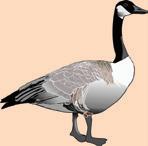


The attorney, Jaime Mejia, knew Perez. He asked him, in Spanish, how he was doing. Perez shrugged. Then he looked at Andy and shook his head. He spoke in Spanish to
Mejia, ending his comment with a little chuckle.
“He says he still can’t understand how he got beat by a punk like you,” Mejia said to Andy.
Andy laughed. “I only have one question. I need to know if the woman who made the deal with him, the woman who paid him, wanted him to kill me.”
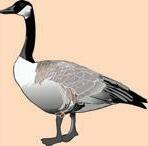
Mejia translated. Perez looked daggers at Andy.
“The wooman,” Perez said in English. He laughed and held his hands, cupped, palms facing in, in front of his chest. “The wooman, ha ha. Oh, yes. Kill. Yes, she say kill,” and he went on, talking a blue streak in Spanish and laughing some more, while dragging his index fi nger across his throat.
Driving back to the hotel, Andy asked Mejia what Perez’s long diatribe in Spanish had been about. “It was very colorful,” Mejia said. “But the gist of it was how you must have been lousy in bed.”
Both Sargent and Joe Dugan had thought that was extremely funny. Andy was fi lling them in over a few pints since they were the ones who had happened along and had probably stopped him from killing Perez the night he’d attacked Andy.
laugh.
“Yeah, and who do you think paid for those things?”
“I do remember that night when we got back to your hotel room and I bandaged your arm,” Dugan said, “and she came in, saw us there, got pissed, and then—and then she saw you. I’ll never forget the look on her face. Whopping surprise, for sure. But immense relief, or immense regret? Who could tell? Maybe both.”
“Now we know,” Andy said.
“You can’t be sure,” Sargent said. “You gonna believe a killer for hire serving five years who is still embarrassed he got beat by a gringo? A guy who wants to make it hot for you?”
“The wooman, ha ha. Oh, yes. Kill. Yes, she say kill.”
Sargent ordered three more pints.
“Why’d you go to all that trouble, getting an attorney, do all that paperwork to see Perez?” Dugan wondered. “Why bother? You know what a weird piece of work Isha was…is.”
“A woman scorned!” Sargent said.
“Such bullshit,” Andy said. “In those days, I was a fool, drunk a lot of the time, stoned, and she portioned it out like it was World Series tickets with a locker room pass.”
“Look, but don’t touch,” Dugan said.
“Touch, but not much,” Sargent said, and the two men had a good
Andy studied his beer. “Unfi nished business, I guess. She’s out there. I know her. I know I haven’t seen the last of her. I needed to know if she just rides shotgun, or if she could pull the trigger.”
Chapters 1-12 can be found at www.tidewatertimes.com
OXFORD - Sited on a beautiful 1.77 acre lot on the Choptank River, this home features a large great room, spacious eat-in-kitchen, 4 bedrooms, 3 baths, den, office, rec room and carport. Sunset views, private pier, sandy beach and rip-rapped shoreline. New septic 2019 and HVAC replaced 2020. Close to historic town of Oxford, marinas and restaurants. Minutes from downtown Easton and shopping. $1,350,000





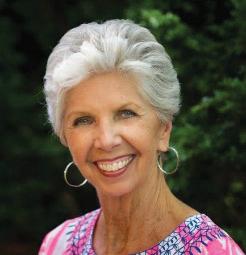

Chesapeake by Del Webb - This beautiful 2 story Wittman model features 3 bedrooms, 3 full baths, 1st floor primary suite, 1st and 2nd floor guest rooms, great room with gas fireplace, tiled sunroom and kitchen, wood flooring, gourmet kitchen with gas cooktop, double wall oven and all stainless appliances, 2nd floor loft and 1st floor office. Exterior offers new roof, paver patio, pergola, irrigation system and fenced backyard. Many amenities in this 55+ age restricted community. Close to downtown Easton. $485,000

Rare Offering - Easton model end unit condo with fabulous waterfront balcony overlooking the Choptank River and 18th fairway. Located in the Residences at River Marsh adjacent to the Hyatt Chesapeake Bay resort in Cambridge. 2 bedroom 2 bath condo with en-suite primary bedroom offering water views & great light! Open floor plan, large entry foyer, spacious kitchen with Corian counters, lots of cabinets, table space, bar and living/dining combo. Separate laundry and assigned parking. This unit also had a deeded-conditioned storage unit. $459,000


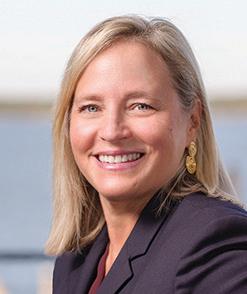
Prime building and location in the heart of St. Michaels! High traffic area with good visibility. Property consists of 4,700+/- sf 2-story building with fenced courtyard and private off street parking. Zoned commercial, most recent use is restaurant with seating on first and second floor, bar and patio. New roof and siding in 2022. Possible owner financing and other opportunities. Many potential uses. $1,385,000


